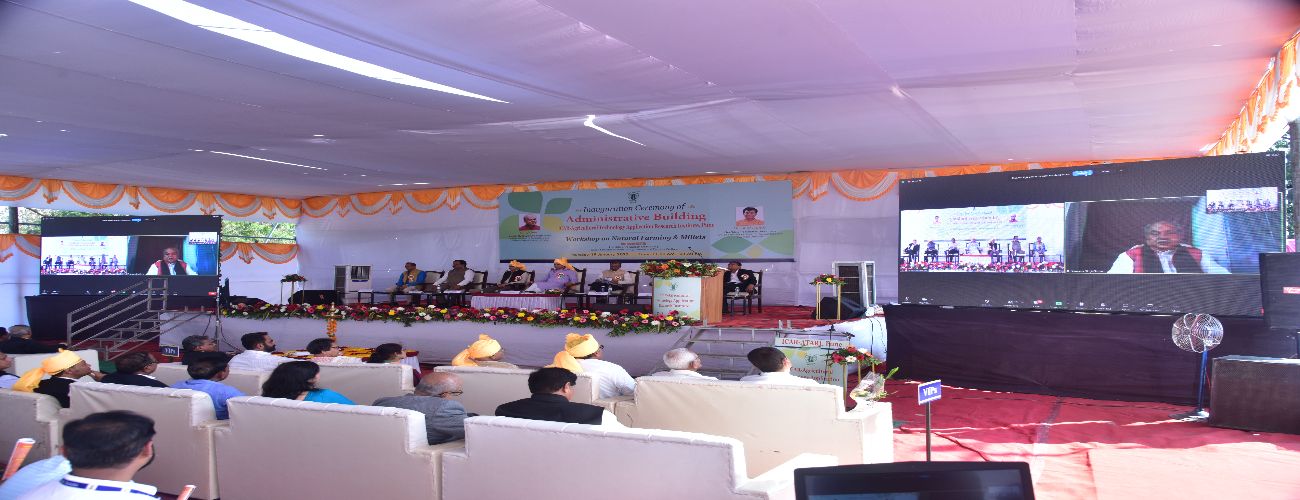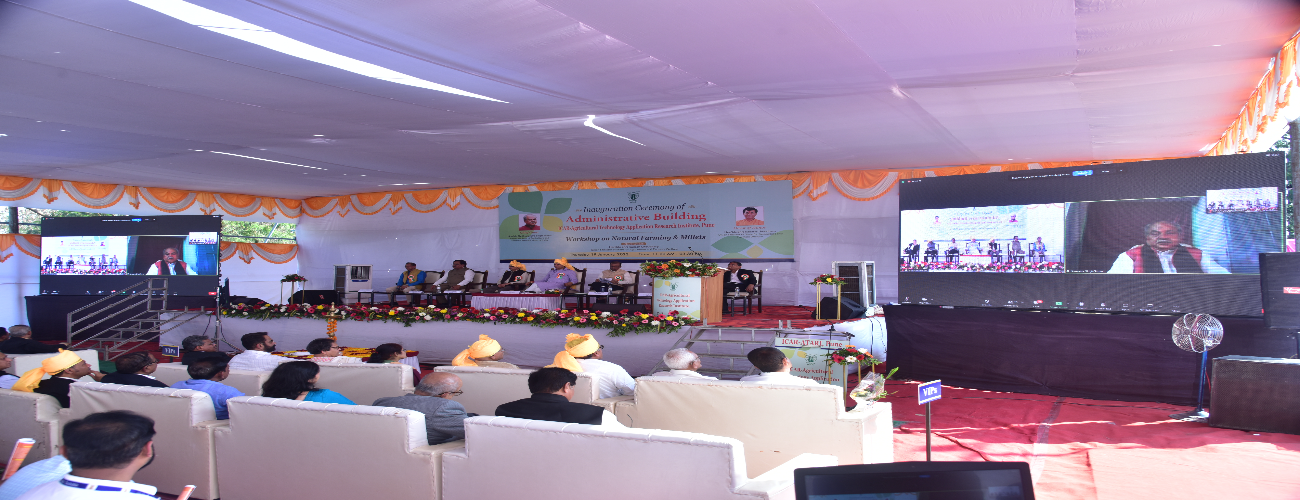|
|
New/ Upcoming
Events: | |
|
6 th Annual Zonal Workshop of ICAR-ATARI, Pune.
| |
The ICAR- Agricultural Technology Application Research Institute, Zone-8, Pune,
Maharashtra has organized its “6 th Annual Zonal Workshop” at KVK Aurangabad-I from 28 th to 30 th July, 2023.
Inaugurating the Workshop of the Chief Guest, Dr. U. S. Gautam, Deputy Director General(Agricultural Extension), ICAR urged the Krishi Vigyan Kendras for focusing on Integrated
Farming System, filling of vacant positions in KVK, timely submission of AUCs and UCs.He added that the new mandate of KVK is a single window Technology Extension System
and KVKs have to create influence on policymakers. DDG also advised to develop Success Stories on NICRA, FFP, ARYA, TSP and SCSP projects. Dr. Gautam stated that the KVKs
should contribute and make a presence in the system by providing a database.
Dr. R. Roy Burman, ADG (Agricultural Extension), ICAR urged the need to carry out Extension beyond production activities. He stated that all 731 KVK will be provided Drones
and Kisan Sarthi 2.0 will be launched with mobile Apps. He pointed that Natural Farming is one of the priority of government and KVKs need to generate a database to generate inputs
for policy makers.
Dr. S. R. Gadakh, Vice-Chancellor, PDKV, Akola highlighted Integrated Farming System approach for sustainable agriculture. He suggested every KVK SMS should develop
discipline-wise commercial demonstration models in the KVK campus and technologies must be demonstrated season-wise at KVK. He asked KVKs to make small video clips and use
recent technologies like AI, Drones and Robotics.
Dr. Z. P. Patel, Vice-Chancellor, NAU, Navsari stated that ARYA project is motivating women and rural youth in agriculture as agri Entrepreneurship is providing employment to
them. He further added that Social Scientists have played an important role in the Green and White Revolution. Farmers and rural women must be motivated by KVKs as huge income
can be generated by exporting Post Harvest Products. SMS and KVK scientists also require motivation and backstopping must be provided by SAUs and ICAR Institutes, he suggested.
Dr. Indra Mani, VC, VNMKV, Parbhani appreciated the KVKs’ role in Extension activities.He emphasized the need of carrying out activities like MGMG and One Day with my farmer.
He suggested to provide platform to women farmers to attract them to agriculture related activities. He added that use of ICT is a must for the dissemination of technologies and KVK
should be strengthened and made attractive. He informed that all KVKs must go for CSR registration. Skilling must be converted to entrepreneurship. He advised KVK scientists must
be involved with the nearest institutes engaged in research, education and extension.
Dr. S. K. Roy, Director, ICAR-ATARI, Pune, Maharashtra in his welcome address underlined the salient achievements in the Zone – VIII during the preceding year. He enlisted
various achievements of KVKs and work done under various projects like Natural farming, Agri-Drone project, cluster frontline demonstrations on oilseeds and pulses. He also informed
about support provided by ATARI for various infrastructure development of KVKs.
Dr. D. B. Deosarkar, DEE, VNMKV, Parbhani provided vote of thanks. The workshop saw participation of two former DDG (Agril Extension) Dr. P. Das, and Dr K. D. Kokate, Dr. V.
V. Sadamate, Former Advisor, Planning Commission and other dignitaries. Around 125 participants including Heads and Senior Scientists of 82 Krishi Vigyan Kendras, Directors of
Extension Education, Vice Chancellors and Experts from ICAR Institutes attended the Workshop.
|
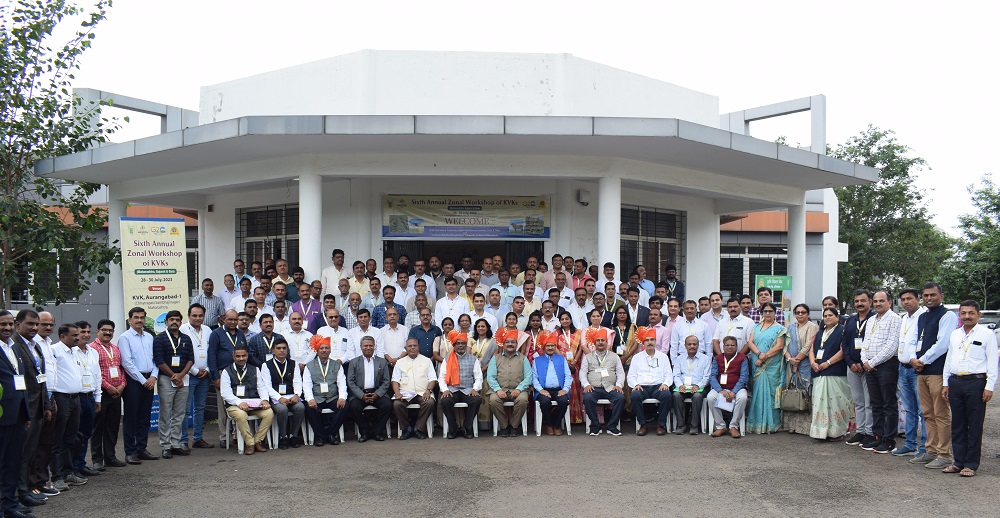
|
|
|
|
ICAR-ATARI, Pune organized Annual Action Plan Workshop of KVKs of Gujarat and Goa.
| |
ICAR-Agricultural Technology Application Research Institute (ATARI), Pune organized a two-day Annual Action Plan Workshop of KVKs of Gujarat and Goa in collaboration with ICAR-Directorate of Medicinal and Aromatic Plants Research at ICAR-DMAPR, Anand during 15-16 May, 2023. The workshop was inaugurated on 15 May 2023.
In inaugural address, Hon’ble Vice-Chancellor, Anand Agricultural University, Dr. K.B. Kathiria mentioned about the significance of utilizing resources from different government schemes to fulfil the contingency requirement of KVKs. He also emphasized incorporation of new technologies like Drone application, Nano urea, etc. in the action plan of KVKs. He advised Directors of Extension Education to provide backstopping to KVKs through supply of newly released technologies by SAUs.
The Directors of Extension Education Dr. H. B. Patel, DEE, AAU, Anand, Dr. N. M. Chauhan, DEE, NAU, Navsari, Dr. A. G. Patel, DEE, SDAU, S.K. Nagar and Dr. H.C. Chhodvadia, Associate DEE, JAU, Junagadh chaired and co-chaired different technical sessions during workshop.
Dr S.K. Roy, Director, ICAR-ATARI, Pune mentioned that KVK is a frontline extension system and KVK has to differentiate them from other extension system like state departments. He also applauded SAUs in Gujarat for providing retirement benefits and said that this examples should be followed by all host organisations. He urged KVKs should reorient their activities according to new mandates of KVK.
The chief guest of the valedictory programme, Dr Manish Das, Director, ICAR-DMAPR, Anand lauded the work done by KVKs and their role in taking technologies to the farmers’ doorstep.
The Heads of 33 KVKs of Gujarat, Goa and Maharashtra presented their action plan for the upcoming year 2023 on the occasion.
A total of around 100 participants attended the event.
|
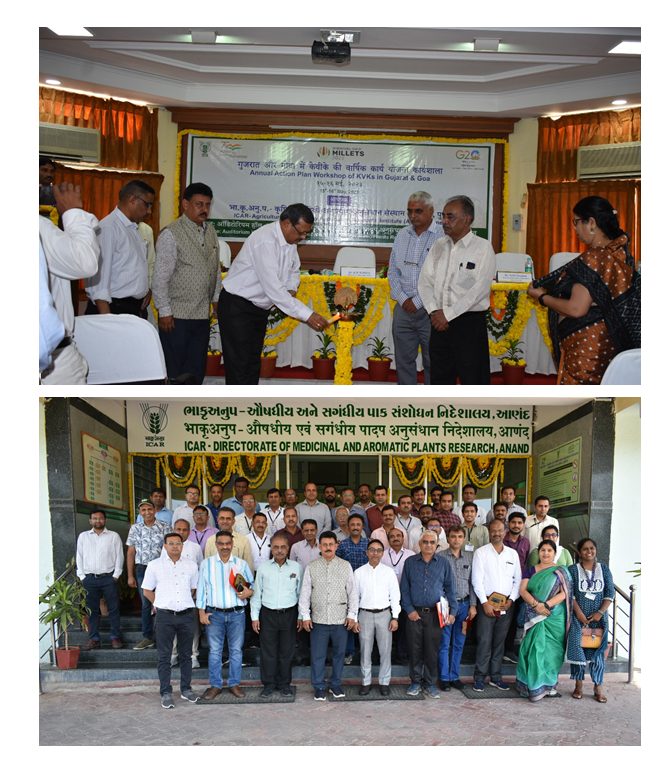
|
|
|
|
Review Workshop of KVKs of ATARI Zone VIII 4 May 2023, ICAR-ATARI, Pune.
| |
Review Workshop of KVKs of ATARI Zone VIII (Maharashtra, Gujarat and Goa) on newly introduced programmes in KVKs and Interaction meeting with DEEs of SAUs in the Zone Organized by ICAR-Agricultural Technology Application Research Institute, Pune On 4 May 2023 from 9.00-12.00 hrs.
Dr. S. K. Roy, Director, ICAR-ATARI, Pune welcomed the participants and explained about the purpose of organizing workshop. He underlined the importance of the Review Meeting in enabling the interaction between DEEs, KVKs and ATARI. He highlighted the role of KVKs and ATARI in implementing the Projects on Drone, Natural Farming and need to reach towards farmers in fast ways.
Dr. A. K. Singh, VC, RLBCAU, Jhansi were present as guest of Honor and Dr. U. S. Gautam, DDG (Agril Extn), ICAR, New Delhi as chief guest at ICAR-ATARI, Pune.
Inaugurating the Workshop, Dr. Ashok Kumar Singh, VC, RLBCAU, Jhansi highlighted the role of KVKs in implementing various activities. He also stressed on KVK being well equipped with Functional diagnostics centers i.e. agri-clinics, and all KVK must have Demo Units. There should be continuity in activities that are ongoing in KVKs like ARYA and FFP projects. KVK should work on priority setting mode. Identify how Drones can be used properly. Geotaging experiments must be conducted, Crop Cafeteria must be developed. KVKs are good at working but poor at reporting. KVKs should be part of RAC in Universities. Feedback of recommendations is required. KVK should take Joint Programs with state govt. Seed and planting material production at KVK must be there with participatory approach with help of farmers and make efforts for certification of seeds.
Dr. U. S. Gautam, DDG (Agril Extn), ICAR, New Delhi outlined the key role of Krishi Vigyan Kendras in the progress of agriculture. He urged SAUs to prepare University wise APR. Single window Knowledge Resource and Capacity development system must be there at KVK. In every three years recommendation given in publications must be updated like package of practices. Kisan Sarthi, KVK portal and Darpan portal must be updated on regular basis for KVK activities. KVK should make gender friendly infrastructure facilities.
A Presentation on Review on KVKs and newly introduced programmes in KVKs was presented by DEES from SAUs in the zone, Dr. G. K. Waman, DEE Office, MPKV, Rahuri, Dr. P. A. Sawant, DEE, BSKKV, Dapoli, Dr. H. M. Gajipara, DEE, JAU, Junagadh presented the review Online, wereas Dr. D. B. Deosarkar, DEE, VNMKV, Parbhani, Dr. D. B. Undirwade, DEE, PDKV, Akola, Dr. A. U. Bhikane, DEE, MAFSU, Nagpur, Dr. N. M. Chauhan, DEE, NAU, Navsari, Dr. P. T. Patel, DEE, SDAU, SK Nagar, Dr. S. D. Patel, Associate DEE, AAU, Anand were present physically for the workshop.
Senior Scientist and heads, SMS and other KVK staff from 82 KVKs of Maharashtra, Gujarat and Goa were present in Hybrid mode.
More than 150 Participants attended the workshop physically and through Zoom Platform.
Vote of thanks was given by Dr. Rajesh. T, Scientist, ICAR-ATARI, Pune.
|
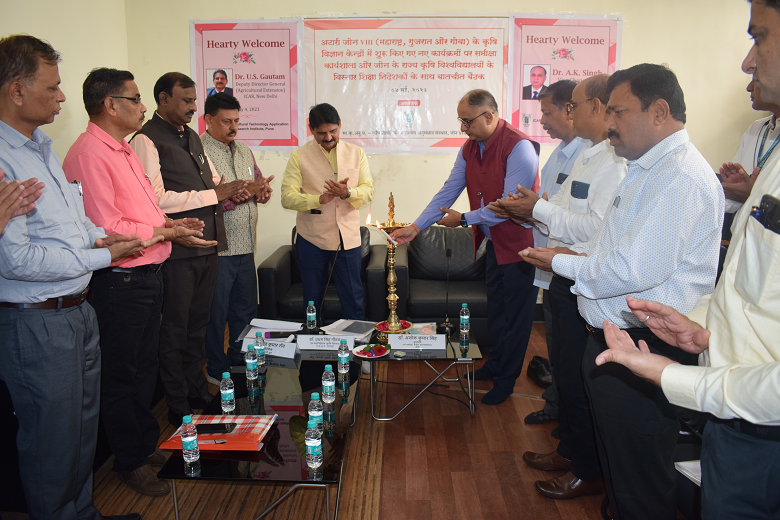 |
| |
Annual Action Plan Workshop of KVKs in Maharashtra inaugurated on 22 February 2023, Pune.
|
ICAR-Agricultural Technology Application Research Institute (ATARI), Pune organized a two-day Annual Action Plan Workshop of KVKs in Maharashtra in collaboration with ICAR-National Research Centre for Grapes at ICAR-NRCG, Pune during 22-23 February, 2023. The workshop was inaugurated today.
In his inaugural address, Dr. V. M. Mayande, Former Vice-Chancellor, PDKV, Akola explained the significance of increasing farmers’ income and the ways of increasing farm income, particularly through diversifying towards non-farm activities. He urged the participants to work on priority areas like the application of Information Technology, Artificial Intelligence, drones, and robotics in agriculture, the promotion of group farming, and Farmer Producer Organizations. He also stressed the responsibility of the KVKs to understand ground-level problems and emphasized the impact of agricultural research on the Indian Economy.
Dr. D. B. Deosarkar, DEE, VNMKV, Parbhani briefed different phases of crop diversification and highlighted the importance of millets especially Bajra and Sorghum in the context of Maharashtra state. He urged for following the practice of intercropping of pulses and oilseeds in the state.
Dr. Kaushik Banerjee, Director, ICAR-ATARI, Pune in his welcome address emphasized the importance of grapes and urged on facilitating more agro-based and other advisories by developing various apps in different crops.
The Heads of 50 KVKs of Maharashtra will present their action plan for the upcoming year 2023 on the occasion.
The Experts gave their valuable suggestions for developing a realistic action plan for KVKs.
A total of 85 participants attended the event.
| | 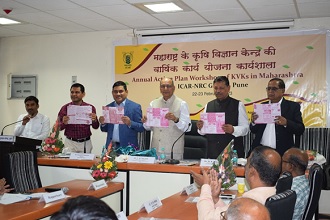 | | |
Union Minister of Agriculture & Farmers Welfare Inaugurates Administrative Building of ICAR-ATARI, Pune on 19th January 2023.
|
The new administrative building of ICAR-Agricultural Technology Application Research Institute (ATARI), Pune was inaugurated by Shri Narendra Singh Tomar, Union Minister of Agriculture and Farmer's Welfare virtually today.
In his inaugural address, Shri Tomar said that KVKs are playing an important role in agriculture. He accentuated 731 KVKs in the country are working for enhancing the prosperity of the farmers. He said that ICAR has developed many climate-resistant and biofortified varieties to face the climate change situation. He urged the KVK scientists to work more seriously in the present situation.
Shri Choudhary also inaugurated a Workshop on Natural Farming and Millets.
Dr. Himanshu Pathak, Secretary (DARE) & Director General (ICAR) conveyed through a message that ATARI Pune addressed the diversified issues of agriculture for the farmers of Maharashtra, Gujarat, and Goa through 82 KVKs. The technological dissemination for soil & water conservation, precision farming, sericulture, bamboo farming, hi-tech agriculture, improved dairy, goat rearing, poultry farming, IFS models, women entrepreneurship, etc. under diverse agro-climatic conditions were carried out to help the farmers, he added. Dr. Pathak said the KVKs of the Zone also worked with a large number of FPOs, women SHGs, and farmer’s groups and established active linkages with line departments.
Dr. U. S. Gautam, Deputy Director General (Agril. Extension), ICAR in his welcome address appreciated the timely completion of the administrative building and highlighted the achievements of the ATARI during the last five years. He urged the KVKs to reach maximum number of farmers by using the digital platforms.
P.P. Adrushya Kadsiddheshwar Swami, Chairman, Kaneri Math, Kolhapur urged to promote indigenous cow, natural farming, integrating traditional wisdom with modern science, processing, and value addition for enhancing farmers’ income.
Dr. P.G. Patil, Vice Chancellor, MPKV, Rahuri stressed adopting integrated farming system model, hi-tech farming, and making millets a component of the existing cropping system.
Dr. Lakhan Singh, Director, ICAR-ATARI, emphasised close convergence, digital agriculture, showcasing successful IFS models, soil health, and human health through nutrition-sensitive agriculture.
Vice-Chancellors of SAUs, Senior Officials of ICAR, Directors of ICAR Institutes were present on the occasion.
A short film on five years journey of ATARI Pune and book entitled ‘Accomplishments of ATARI Pune - Five Years Glorious Journey’ were also released by the dignitaries.
More than 500 participants including the Vice-Chancellor's of SAUs, Chairmen of NGO KVKs, Directors of ICAR Institutes, Directors of Extension Education, and Heads of 82 KVKs from the zone participated in Workshop on Natural Farming and Millets.
| |
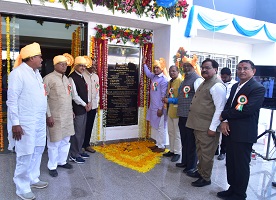 |
| |
“Annual Zonal Workshop of KVKs of Zone - VIII” organized on 7-9 July, 2022, Anand, Gujarat.
|
ICAR-Agricultural Technology Application Research Institute (ATARI), Pune organized a two-day Annual Action Plan Workshop of KVKs in Maharashtra in collaboration with ICAR-National Research Centre for Grapes at ICAR-NRCG, Pune during 22-23 February, 2023. The workshop was inaugurated today.
In his inaugural address, Dr. V. M. Mayande, Former Vice-Chancellor, PDKV, Akola explained the significance of increasing farmers’ income and the ways of increasing farm income, particularly through diversifying towards non-farm activities. He urged the participants to work on priority areas like the application of Information Technology, Artificial Intelligence, drones, and robotics in agriculture, the promotion of group farming, and Farmer Producer Organizations. He also stressed the responsibility of the KVKs to understand ground-level problems and emphasized the impact of agricultural research on the Indian Economy.
Dr. D. B. Deosarkar, DEE, VNMKV, Parbhani briefed different phases of crop diversification and highlighted the importance of millets especially Bajra and Sorghum in the context of Maharashtra state. He urged for following the practice of intercropping of pulses and oilseeds in the state.
Dr. Kaushik Banerjee, Director, ICAR-ATARI, Pune in his welcome address emphasized the importance of grapes and urged on facilitating more agro-based and other advisories by developing various apps in different crops.
The Heads of 50 KVKs of Maharashtra will present their action plan for the upcoming year 2023 on the occasion.
The Experts gave their valuable suggestions for developing a realistic action plan for KVKs.
A total of 85 participants attended the event.
| | 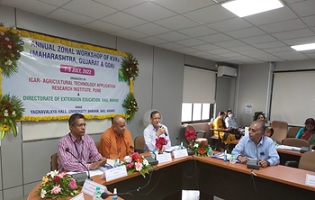 | | |
“Annual Review Workshop of NICRA-KVKs in Maharashtra, Gujarat and Goa” organized on 8 - 9 June, 2022, Jalna-I
|
The ICAR-Agricultural Technology Application Research Institute, Pune, Maharashtra; ICAR-Central Research Institute on Dry land Agriculture, Hyderabad and Marathwada Sheti Sahayya Mandal, Jalna, Maharashtra jointly organized the Annual Review Workshop of NICRA-KVKs in Maharashtra, Gujarat and Goa at Krishi Vigyan Kendra, Jalna - I, Maharashtra from 8th to 9th June, 2022.
Inaugurating the Workshop, the Chief Guest, Dr. V.K. Singh, Director, ICAR-CRIDA, Hyderabad appreciated the KVK’s efforts for the work done in the first phase of NICRA. He also underlined that the water and Green House Gas (GHG) emission is a global constraint now-a-days. In this situation, keeping the livestock, fisheries and poultry will have more priority in the scenario of climate change. The implementation of the new phase of NICRA by following the Farming System Typology approach was also stressed by Dr. Singh.
Shri Vijay Anna Borade, Trustee, MSSM, Jalna, Maharashtra accentuated on the need of incorporating some treatments related to the watershed in a next phase of NICRA. He regarded the soil conservation as an only alternative in solving the water problem in the climate sensitive Districts.
Dr. Lakhan Singh, Director, ICAR-ATARI, Pune, Maharashtra underlined that NICRA is a participatory research project and urged the KVKs to use their wisdom as per their locations while implementing the activities.
Dr. S.V. Sonune, Head, KVK, Jalna, Maharashtra shared the experiences of the Village watershed and successful interventions of NICRA.
Dr. J.V.N.S. Prasad, Coordinator, TDC-NICRA, ICAR-CRIDA, Hyderabad and Dr. A.V.M. Subba Rao, Principal Scientist, ICAR-CRIDA, Hyderabad also participated and deliberated during the occasion.
More than 45 participants including Principal Investigators, Co-Principal Investigators, Research Associates, Senior Research Fellows and Scientists of 11 NICRA-KVKs from Maharashtra, Gujarat & Goa and 3 Centers of Farmers FIRST Project from Maharashtra and Gujarat participated in the workshop.
| | 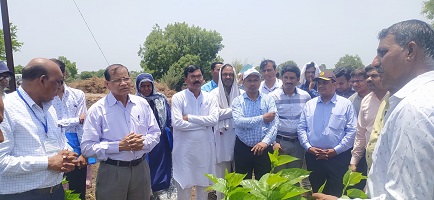 | | |
Administrative Building and Farmers Hostel of KVK Ahmednagar Inaugurated by DDG (Agril Extension), ICAR) on 29 December 2021
|
Today on 29.12.2021, the Chief Guest Dr. Ashok Kumar Singh, DDG (Agril Extension), ICAR, New Delhi inaugurated the Administrative Building and Farmers Hostel of KVK, Dahigaon, Ahmednagar in virtual mode.
In inaugural speech, he highlighted the efforts taken by the KVKs for doubling farmers income in India and emphasized that 70,000 farmers have already doubled their income in last 5-6 years. He also suggested that, introduction of additional enterprises like poultry farming, goat rearing, horticulture nursery, mushroom cultivation, etc. will help in doubling the farmers income. He explained that how India has shifted from import dependent to self sufficient country by the usage of chemical fertilizers. He also explained the fact that, due to which the land quality is being degraded. Hence, the Government of India is now focusing on natural farming and organic farming by using bio-fertilizers, bio-pesticides, judicious use of chemical fertilizers. DDG (Agril Extension) suggested following alternative deep rooted and shallow rooted crops to improve the ground water table. He also appreciated the use of farm pond for pomegranate cultivation with the help of drip irrigation in Maharashtra. His major concern was on linking farmers with market through Farmers Producers Organizations (FPOs), crop residue management, conservation agriculture, reducing cost of cultivation, processing and value addition. He appreciated effort of KVK specially developing 30 demonstration units for educating the farmers.
Dr. Lakhan Singh, Director, ICAR-ATARI, Pune appreciated the work of KVK specially large scale adoption of BDN-711 (pgeionpea), Phule Vikram (chickpea), Phule Samadhan (wheat), sugarcane nursery, climate resilient technologies. Introduction of dragon fruit, bio-fortified varieties, ultra high density mango, guava meadow orchard, custard apple etc. is exemplary. Documentation of successful cases on enhancing farmers' income, best cases of agri-preneurs and innovative farmers is required. Visited experimental plots of Shri Someshwar Lawande, a young farmer demonstrated 12 species of fodder grasses and producing seeds. He has started contract farming on fodder seed production involving 100 farmers. Such rural youths may be trained to become self-depend and motivating other farmers.
Dr. Narendra Ghule Patil, President and Ex-MLA, Shri Marutrao Ghule Patil Shikshan Sanstha, Ahmednagar expressed on challenges and opportunities in front of farmers and role of KVK to resolve them more strategically. He mentioned that full support of ICAR to KVKs is appreciable. It is helpful in empowering the farmers towards socio-economic development at village level.
Dr. Shaym Sundar Kaushik, introduced all honorable dignitaries and guests, he put forth the brief progress made by Krishi Vigyan Kendra before dignitaries. He mentioned about challenges ahead and requested for all sorts of support from ICAR for smooth running of KVK activities.
At this occasion, Shri Chandrashekhar Ghule Patil, Ex-MLA; Smt Raj Sheetal Ghule Patil, President, Zila Parishad, Ahmednagar; Dr. S.R. Gadakh, Director Research & Extension Education, MPKV Rahuri; Shri Atul Shevke, Secretary, Shri Marutrao Ghule Patil Shikshan Sanstha; Dr Rajesh T and other line department officials were present. In this programme, more that 200 farmers and extension functionaries participated.
| | 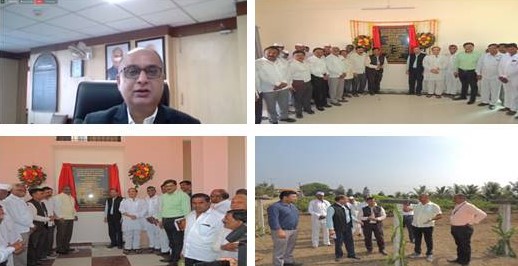 | | |
State Level Review Workshop on Cluster Frontline Demonstrations for Oilseed and Pulses Organised on 18.11.2021
| A two days State Level Review cum Sensitization Workshop on Cluster Front Line Demonstration on Pulses and Oilseeds for 47 KVKs of Maharashtra was jointly organised by ICAR-ATARI, Pune and KVK, North Goa on 18.11.2021. The workshop was inaugurated by Dr. V.P. Chahal, ADG (Agril Extension), ICAR, New Delhi; Dr Parveen Kumar, Director, ICAR-CCARI, Goa; and Dr Lakhan Singh, Director, ICAR-ATARI, Pune. At this occasion, Dr. D. B. Devsarkar, Director Extension Education, VNMKV, Parbhani; Dr. S.G. Bhave, Director Extension Education, BSKKV, Dapoli; and Dr. S.R. Gadakh, Director Research & Director Extension, MPKV, Rahuri were also present.
Dr. V.P. Chahal, ADG (Agriculture Extension) in his inaugural address urged the KVKs to focus on processing and value addition of oilseeds and pulses, biofortified varieties, nutrition security, increasing income of farmers and reduce dependence on imports. He lauded the KVKs efforts during pandemic and pointed upon increasing responsibility of KVKs. Dr. Chahal mentioned that KVK is backbone of Agricultural Extension and Oilseeds and Pulses are priority areas for KVKs. He also suggested exchanging the quality seeds produced by farmers in CFLD demonstrations among farmers to alleviate the problem of good quality seed availability. Dr. Parveen Kumar, Director, ICAR-CCARI, Goa mentioned that pulses and oilseeds production has increased by 3.7 MT and 5.56 MT respectively as compared to last year and we will be self-reliant in pulses and oilseeds due to KVKs efforts. He apprised about development and progress of CCARI, Goa. He said that pulses and oilseed crops will also be promoted in Goa state. Dr. Lakhan Singh, Director, ICAR-ATARI, Pune in his opening remarks earlier gave focus on enhancing productivity and profitability of oilseeds and pulses. He advised the KVKs to promote climate resilient technologies like BBF, improved varieties and farm mechanisation etc. He appealed to identify some innovative farmers in oilseeds and pulses taking higher yield and analyse the reasons for the same. He urged the KVKs to study impact of cluster frontline demonstrations on pulses and oilseed over last five years. Intercropping and crop diversification through short duration pulses/oilseed crops are needed for increasing farmers income. He said that farmers should be very vigilant towards incidence of insect and pests.
Quality seed availability, bridging technological gap, area expansion of oilseed and pulses, recording technical feedback, change in cropping pattern, value chain management etc. were highlighted by the Directors of Extension Education of SAUs. Dr. M.P. Deshmukh, Soybean Breeder and Ramesh Bhadani, Pulse Breeder from MPKV, Rahuri delivered lectures and highlighted latest technologies including cultivars of chickpea (Phule Vishwaraj, Phukle Vikrant, Phule Vikram, PDKV Kanak; Pigeionpea (BDN 716, Godawari, PKV Tara; Soybean (Phule Durva, Phule Kimaya, Phule Sangam, MAUS 612; Safflower (Phule Nira). Dr. H. R. C. Prabhu, Head, KVK North Goa welcomed the participants. Dr. T. R. Athare, Scientist, ICAR, ATARI, Pune proposed vote of thanks. More than 60 scientists participated in the workshop from different ICAR institutes, 4 SAUs and 47 KVKs.
| | 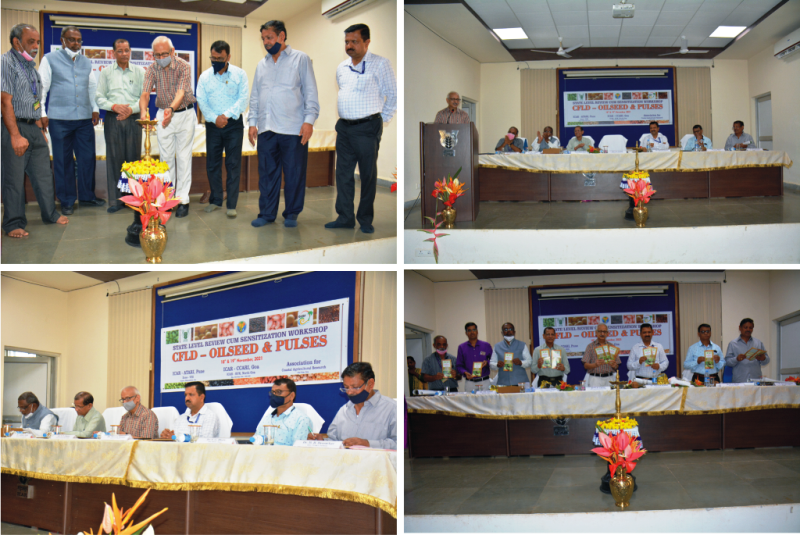 | | |
Krishi Mela and Agriculture Exhibition for Tribal Farmers in Narmada, Gujarat| Krishi Mela for Tribal Farmers was jointly organized by Krishi Vigyan Kendra, Narmada (Navsari Agricultural University, Gujarat) and ICAR-Central Potato Research Institute, Shimla on 9-10 March, 2021 under Tribal Sub Plan. Dr. Z.P. Patel, Vice Chancellor, Navsari Agricultural University, Navsari inaugurated the Krishi Mela on 9.3.2021. In his speech, he stressed on the need to develop sale point at the KVK for organic products of the farmers from nearby areas. He urged the KVK to develop seed bank of local crops and intensify the efforts to promote local varieties of traditional crops. Dr. Lakhan Singh, Director ATARI, Pune urged the farmers to adopt different well tested integrated farming systems models, income generating enterprises, organising themselves through forming Farmers Producers Organisations, linking with markets for earning higher profit. His main concern was on promoting farming system nutrition, developing poshan vatikas in the villages, identifying farm innovations to integrate with modern science and creating water harvesting structures. Harnessing potential of digital media was also one of the concerns for fast technology flow. Organic farming along with use of bio-fertilizers and bio-pesticides need to be popularised. Need of diagnostics services at the centre was also expressed. Appreciation certificates were provided to the innovative farm women who have contributed significantly in agriculture and allied components. Shri Moti Singh Vasava, Ex-MLA and Sh. Shankarbhai Vasava, socialist cum progressive farmer advised to initiate value addition of potato in tribal areas for upliftment of tribal farmers and support the idea of "Atma Nirbhar Bharat" and "Doubling Farmers Income". They also stressed on the need to save traditional crops like millets and traditional rice varieties. Shri Vijay Anna Borade, Trustee, MSSM, Jalna in his presidential address of inaugural session expressed his concerns to organize this technology week physically due to Covid-19 constraints. He extended that technology week should be celebrated as Farmers Fair where farmers can participate with family and enjoy the event. He expressed need of Integrated Farming System modules for sustainable agriculture by including sericulture, bamboo, aromatic and medicinal crops, goat, poultry and fishes to double the farmers income. Dr. Vinod Kumar, Principal Scientist from ICAR-Central Potato Research Institute, Shimla spoke on the exploring the potato cultivation in south Gujarat areas. Lectures on potato varieties and value addition, integrated pest management were delivered by Dr. Salej Sood and Dr. Ravinder Kumar of ICAR-CPRI, Shimla, respectively. Dr. C.K. Timabdia, Director Extension Education, Navsari Agricultural University, Navsari gave thrust on creating quality nursery, goat rearing, beekeeping and mushroom cultivation. Dr. P.D. Verma, Head, KVK, Narmada coordinated gave orientation about creating solar system, developing eco-friendly technology park, nutrition garden model, introducing strawberry, roof water harvesting system at the farm. Exhibition with 40 stalls was also organised. Mainly finger millets, little millet, red sorghum, red rice were highlighted. More than 500 tribal farmers of the area participated and got benefitted through krishi mela and displayed farm technologies. | | 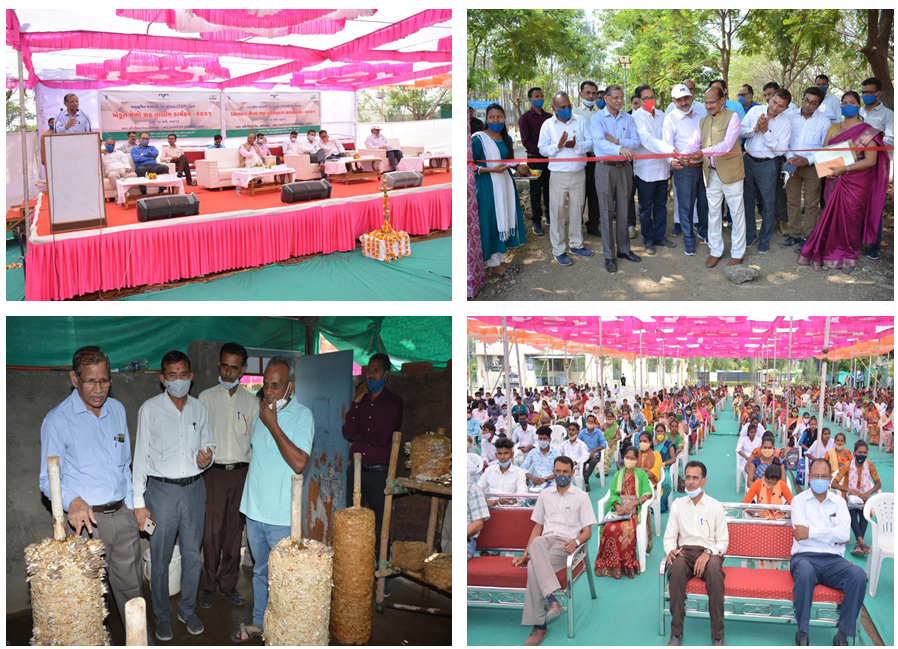 | | |
Third Institute Management Committee (IMC) Meeting of ATARI Pune was organized on 4th March 2021. | | 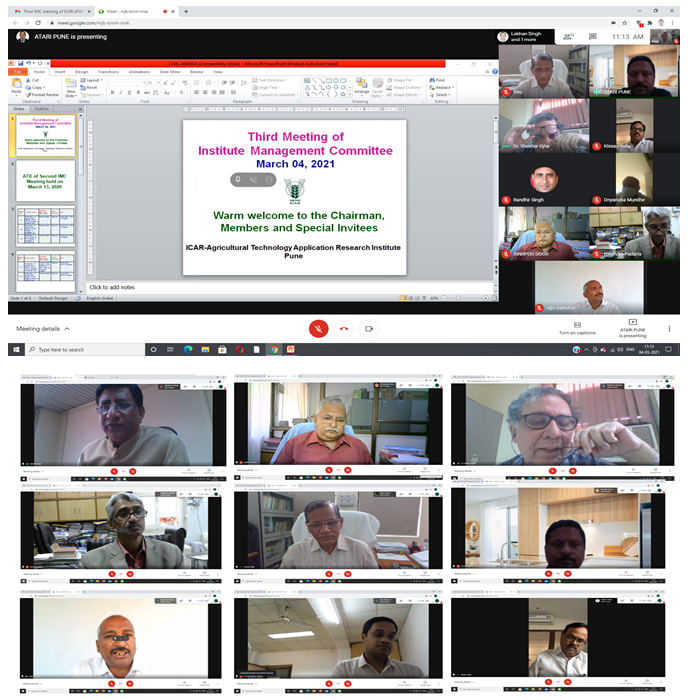 | | | | Virtual Agriculture Technology Week organized by KVK, Jalna-I in Maharashtra| Pune (26th February 2021): A three days virtual Agriculture Technology Week was organized by Krishi Vigyan Kendra, Jalna-I (Maharashtra) during 26 to 28 February, 2021. The technology week was inaugurated by Dr. Ashok Dhawan, Vice-Chancellor, Vasantrao Naik Marathwada Krishi Vidyapeeth, Parbhani on 26 February, 2021. The event was concluded by celebrating "National Science Day" in presence of Dr. C.D. Mayee, Chairman, South Asia Biotechnology Centre, New Delhi and Former Chairman, Agriculture Scientists Recruitment Board, New Delhi. Shri. Vijay Anna Borade, Trustee, Marathwada Sheti Sahayya Mandal (NGO), Jalna chaired both inaugural and valedictory sessions of Technology Week. Dr. Ashok Dhawan, VC, VNMKV, Parbhani in his inaugural address appreciated efforts of KVK, Jalna-I in the field of popularizing sustainable and climate resilient technologies like watershed development, sericulture, bamboo cultivation, goat and poultry farming etc. Sericulture will be the way of sustainable agriculture for drought prone Marathwada area. Elaborating his long-term association with this KVK, he stated that Krishi Vigyan Mandal (KVM), a volunteer farmer's network formed by KVK before 24 years is one of the best models of farmer-to-farmer knowledge transfer and its application in the field. He told that organizing regular monthly seminars by KVM on a fixed date of month is a "MahaGyan Yagya"of the farmers, by the farmers and for the farmers. Dr. C.D. Mayee, former Chairman of ASRB in valedictory session delivered a special lecture on "Future of GM crops in Future of Indian Agriculture - Opportunities and Challenges" on the occasion of National Science Day. He opined that farmers should have freedom to use technology. GM crops can change the future of farmers economy in India. He gave many examples of genetically modified crops including cotton, corn, brinjal, soya, potato, canola, sugar beets, alfalfa, yellow squash, zucchini, apple, Hawaiian papaya etc. being accepted in other countries of world and appealed that the Indian Government should permit GM crops in India to fulfill the needs of growing population in the country. Shri Vijay Anna Borade, Trustee, MSSM, Jalna in his presidential address of inaugural session expressed his concerns to organize this technology week physically due to Covid-19 constraints. He extended that technology week should be celebrated as Farmers Fair where farmers can participate with family and enjoy the event. He expressed need of Integrated Farming System modules for sustainable agriculture by including sericulture, bamboo, aromatic and medicinal crops, goat, poultry and fishes to double the farmers income. Dr.Lakhan Singh, Director, ICAR-ATARI, Punewhile addressing in the inaugural session, appreciated initiatives of KVK, Jalna-I in the field of soil and water conservation. He appealed all the KVKs to focus on health and nutrition of women by establishing nutritional gardens, processing and value addition, integrated farming system modules, in situ soil and water conservation, sustainable cropping systems, etc. for doubling farmers income. His main concern was to organize the farmers through FPOs. Dr. D.B. Deosarkar, DEE, VNMKV, Parbhani and Dr. D. L. Jadhav, Joint Director Agriculture, Aurangabad also addressed to participants in the inaugural session. Dr. S.V. Sonune, Senior Scientist and Head, KVK, Jalna-I facilitated this three-day event and shared innovative models of doubling farmers income.. Farmers seminars were organized on Sweet Orange management in changing climate; Rural agro-processing; Changing climate and Sericulture; Bamboo cultivation- A way of sustainable agriculture in future; Formation and functioning of Farmers Producing Organizations etc. Virtual field visits were also organized. More than 1000 farmers, rural youth, women and extension professionals were participated in this virtual event. | | 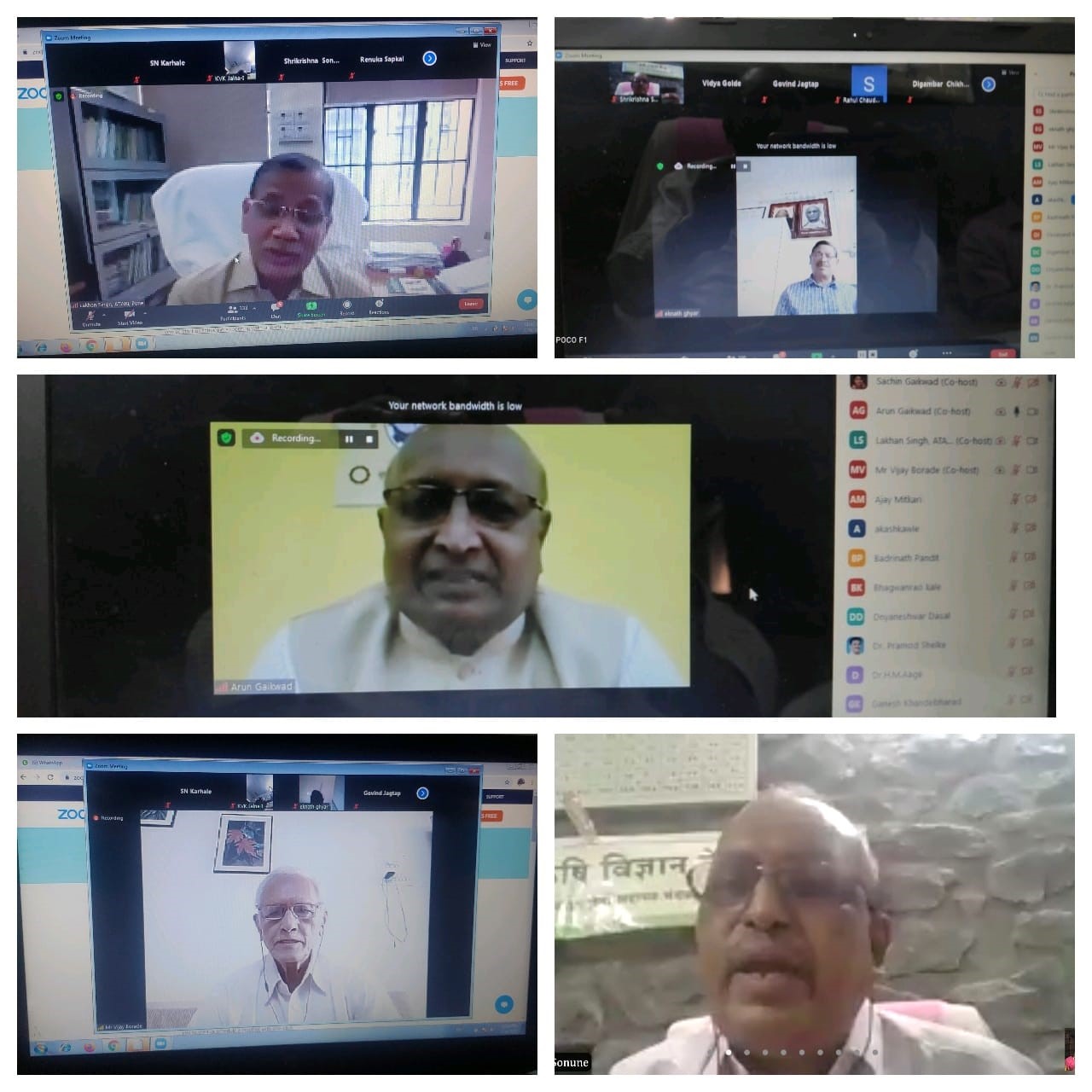 | | | Annual Action Plan Workshop of Gujarat KVKs Organized on 18.2.2021| The ICAR-Agricultural Technology Application Research Institute, Pune and KVK, Navsari (NAU, Navsari) jointly organized the State Level Online Annual Action Plan Workshop of 30 KVKs of Gujarat on18 February 2021. Dr. Ashok Kumar Singh, Deputy Director General (Agricultural Extension), ICAR inaugurated the annual action plan workshop on 18.2.2021 as Chief Guest. He said that farmers of Gujarat consider agriculture as agri-business. Farmers Producers Organization (FPO) is the smaller version of cooperative societies. There is rules of farmers, empowered themselves, working in groups, create linkage and access to the markets for harnessing higher profits. He urged the KVK to work as Cluster Based Business Organization (CBBO) for Farmer Producer Organizations. Soil and water management was emphasized. Handhold device should be used for soil testing and look into experiment system. Diagnostics should be focused. One commodity and one district should be considered by the KVK. KVK should be abreast in all respect and acts as knowledge and resource centre for the district. Main thrust on oilseed and pulses, bio-fortified varieties, nutri-gardens, quality nursery, soil health and organic farming may be given. Bio-kisan hubs may be developed involving 2-3 KVKs. Dr. Z.P. Patel, Vice Chancellor, Navsari Agricultural University, Navsari urged the KVKs to create marketing of organic products of farmers for higher profit. He appealed the KVKs to link the culture, taboos and festivals with farming practices to percolate in the tribal villages. KVK scientists should be sensitive to farmers' perspectives and continue their technological backstopping. Dr. V.P. Chovatia, Vice Chancellor, Junagadh Agricultural University, Junagadh was more concerned for post harvest processing, value addition, food safety standards and market intelligence to have better export market. Dr. R.M. Chauhan, Vice Chancellor, Sardarkrushinagar Dantiwada Agricultural University, SK Nagar said that hi-tech models for enhancing farmers' income should be promoted. Bio-fertilizers and bio-agents should be developed at the centres and used for reducing cost of cultivation. Dr. Lakhan Singh, Director, ICAR-ATARI, Pune expressed that due to climate change, several new diseases/pests are coming in the fruits and vegetable crops. KVK experts should be vigilant to predict and follow alternate strategy. Export oriented fruit varieties like in mango Pusa Pratibha, Pusa Lalima, Pusa Shrestha having exportable characters should be included in the works plan. There is a need to devise early forecasting and warning system for bacterial blight in pomegranate. Dr. V.P. Chahal, ADG (Agril Extension) suggested that KVKs should be visionary in developing work plan. Perspective plan should be developed for the district. Colander of operations is to be designed. Convergence with different agencies to obtain technological and financial support needs to be build-up. He guided the KVKs to empower the farmers, farm women and rural youth in respect to latest technologies. Dr. P.L. Saroj, Director, Central Institute doe Arid Agriculture, Bikaner highlighted the need of understanding components of different IFS models with proper management practices. Roping school dropouts for entrepreneurship development is required. Dr. C.K. Timbadia, Director Extension Education, NAU, Navsari coordinated the workshop and also shared different successful economic models including organic farming, FPOs, fisheries and horticulture. In total 75 participants including Directors of Extension Educations (JAU, Junagadh; SDAU, SK Nagar; AAU, Anand and NAU, Navsari); Professors and 30 Heads of KVKs attended the workshop in virtual mode. Annual works plan for the year 2021 was presented by 30 KVKs of Gujarat. | | 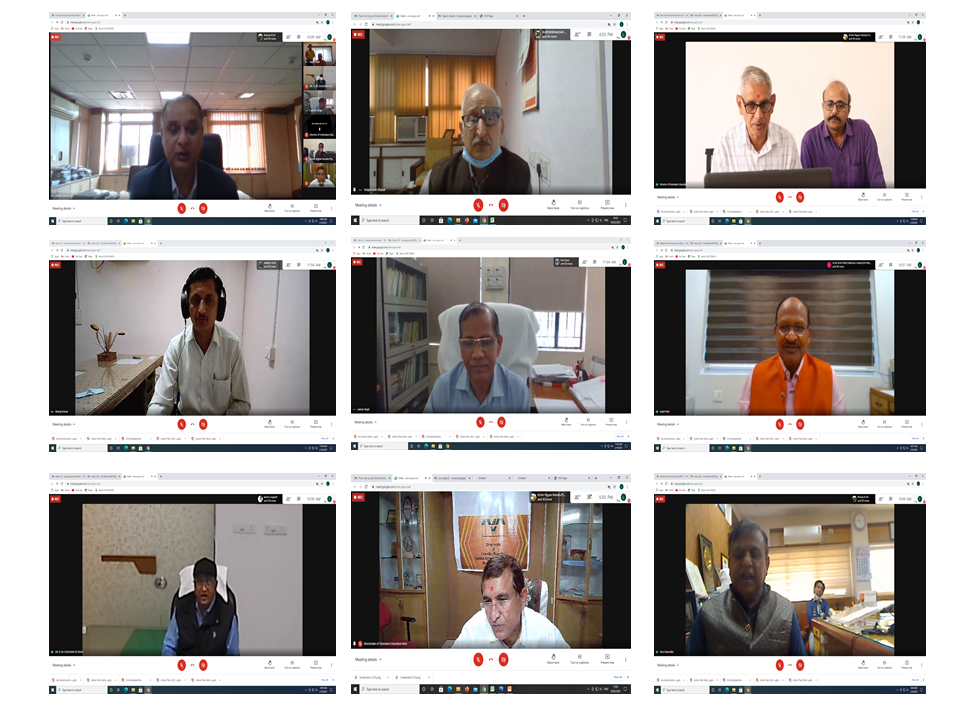 | | | State Level Annual Online Action Plan Workshop of 51 KVKs of Maharashtra and Goa Organized on 09 - 10 February, 2021. | The ICAR-Agricultural Technology Application Research Institute, Pune and KVK, Aurangabad-I (VNMKV, Parbhani) jointly organized the 'State Level Online Annual Action Plan Workshop of 51 KVKs of Maharashtra and Goa from 9-10 February 2021'. Dr. Ashok Kumar Singh, Deputy Director General (Agricultural Extension), ICAR inaugurated the annual action plan workshop on 9.2.2021 as Chief Guest. He said that KVK should be build up as model campus where people can learn so many things without narrating anything. KVK should be futuristic in action plan. Commodities for market access and areas of working should be identified. Identify the cluster of KVKs for water scarcity areas, intensified seed production, quality nursery and protected cultivation. Groundwater recharge activities need to be focused. Villages identified for doubling farmers' income should be converted into model villages. Convergence model should be developed in the district. KVK should have connection with FPOs, Banks, agriculture universities, ICAR institutes and other agencies. Efforts for creating incubation centre at the KVK are required. Youth should be facilitated for 2-3 years and they should be in touch with the KVK. Funding should be roped in for obtaining projects from ministry of food industries and MSME. Kind of skilling under ARYA project started, it should be upgraded at higher level. His more thrust was on capacity building of aanganwadi workers and farm women, creating poshan vatikas/nutrition garden, nutrithali and biofortified varieties through NARI programme. All biofortified varieties should be popularized through the farmers. Social media may be used for good experience or small video sharing. Dr. Ashok Dhawan, Vice-Chancellor, Vasantrao Naik Marathwada Krishi Vidyapeeth, Parbhani, Maharashtra stressed on beautification of KVK campus so that the visiting farmers can be satisfied and get useful technologies. He also accentuated to encourage the entrepreneurship development with backward and forward linkages. He urged KVKs to start input production units i.e. seeds, biofertilizers, quality bio pesticides, seedlings, trichocard etc. and to be provided to the farmers in the district. Try to follow the standard package of practices. Dr. V.M. Bhale, Vice-Chancellor, Dr. Panjabrao Deshmukh Krishi Vidyapeeth (PDKV), Akola, Maharashtra said that KVK is the only media for transfer of technology where farmers have faith. KVK is hub for farm technologies. Custom hiring service for costly farm implements/machineries is useful. He said that sericulture, floriculture, in-situ moisture conservation, agro-based models should be emphasized at the centre. Dr. S.D. Sawant, Vice-Chancellor, Dr. Balasaheb Sawant Konkan Krishi Vidyapeeth (BSKKV), Dapoli, Maharashtra, stated stated that KVK, Ratnagiri has started an innovative unit of fresh cashew nut processing for providing good quality cashew nuts. KVK should provide alternative solutions to the farmers. Dr. A.M. Paturkar, Vice Chancellor, MAFSU, Nagpur urged the KVKs to integrate livestock component with agriculture for continued income. Desi cow based unit should be developed at the KVKs. In introductory remarks, Dr. Lakhan Singh, Director, ICAR-ATARI, Pune highlighted that KVKs should address burning issues like PBW in cotton, FAW in maize, white grub in sugarcane, dieback and gummosis in sweet orange, etc. Farmers can use the border of the farms to cultivate drumstick, custard apple, jamun, tamarind, karonda for attaining additional income. Focus on crop diversification, bee keeping, goat farming, fishery, IFS models, sericulture, processing and value addition for enhancing farmers' income needs to be given. KVKs should be very alert about incidences of lumpy skin disease, bird flu and FMD for providing advisories and diagnostics in advance. Hi-tech horticulture, sensor based irrigation, micro irrigation, organic farming need be emphasized in the work plan. Dr. VP Chahal, ADG (Agril Extension), ICAR suggested that productivity of oilseed and pulses need to be increased though cluster frontline demonstrations. Dr. Randhir Singh, ADG (Agril Extension), ICAR gave emphasis on cluster based FPOs, value chain management, entrepreneurship development, one district-one commodity concept. Dr. YG Prasad, Director, ICAR-CICR, Nagpur; Dr. Major Singh, Director, ICAR-DGR, Pune; Dr. EB Chakurkar, Director, ICAR-CCARI, Goa; and Directors of Extension Education of SAUs (MPKV, Rahuri; VNMKV, Parbhani; PDKV, Akola; BSKKV, Dapoli; MAFSU, Nagpur) were also joined the workshop and gave valuable inputs to improve the action plan of KVKs. In total 120 participants including 51 Heads of KVKs (49 Maharashtra and 2 Goa) participated and presented their annual action plan for the year 2021. | | 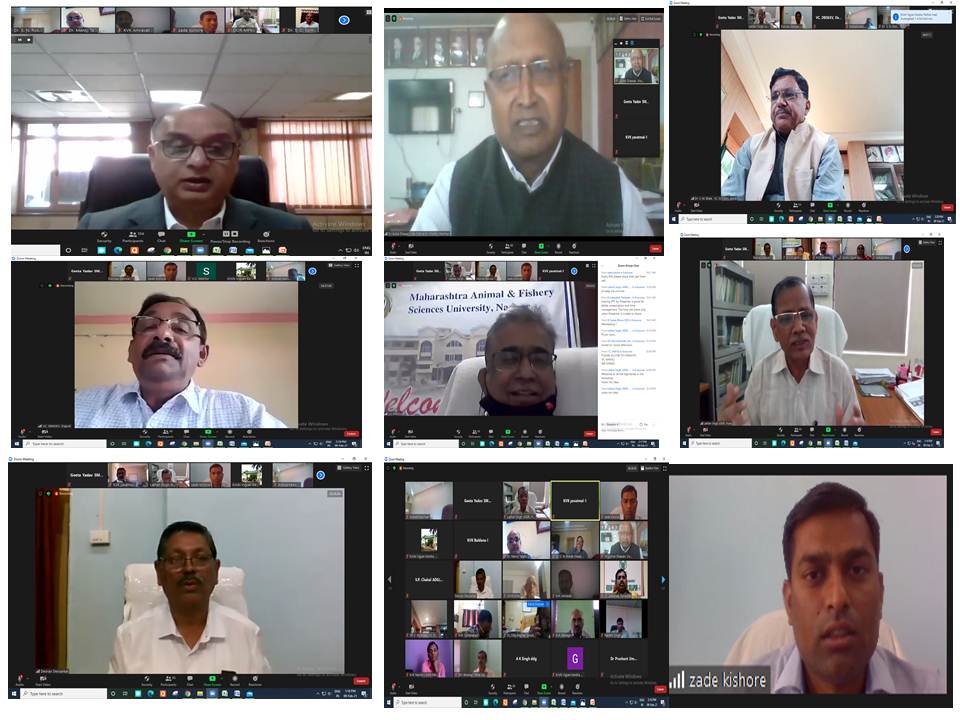 | | | KVKs should disseminate climate resilient income generating models through farmers groups -Dr. Lakhan Singh | KVKs should disseminate climate resilient income generating models like sericulture, bamboo farming, goat farming, backyard poultry, bee keeping, fisheries, IFS modules, etc. through farmers voluntary groups, was urged by Dr. Lakhan Singh, Director, ICAR-ATARI, Pune. He was addressing to farmers as a chief guest in 282nd monthly seminar of Krishi Vigyan Mandal (KVM) organized by Krishi Vigyan Kendra, Jalna-I in virtual mode. He appreciated efforts of KVK, Jalna-I for continuing such an initiative from last 24 years in which farmers monthly seminars are organized regularly on fixed date i.e. 5th of every month without any discontinuation. The monthly seminars are being organized online during Covid-19 pandemic to continue the initiative. On 5th February, 2021 KVM celebrated its 282nd monthly seminar witnessed by Director ATARI in which two topics namely "Bird flu-Myths and Facts" and "Importance of honey bees in crop production and Bee Keeping" were discussed. Dr. Anil Bhikane, Associate Dean, Post Graduate Institute for Veterinary and Animal Science, Akola (MAFSU, Nagpur) and Dr. P.S. Neharkar, Professor, Department of Entomology, Vasantrao Naik Marathwada Krishi Vidyapeeth, Parbhani imparted in depth knowledge and information to farmers on the concerned topics. Dr. Anil Bhikane in his very informative speech, explained the background of bird flu, its reasons, symptoms, intensity, precautionary measures to be taken at farmers level, quarantine measures being adopted by government etc. He told that in present situation people are in phobia of bird flu but in actual not a single human death has noticed in India due to this disease since 2006. Eating chicken and eggs boiled over 700 C is absolutely safe as all the viruses get destroyed at this temperature, he extended. Dr. P.S. Neharkar, Professor (VNMKV Parbhani) while sharing his expertise on bee keeping elaborated the scope of honey bee keeping in specific parts of Marathwada, Vidarbha, Western Maharashtra and Konkan regions of Maharashtra. He stressed on the potential and suitability of species like Apis mellifera, Apis dorsata, Apis serata, etc for bee keeping and pollination. He opined that bee keeping may come up a good income generating activity in Maharashtra due to varied biodiversity in different parts of the state. It has potential to double the farmers income in very limited resources and infrastructure. Honey bees help for pollination and biological pest control. There was also an interaction between farmers and scientists to clear their doubts. Initially Dr. S. V. Sonune, Head, KVK, Jalna-I gave his introductory remarks and welcomed the participants. He briefed the speakers about objectives and expectations of today's seminar on behalf of farmers. More than 100 farmers including KVK scientists and extension personnel were joined the event by virtual mode. | | 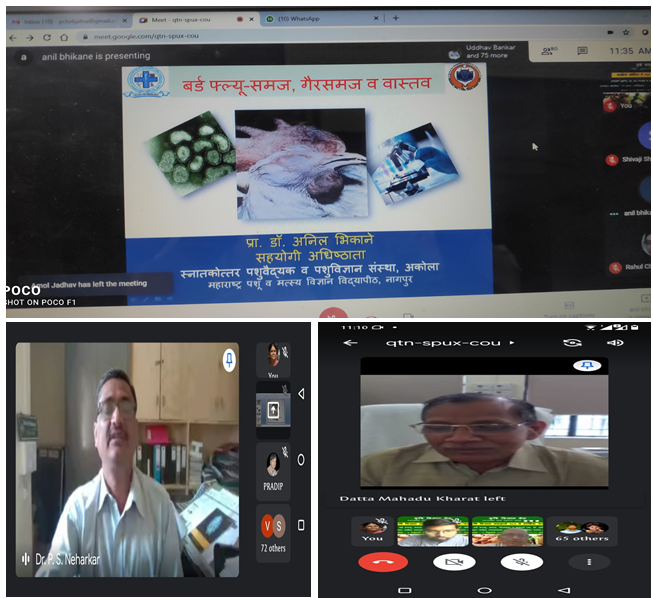 | | | Agricultural Technology Festival-2021: QR Code Based Agricultural Information Facility Inaugurated on 27th January, 2021 | The 13th Agricultural Technology Festival-2021 was jointly organized by Krishi Vigyan Kendra, Solapur-I and Department of Agriculture during 27-28 January, 2021. In inaugural address, Dr. Lakhan Singh, Director, ICAR-ATARI, Pune stressed the use of ICTs for speedy transfer of technology and appreciated the efforts of the KVK. He focussed on doubling farmers' income through diversification and integrated farming system. He said that sorghum based processing and value addition promoted by the KVK is remarkable for becoming youth self depend. Dr. Sharad Gadakh, Director Research and Director of Extension Education, MPKV, Rahuri highlighted the potentials of different crop varieties of MPKV displayed in Live Crop Demonstrations of KVK and urged farmers to take it on their farms. Shri Pradeep Gaikwad, Chairman, SKP, Solapur gave focus on promotion of low cost technologies and innovative extension methodologies for upliftment of rural masses. Initially Dr. L.R. Tambade, Head & Senior Scientist, KVK, Solapur-I briefed about the concept of Agricultural Technology Festival and QR-Code based digital Agricultural Technology Information Facility created at the centre by which the farmers can access the need based technological information through their mobile seamlessly. It is low cost and smart and innovative way to reach to farming community. In live crop demonstrations displayed total 46 varieties/hybrids of 25 different crops with improved technologies like drip irrigation, poly mulching, fertigation, integrated nutrient management, integrated pest management and strip planting for enhancing yield and resource conservation. Rabi sorghum varieties like Phule Revti for deep soil, Phule Madhur variety for Hurda purpose, Phule Mauli variety for light soil demonstrated at the centre. Phule Gunvant hybrid napier and Dashrath dryland pulse fodder crop were shown to the farmers for green fodder purpose. Under vegetable improved hybrids with drip, INM, fertigation and IPM technologies demonstrated in tomato brinjal, chilli, okra, onion and drumstick crops. Model kitchen garden is developed for fresh and organic vegetable for family. Dr. B.V. Indi, Associate Director Research, NARP, Solapur; Dr. Milind Deshmukh, Soybean Breeder, Agriculture Research Station, MPKV, Digrus, Sangli; Mr. Jaywant Kawade, Sub-Divisional Agricultural Officer, Solapur; Mr. S. P. Sadaphule, Deputy P.D. ATMA, Solapur and other line department officials of various line departments participated in the event. On 28 January, 2021 Dr. Jyotsana Sharma, Director, ICAR-NRCP, Solapur, Mr. Subhash Urkande, General Manager, SBI & Mrs. Monika Mohite, M.D. Mohite Agro. Kolhapur will join and address on women empowerment, processing and organic input production. Total more than 500 farmers were participated in field visits and technical seminars. | | 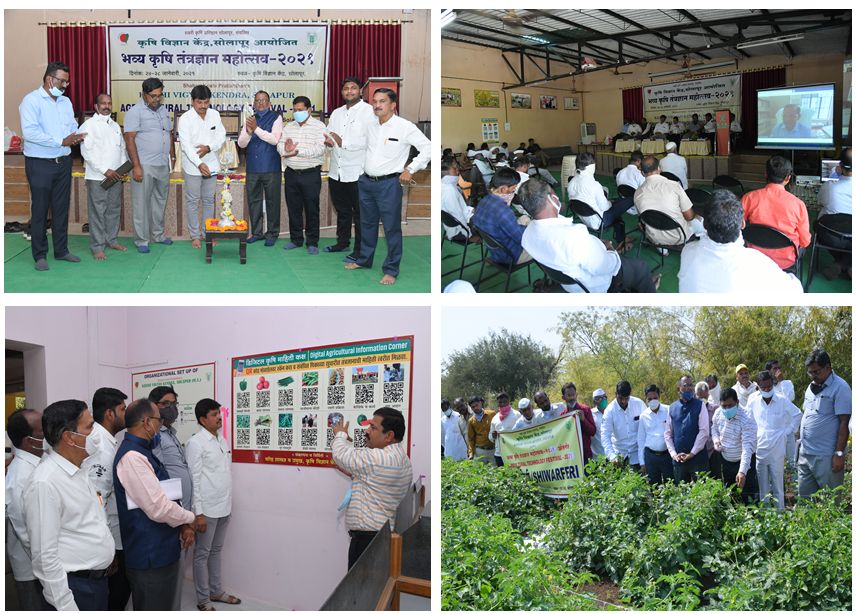 | | | KRUSHIK - Technology Week 2021 Live Demonstrations at KVK, Baramati began on 18.01.2021 | Shri Sharad Pawar, Member of Parliament (Rajya Sabha) & former Union Agriculture Minister, Govt. of India inaugurated the KRUSHIK Technology Week 2021-Live Demonstration on 18.01.2021 which is jointly being organized by KVK Baramati and ICAR-NIASM, Baramati. The Technology Week will continue up to 24th January 2021 at KVK Instructional Farm, Baramati and ICAR-NIASM, Baramati, Pune, Maharashtra. This year the KRUSHIK - Technology Week duration has been kept for 7 days with more focus on live demonstrations of agricultural technologies and machineries for farm mechanization, bullock operated machineries, demonstration of millets, value addition in pulses and oil seeds, use of hydro gel technology for maize, hydroponic and vertical farming, innovations hub. Keeping in view the importance of the development and growth of agriculture industry in the world and the present scenario & impact of COVID 19 situation, the KRUSHIK Technology Week 2021-Live Demonstration was inaugurated today on 18th January 2021 by Shri Sharad Pawar, Member of Parliament (Rajya Sabha) & former Union Agriculture Minister. The Technology Week will continue up to 24th January 2021 at KVK Instructional Farm, Baramati and ICAR-NIASM, Baramati, Pune, Maharashtra. This year the KRUSHIK - Technology Week duration has been kept for 7 days with more focus on live demonstrations of agricultural technologies and machineries for farm mechanization, bullock operated machineries, demonstration of millets, value addition in pulses and oil seeds, use of hydro gel technology for maize, hydroponic and vertical farming, innovations hub. In his speech Shri Sharad Pawar stated that this year Agricultural Development Trust, Baramati is celebrating Golden Jubilee. Initially we focused on agricultural technology and education. Late Shri Appasaheb Pawar extended the agriculture and education. Now Shri Rajendra Pawar, Chairman, Agricultural Development Trust, Baramati is focusing on technology. Now in India we should focus on millets and it's processing as wheat and paddy yield is high but the problem of marketing is existed. So there is need of processing of grains. In last 50 years we focused on activities like milk, fruit, soil testing, water conservation etc. Agriculture Minister Shri Dada Bhuse stated that in such COVID situation can take this event as an advantage also Agricultural Department Trust is working on initiative as 'Vikel Te Pikel'. He also focused that in Maharashtra Govt is planning to establish more than 5500 nurseries out of which 50% nurseries will be reserved for women farmers. He said that all 4 state agricultural universities may come together with KVK Baramati and replicate Baramati Agriculture Model in state. Dr. Trilochan Mohapatra, Secretary (DARE) and Director General, ICAR, New Delhi joined the meeting virtually. In his speech he stated all credit of drought action network goes to Shri Sharad Pawar ji. Initially this programme was started in each district of India to manage any drought situation and natural calamities. District contingency plan was re-casted and modified. Drought forecasting system developed by CRIDA but further data should be created. Experiences of NICRA may be useful. Micro irrigation, recharging ground water, more crop per drop, Jal Yukt Shivar programme are being focussed in Maharashtra. Implementation of drought action network will help in enhancing farmers' income. The programme started by visits of all dignitaries to the live demonstration plots, start ups & innovations, stalls of various agriculture companies, machinery stalls, stalls of food & hand crafts set up by Self Help Groups, An Indo-Dutch Project Centre of Excellence for Vegetables, Dry Land Agriculture Technologies at ICAR-NIASM, Baramati. After visit, all dignitaries joined Drought Action Netwrok (DAN) programme. Initially Shri Rajendra Pawar introduced the KRUSHIK 2021 activity. This year ADT Baramati is celebrating it's Golden Jubilee so ADT Baramati will work in new agricultural activities jointly with ICAR-NIASM. Initially a film of 50 Years journey was published by Shri Sharad Pawar. During the programme a MoU between Agricultural Development Trust, Baramati and Solidaridad Asia has been exchanged. Dignitaries include Shri Sharad Pawar, Member of Parliament (Rajya Sabha) & former Union Agriculture Minister; Shri Ajit Pawar, Deputy Chief Minister, Maharashtra; Shri Dadaji Bhuse, Minister of Agriculture; Shri Jayant Patil, Minister for Water Conservation, Maharashtra; Shri Shankarrao Gadakh, Minister for Soil & Water conservation, Maharashtra; Shri Dattatraya Bharane, State Minister Public Forests, Soil & Water Conservation, Animal Husbandry, Dairy Development and Fisheries; Shri Vishwajit Kadam, State Minister for Agriculture, Maharashtra; Mrs Supriyatai Sule, Member of Parliament (Baramati); Shri Rohit Pawar, MLA (Karjat-Jamkhed); Shri Eknath Dawale, Agriculture Secretary, Maharashtra State; Shri Dheeraj Kumar, Agricultural Commissioner, Maharashtra; Dr. Lakhan Singh, Director, ICAR-ATARI, Pune; Dr. Himanshu Pathak, Director, ICAR-NIASM, Baramati; Shri Rajendra Pawar, Chairman, Agricultural Development Trust, Baramati & other dignitaries. More than 4000 farmers and other stakeholders have visited the live demonstrations during technology week. | | 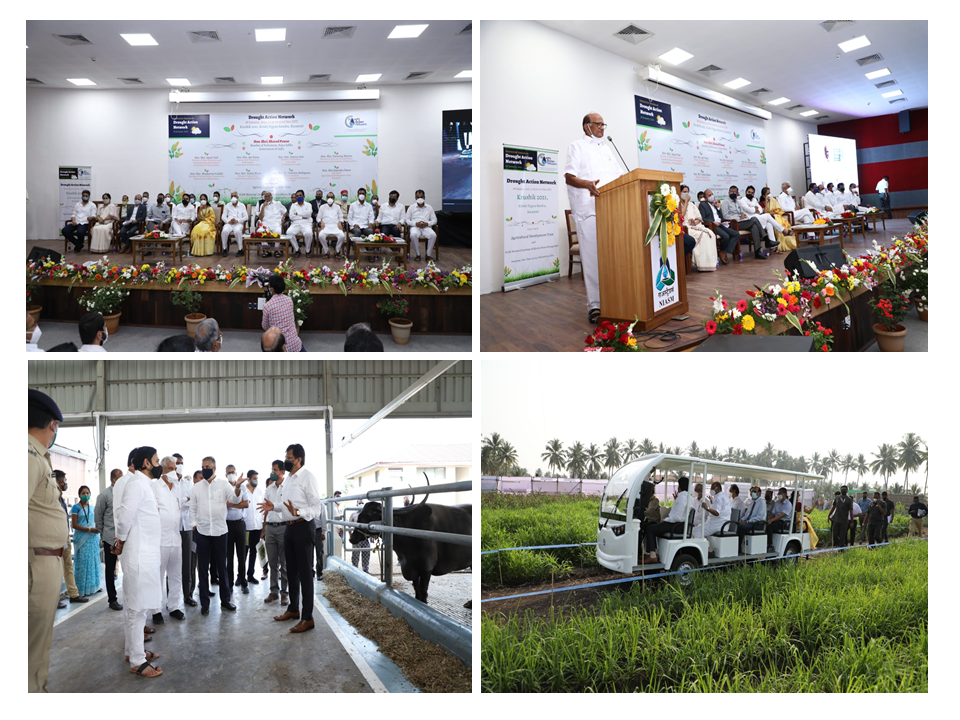 | | | High-Tech Cultivation of Vegetables and Grafting in Vegetables(Dutch Technology): Virtual Training at KVK Baramati | Krishi Vigyan Kendra, Baramati and ICAR-ATARI, Pune jointly organised a virtual training on 'Hi-Tech Cultivation of Vegetables & Grafting in Vegetables (Dutch Technology)' on 24.12.2020. In this programme, 49 Subject Matter Specialists (Horticulture) representing 36 KVKs of Maharashtra, 12 of Gujarat and 1 from Goa. Dr. Lakhan Singh, Director, ICAR-ATARI, Pune applauded the activities of Centre of Excellence for Vegetables at KVK, Baramati. He said that grafting technology is used in preparation of high-quality seedlings. Grafted seedlings are disease tolerant and high yielding. He highlighted about supply of 45 lakh grafted and non grafted quality vegetable seedlings to farmers; export of 350 MT vegetables (okra, chilli, bottle gourd, cluster bean and butternut); collaboration with 9000 farmers through FPOs/ FPCs linkages by the centre. The KVK Baramati is authorized training centre of National Horticulture Board, National Horticulture Mission, RAMETI & YASHADA and 1450 farmers have trained. He urged the KVKs for making protected cultivation farmers clusters and obtaining basic training at the Centre of Excellence for Vegetables at Baramati. As technical expert, Mr. Niek Botden, Holladdoor Cooperative U.A., The Netherlands, delivered a lecture on Greenhouse Cultivation System from Low to High-Tech. He also focused on importance of climate management, fertigation management and pest management during the crop production. His more focus was on producing more with less by using innovative technology, production knowledge and effective value chain concepts. Farmers' income can be increased by conversion from 'production-driven marketing' to 'market-driven production' with increased production, decreased fertilizer and chemical usage and increased post harvest management and value addition. Mr. Yashwant Jagdale, SMS (Horticulture), KVK Baramati focused on different technology interventions carried over under protected cultivation. His main emphasis was on demonstration of hi-tech vegetables production technology (soil less/hydroponics technology); research on soil less technology of vegetables production; Nutrient Film Techniques of cultivation for exotic leafy vegetable crops; aeroponics techniques of cultivation of exotic leafy vegetables. He elaborated about research under hi-tech forced ventilated polyhouse on production technology of vegetable crops; automatic fertigation management & development of fertigation schedule for protected cultivation of vegetable crops. Water recycling with the help of UV disinfection machine was also discussed Mr. Tushar Jadhav, Project Associate, Centre of Excellence for Vegetables guided participants on vegetable nursery management by Dutch technology and grafting techniques in vegetable crops. Dr. R.S. Jadhav, Head, KVK, Baramati shared experiences of successful entrepreneurs about high-tech vegetable cultivation. | | 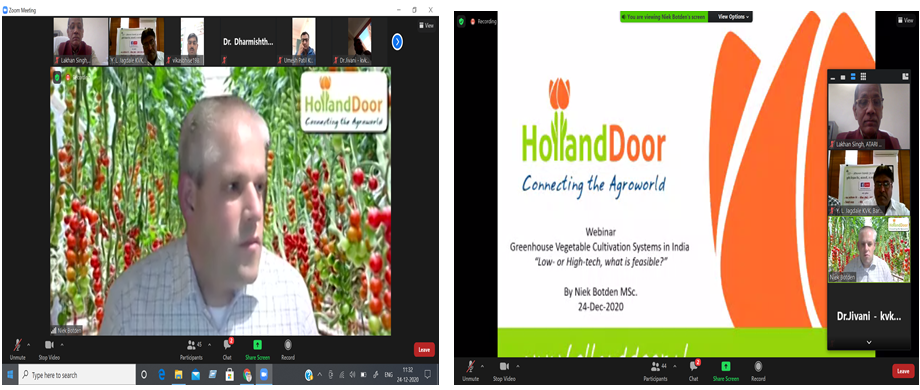 | | | Celebration of Swachhta Pakhwada at ATARI Pune on 16.12.2020. | Celebration of Swachhta Pakhwada at ATARI Pune started by taking Oath on 16.12.2020 for keeping surroundings neat and clean. The Director motivated staff to change thier mindset for joining the drive. | | 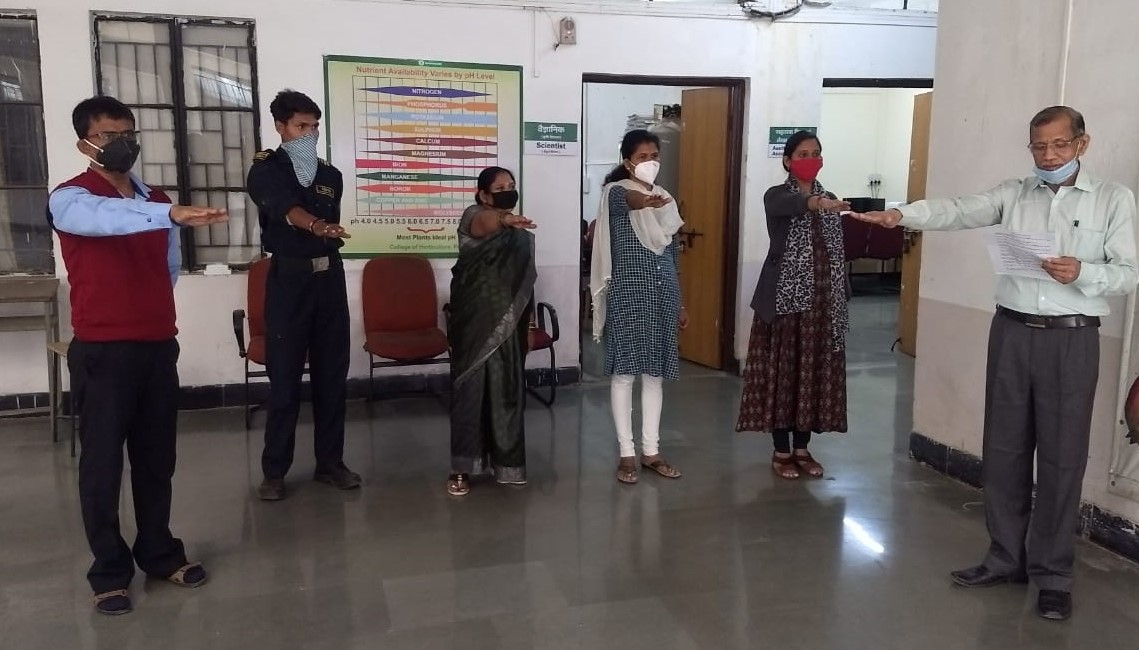 | | | Virtual Interaction Meet on Emerging Problems in Cotton with KVKs of Maharashtra Jointly Organised by ATARI Pune and CICR Nagpur on 1.12.2020 | A virtual interaction meeting with KVKs in Maharashtra was jointly organised by ICAR-ATARI and ICAR-CICR on emerging problems in cotton on 1st December 2020. Dr. Y G Prasad, Director, ICAR-CICR, Nagpur presented technologies ready for transfer for inclusion in on-farm trials, frontline demonstrations and mass extension campaign by KVKs. ICAR-CICR released four new Bt varieties which can be taken for demonstration to farmers in suitable agro-ecologies in Vidarbha and Marathwada. ICAR-CICR has standardized agronomy package for long-linted arboreum varieties which are ready for large scale demonstrations in Marathwada in collaboration with Vasantrao Naik Marathwada Krishi Vidyapeeth (VNMKV), Parbhani and KVKs. Dr. Lakhan Singh recalled the joint campaign for management of Pink Bollworm (PBW) in cotton since 2017 by involving all stakeholders. The purpose of meeting was to take stock of the emerging pest and disease problems faced by cotton farmers and to develop a concrete action plan for next season in consultation with ICAR-CICR experts. KVKs are to take immediate campaign against the extension of cotton crop season in view of prevailing PBW and Boll rot infestation. Also trapping of adults moths emerging in ginning mills are to be promoted with the support of State Department of Agriculture. Earlier, KVKs of Yavatmal, Jalna and Nandurbar districts presented report on crop condition prevailing in the three regions of Maharashtra and highlighted emerging issues of concern. Dr. D. T. Nagarale, Scientist (Plant Pathology), Dr. V. S. Nagarare, Principal Scientist (Entomology), Dr. G. I. Ramkrushna, Scientist (Agronomy), Dr. J. H. Meshram, Principal Scientist (Plant Physiology) and Dr. A. R. Reddy, Principal Scientist (Agri. Economics) interacted with KVKs on pest and disease, nutrient and crop canopy management and need for production system diagnostic surveys. The virtual interaction was attended by Heads of Divisions/Sections of ICAR-CICR, Nagpur and KVKs along with 85 Subject Matter Specialists. Dr. S. M. Wasnik, Head, KVK, Nagpur coordinated the virtual interaction meet. | | 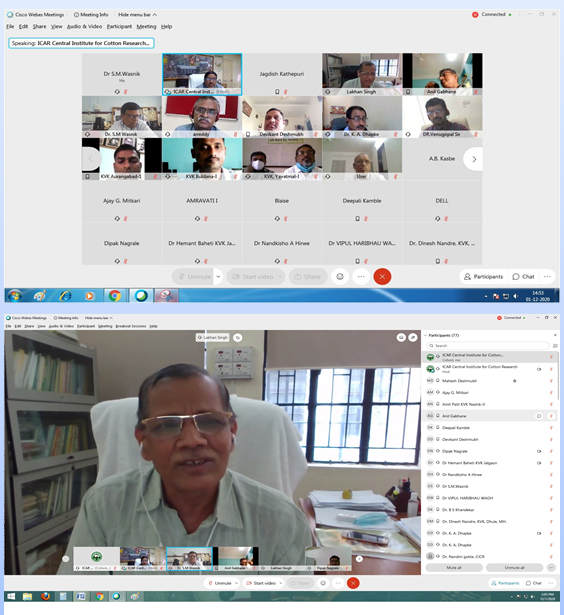 | | | Chairman, Rashtriya Kamdhenu Aayog Inaugurated Sensitization Workshop on Transforming Animal Husbandry Sector on 28.11.2020| ICAR-Agricultural Technology Application Research Institute (ATARI), Pune and KVK Kolhapur-II jointly organised 'Sensitization Workshop on Transforming Animal Husbandry Sector' on 28th November, 2020 in virtual mode. As Chief Guest, Dr. Vallabhbhai Kathiria, Chairman, Rashtriya Kamdhenu Aayog urged the KVKs to establish holistic indigenous cow demonstration unit at the centre. He mentioned that there is lot of scope for entrepreneurship and employment generation in animal husbandry. Animal husbandry sector has strength to raise farmers' income on regular basis. Cow based economy is helpful for sustainable agriculture. He said that during COVID-19 pandemic situation, animal husbandry contributed significantly for livelihood security. Dr. Kathiria urged the KVKs to sensitize farmers about use of biopesticides/biofetilizers prepared from cow dung and urine. His major concern was on development of various economic and sustainable models on desi cow in various dimensions such as milk production, biofetilizers production. Dr. Kathiria also mentioned about the marketability of cow dung and urine based panchgavy products may be linked to FPOs. Benefits of developmental schemes should be trapped by the KVKs by submitting proposals from different agencies of adopting public-private partnership mode with NGOs/institutions. At least 100 KVKs should come up to keep at least 10 indigenous cows, he concluded. An e-publication 'Developmental Schemes of Animal Husbandry Sector' brought out by ATARI Pune was also released by the Chief Guest. Dr. A.K. Singh, Deputy Director General (Agricultural Extension), ICAR, New Delhi in his address stressed upon establishment of extension network for strengthening of animal husbandry sector by integrating various stakeholders such as entrepreneurs, incubators, different ICAR institutes for developing an alarming system for any type of epidemics throughout the country. A group of animal husbandry experts in KVKs should be linked with research institutes and SAUs at national level. Diagnostic services should also be provided by animal science experts. The DDG also mentioned to develop fodder development banks and fodder cafeteria at KVKs. Dr. Singh raised the concern for hygiene practices being followed for milking and need to follow proper hygiene practices. Suitable proposals may be submitted to the Commissioner Animal Husbandry, Maharashtra to obtain financial support for establishing indigenous cow demo unit, value addition and incubation centre. Different bio formulations, panchgavya and jeevamrat etc. should be standardized. Dr. B.N. Tripathi, Deputy Director General (Animal Sciences), ICAR, New Delhi expressed a need to develop different economy model for animal husbandry sector and demonstrate various proven and location specific technologies to the farmers. His main emphasis was on following different veterinary practices such as proper vaccination, deworming and providing area specific mineral mixture. He suggested the KVKs to develop more number of entrepreneurs in animal husbandry sector. P.P. Adrushya Kadsiddheshwar Swami ji, Chairman, Krishi Vigyan Kendra, Kolhapur-II urged the KVK to demonstrate best of technologies of organic farming. Swami ji stressed upon development of different cow urine and dung based bio products for farming. He highlighted the role of different bio formulations such as jeevamrut, Gir gokrupa amrutam for farmers and their effectiveness in organic farming. His more focus was on development of different panchgavy products for general use in life, linking the organic farmers to FPOs for better and specialised market. Dr. N.H. Kelawala, Vice Chancellor, Kamdhenu University, Gujarat have thrust on genetic improvement of indigenous breeds with the help of sex sorted semen of highest quality and artificial insemination. He highlighted the need of management of stray animals, increasing the number of female cattle in herd, use of area specific mineral mixture, proper vaccination and deworming practices. Ethno-veterinary garden should be developed at the KVK. Dr. A.M. Paturkar discussed about featured problems of animal husbandry sector for profitable ventures. His focus was on linking all the KVKs with MAFSU, Nagpur for technological backstopping in veterinary science. Shri S.P. Singh (IAS), Commissioner Animal husbandry, Maharashtra state dealt various government schemes for the welfare of farmers. Shri Singh focused on holistic development of animal husbandry sector leading to produce more income generating options for farmers. There is less influence of climate change on livestock. Low cost technologies, rejuvenating animal husbandry sector, making it as primary source of income were highlighted. Dr. V.P. Chahal, ADG (Agricultural Extension), ICAR guided the KVKs to showcase the best practices in animal husbandry and using social platform for quick knowledge sharing. Model KVK should be visited by a group of Subject Matter Specialists to get exposed. Dr. Lakhan Singh, Director, ICAR-ATARI, Pune highlighted the role of animal husbandry sector in sustainable agriculture, developing livestock based integrated farming system models, and regular source of income to the landless and small farmers. Livestock should be developed as business model with visualizing the market. More than 450 Heads, Subject Matter Specialists, Programme Assistants of KVKs and Field Functionaries across India were participated in virtual mode. All Directors/Principal Scientists of 11 ATARIs and Principal Scientists from ICAR Headquarter were also participated in the workshop. | | 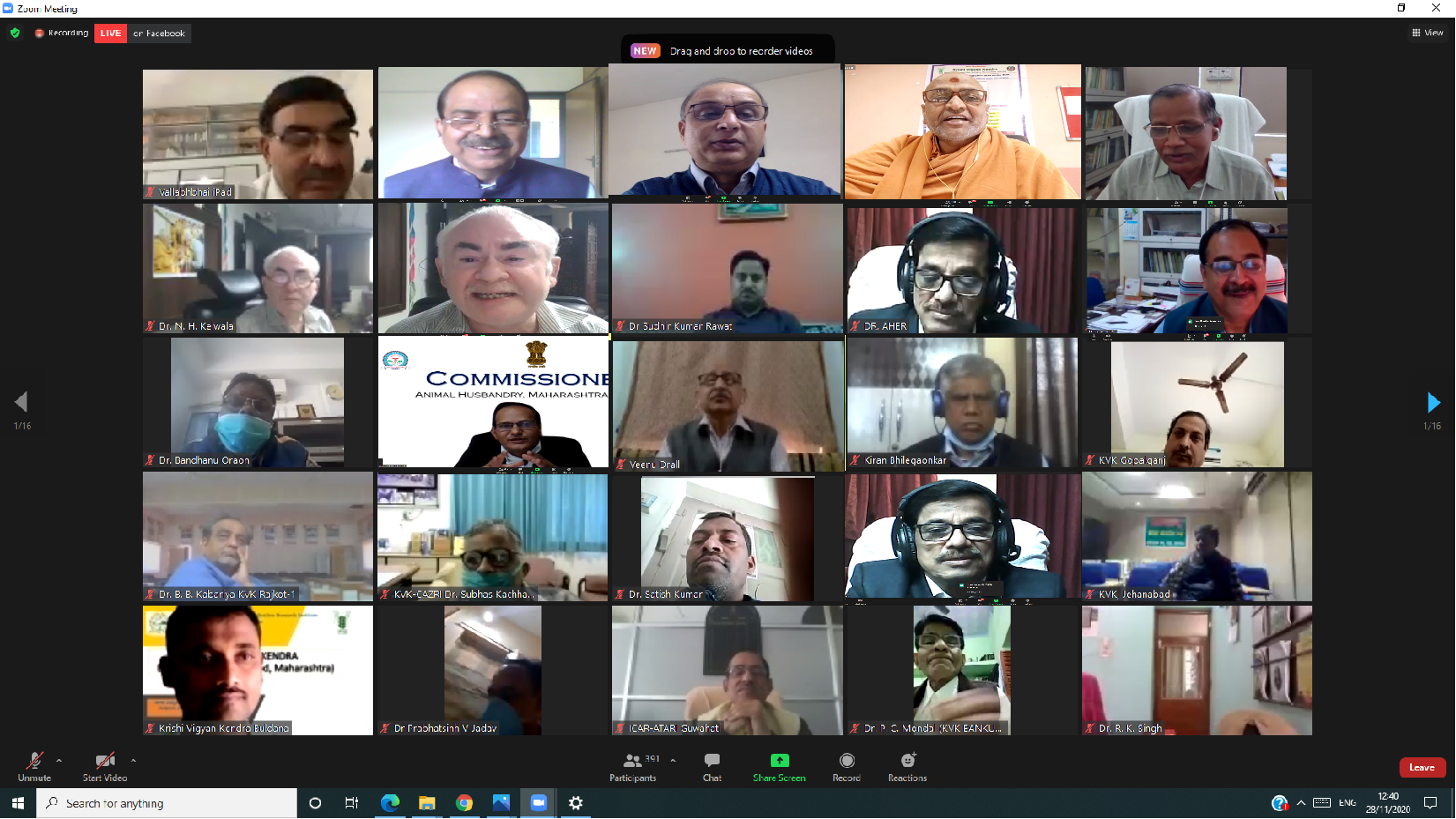 | | | Virtual Rabi Kisan Mela organised by KVK Jalna-I in Maharashtra on 5.11.2020| Virtual Rabi Kisan Mela and 279th monthly seminar of Krishi Vigyan Mandal was organised by Krishi Vigyan Kendra, Jalna-I in Maharashtra on 5th November, 2020. The Chief Guest, Dr. R.B. Deshmukh, Ex-Vice Chancellor, MPKV, Rahuri applauded the innovative works of the KVK, Jalna and ATARI, Pune especially popularising the pulses production technologies through frontline demonstrations in the zone. In his presentation, he highlighted the scope and importance of chickpea, latest varieties, suitability of varieties in different agro-climatic conditions, measures to improve the production potential like water management, fertilizer management, pest and disease management in depth. He mentioned some popular varieties like Vijay, Digvijay, Phule Vikram, Phule Vikrat, Akash, JAKI-9218 to be adopted by the farmers in Maharashtra. Shri Vijay Borade, Trustee, MSSM and Project Director, KVK, Jalna-I mentioned that this webinar is very timely organised and will be useful to the farmers as the sowing of chickpea and wheat are in progress. He appreciated efforts of Wheat Research Station, Niphad for its contribution in development of rust tolerant, drought tolerant and heat tolerant varieties of wheat for Maharashtra. He appreciated role of KVKs to popularise pulses crops on the background of climate change. Dr. Lakhan Singh, Director, ICAR-ATARI, Pune urged the KVK to maintain the consistency and commitment of Krishi Vigyan Mandal (KVM) activity which is unique example of extension mechanism with farmers initiative. The programmes like sericulture, bamboo cultivation, goat and poultry farming etc. being implemented by KVK are supportive for small and marginal farmers in adverse climatic condition. He also mentioned about doubling farmers income, intercropping of pulses with cotton, mass trapping for pink boll worm being implemented by KVK in convergence mode. Benefit of new agriculture bills should be harnessed by the farmers. Dr. Suresh Dodke, Wheat Specialist, MPKV, Rahuri imparted information on improved wheat production technology. He appealed farmers to choose the varieties based on water availability, soil type, timely or late sown condition. He mentioned some latest varieties like Phule Satwik specially developed for biscuits and cakes, Tryambak, Netravati, Tapovan, UAS-6222, MACS-6478, Phule Samadhan, Raj-4078 for timely sown condition; AKW-4627, PDKV-Sardar for late sown condition; Godawari, UAS-415, MACS-3949 for better chapatti making. Dr. S. V. Sonune, Head, KVK, Jalna-I gave focus on utilising quality seed and planting materials. Under Pulses Seed Hub, 45q of foundation seed and 100q certified seed of chickpea are available for the farmers. More than 200 farmers participated in the virtual rabi kisan mela. | | 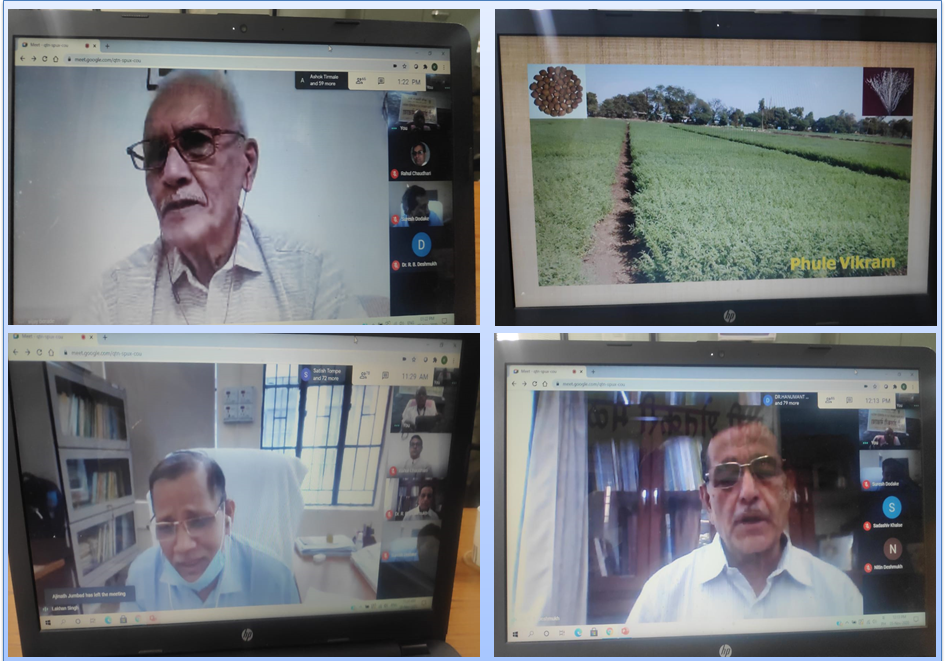 | | | Krishi Tantragyan Mahotsav Began at KVK, Nandurbar on 2.11.2020| Krishi Tantragyan Mahotsav (Agriculture Technology Week) was inaugurated at Krishi Vigyan Kendra, Nandurbar on 2.11.2020. In this programme, different activities crop conferences, agriculture allied enterprises and exhibition of improved farm implements have been organised. It is organized in offline as well as online mode. As Chief Guest, Dr. Lakhan Singh, Director, ICAR-ATARI, Pune addressed the farmers in virtual mode. He appreciated the KVK, Nandurbar for initiation as well as extension of novel concept of Shetkari Suvidha Kendra (Farmers Facility Centre) to cater the needs of technology products for the farmers at village level. He noted the remarkable works of KVK in nutrition garden, conservation of biodiversity, doubling of farmer's income and brooding concept in poultry. Dr. Singh asked the farmers to adopt integrated farming system models to attain maximum profit from available resources. He suggested that KVK should document the success stories of the farmers and popularize among farmers. He further suggested that KVK should be model as knowledge and resource centre for farmers. He urged the farmers to get benefit by using new agriculture bills. Shri K.K. Patil, Chairman, Dr. Hedgewar Seva Samiti, Krishi Vigyan Kendra, Nandurbar suggested the farmers for crop diversification. He also asked the farmers to adopt improved technologies for doubling the income from farm activities. Dr. Anant Pote, DSAO, Nandurbar suggested the farmers for adopting collective marketing strategy and strengthening farmers producer company. His major concern was on to adopt integrated crop management, suitable farm mechanization and value addition in millet crops. Dr. Vinod Kumar, Scientist, IGFRI Sub Centre, Dharwad stressed upon to follow latest fodder production technologies enriching animal husbandry. The fodder production and processing could be an enterprise for small and marginal farmers. Shri K.R.Vasave, Officer from Khadi Gramodyog guided the farmers about bee keeping. Shri R.S. Dahatonde, Senior Head, KVK, Nandurbar briefed and narrated about agriculture technology week. In total, 135 farmers participated in the programme. The programme will be continued till 7th November, 2020. | | 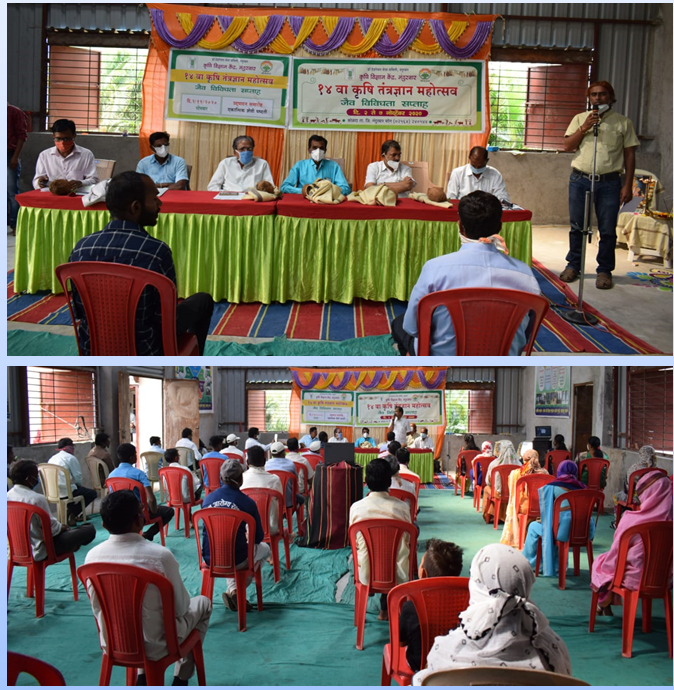 | | | Vice Chancellor, NAU, Navsari Inaugurated the Awareness Programme on Farm Acts for Farmers of Gujarat on 30.10.2020| ICAR-ATARI, Pune and KVK, Navsari jointly organized a state level webinar for creating awareness on Farm Acts-2020 on 30.10.2020. Dr. Z.P. Patel, Vice Chancellor of Navsari Agricultural University, Navsari expressed his view on Farm Act-2020. He appealed to all the farmers to accept and follow the agriculture bills for their concern. It is implemented at right time for the right cause for making farming more remunerative and giving freedom to trade their farm produce across the states. Mrs. Amitaben Patel, District President, Navsari narrated benefits of Farm Act 2020. She told that farmers will get guaranteed price for their produce that will reduce the risk of the farmers. Her major concern was on empowering farm women on the agriculture bills and joining hands for constituting farmers producers organizations. Dr. Lakhan Singh, Director, ICAR-ATARI, Pune urged all the KVKs to make more awareness on new Farm Acts by using different social/digital platforms in local language. His main focus was on highlighting the online trading, assured prices, quick payment, freedom to trade, ownership of the farmers on their produce, more flexible system, created additional marketing channels to the farmers, etc. Dr. K.A. Patel, Director Extension Education, NAU, Navsari gave orientation about programme and motivated the farmers to link with KVKs and SAUs for obtaining more information about different national and state level developmental schemes. Experts Mr. Vinod Desai, Chartered Accountant, Navsari and Dr. C.K. Timbadia, Head, KVK, Navsari explained in depth about Farm Acts- 2020. More than 200 farmers were joined virtually and got oriented about new farm bills. | | 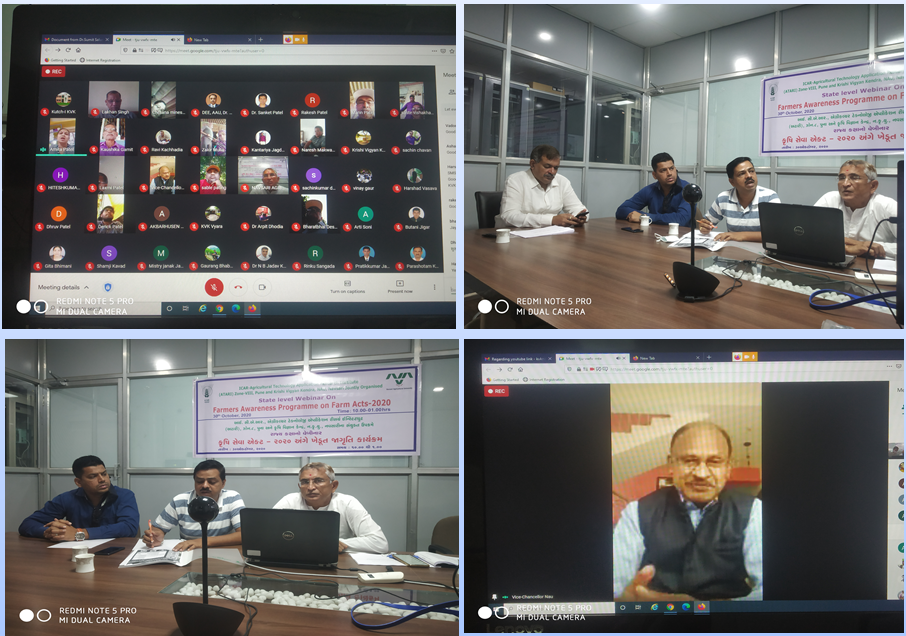 | | | ATARI, Pune Organized State Level Webinar: Farmers Awareness on Farm Acts-2020 on 28.10.2020 | The ICAR-Agricultural Technology Application Research Institute, Pune, Maharashtra organized a one-day Webinar on "Farmers Awareness Programme on Farm Acts-2020" today. The webinar was jointly organized in collaboration with the Krishi Vigyan Kendra, Pune-II and Krishi Vigyan Kendra, Kolhapur - II, Maharashtra. In the inaugural address, Dr. Y.R. Meena, Additional Commissioner (Extension), Ministry of Agriculture & Farmers Welfare, Govt. of India urged the farmers to adopt the new farm bills and its positive effects on welfare of farmers. Dr. Meena stressed upon providing more information through various advertisements. He briefly explained these new farm bills and provided clarity on each agriculture bill. He also elaborated the agriculture infrastructure fund for new farm bills integrating the welfare of farmers. He highlighted the new farm bills and its utility in commerce and marketing and clarifies the myths for new bills. Dr. S.S. Tomar, Additional Commissioner (Crops), Ministry of Agriculture & Farmers Welfare, Govt. of India emphasized on welfare of the farmers with the help of new farm bill-2020. His major concern was on reaching the objective of doubling the farmers' income with the help of different facilities in marketing and marketing reforms. Dr. Tomar also urged the farmers to make more clarity on these different farm bills 2020. Dr. Lakhan Singh, Director, ICAR-ATARI, Pune gave emphasis on utility of these new farm bills 2020 for empowering farmers. He urged the farmers to get clarity on these farm bills in simulation with KVKs in their areas and other line departments. He motivated the farmers to come forward for having more clarity about new farm bills in consultation with KVKs. He also requested the KVKs to provide more information to farmers through awareness programmes, campaigns and using social platforms. Dr. L.R. Tambade, Head, KVK, Solapur-I briefed about the Farmers Produce Trade & Commerce (Promotion & Facilitation Act) 2020 and its utility and wide open opportunities for farming community. Several doubts of the farmers were cleared by him. Providing hurdle free market will be helpful to the farmers. Shri Vinod G. Desai, Chartered Accountant, Navasri (Gujarat) explained each component of the Farmers Agreement on Price Assurance & Farm Services (Dispute Resolution), Act, 2020 and Farmers Empowerment & Protection Agreement on Price Assurance & Farm Service (Dispute Resolution Rules), 2020 for farmers and clarifies on legal and commercial point of view on these new farm bills. A total of 200 farmers actively participated in the webinar. | | 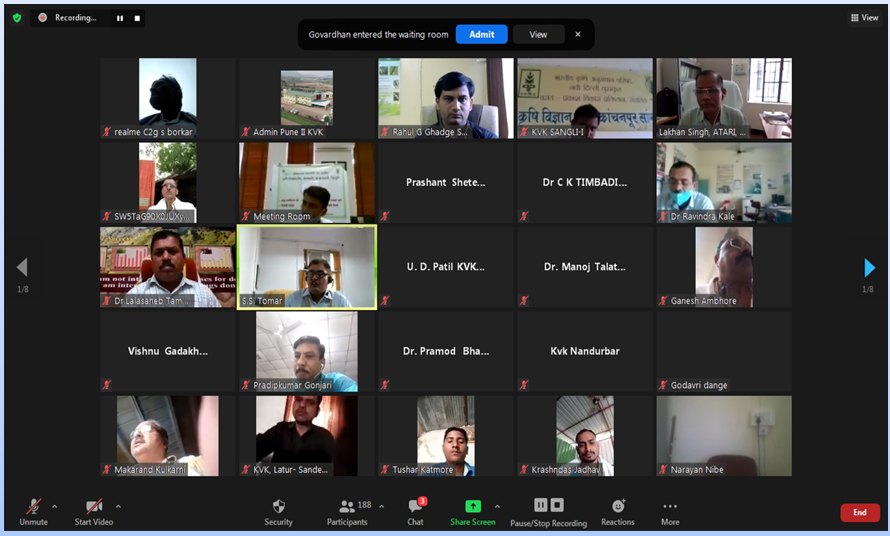 | | | Rabi Season Mela Organised by KVK, Osmanabad (Maharashtra) on 26.10.2020 | Krishi Vigyan Kendra, Osmanabad, Maharashtra organized the Rabi Season Mela for the farmers. Dr. Lakhan Singh, Director, ICAR-ATARI, Pune urged the farmers of Osmanabad district for using quality seed of oilseed, pulse and cereal crops. Integrated Farming System for doubling farmers' income and drought mitigation technologies like broad bed furrow technique were suggested. His major concern was on use of biofortified nutri-cereal crops and adopting organic farming. He stated that post harvest processing and value addition of crop produce is helpful for attaining higher income. Farmers were oriented about Farm Act that will bring revolutionary change in lives of farmers. Dr. D.B. Deosarkar, Director, Extension Education, Vasantrao Naik Marathwada Agricultural University, Parbhani suggested farmers to adopt crop production technologies like use of improved and short duration varieties, seed treatment, BBF technology. He motivated the farmers to increase the area under oilseed crops in the district. Dr. Vasant Suryawanshi, Extension Agronomist, RAEEC, Ambejogai advised to adopt Panchsutri programme for quality and higher production of wheat and safflower. Prof. Arun Gutte, Extension Agronomist, RAEEC, Latur delivered a lecture on cultivation practices of chickpea through seed treatment, water management, integrated fertilizer management, integrated pest management. Er. Sachin Suryawanshi, Head, KVK, Osmanabad briefed about the district's major crops grown in rabi season and shared water management technologies. Prof. Apeksha Kasbe, SMS (Agronomy) oriented the new released, high yielding varieties of safflower, wheat and chickpea. In total, 98 farmers virtually participated in the Rabi Season Mela. Shri Vinod G. Desai, Chartered Accountant, Navasri (Gujarat) explained each component of the Farmers Agreement on Price Assurance & Farm Services (Dispute Resolution), Act, 2020 and Farmers Empowerment & Protection Agreement on Price Assurance & Farm Service (Dispute Resolution Rules), 2020 for farmers and clarifies on legal and commercial point of view on these new farm bills. A total of 200 farmers actively participated in the webinar. | | 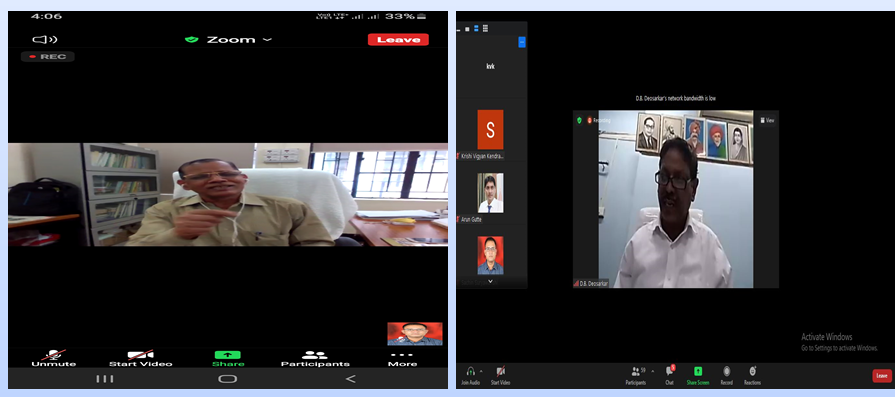 | | | Online Training on Vegetables and Medicinal Plants for Nutritional Gardening organized under ICAR Farmer FIRST programme on 26.10.2020| Farmer FIRST Centre, MPKV, Rahuri organized one day online training on 'Vegetables and Medicinal Plants for Nutritional Gardening' in coordination with District Rural Development Agency, Zilla Parishad, Ahmednagar. More than 100 farm women from Chinchvihire and Kangar villages were participated in virtual mode. As Chief Guest, Dr. Lakhan Singh, Director, ICAR-ATARI, Pune highlighted the significance of Poshan Vatika at each household level. He said that awareness to all the farm women and children in whole village should be created. Linkage with schools, angawadi workers, nearby KVK, NGOs, FPOs and other agencies should be strengthened. Nutri-rich crops and varieties should be incorporated in existing cropping systems. Use of nutrimix produce is very much needed. He further said that integration and enrichment of nutritional properties in our food is required. Dr. S.R. Gadakh, Director of Research and Extension Education, MPKV, Rahuri presided over the programme. He stressed the need for vegetable and medicinal plants kitchen gardening especially for regular supply of the nutritious and residue free produce for daily consumption. The cost towards purchase of vegetables could also be saved, he said. Medicinal plants like aonla, shatawari, adulsa have significant medicinal properties which could be cultivated in kitchen gardening. Dr. P. B. Kharde, Principal Investigator, Farmer FIRST Programme at the outset gave the welcome and introductory remarks. He said that adopted villages have been converted into model villages. Income generating enterprises for landless, marginal and small farmers have started their regular earning. Professors/Associate Professors of MPKV, Rahuri delivered lectures on vegetables and medicinal plants cultivation considering concept of nutritional gardening. Dr. S.S. Sadaphal, Co-PI, Farmer FIRST and Shri Vijay Shedge, SRF coordinated the programme. | | 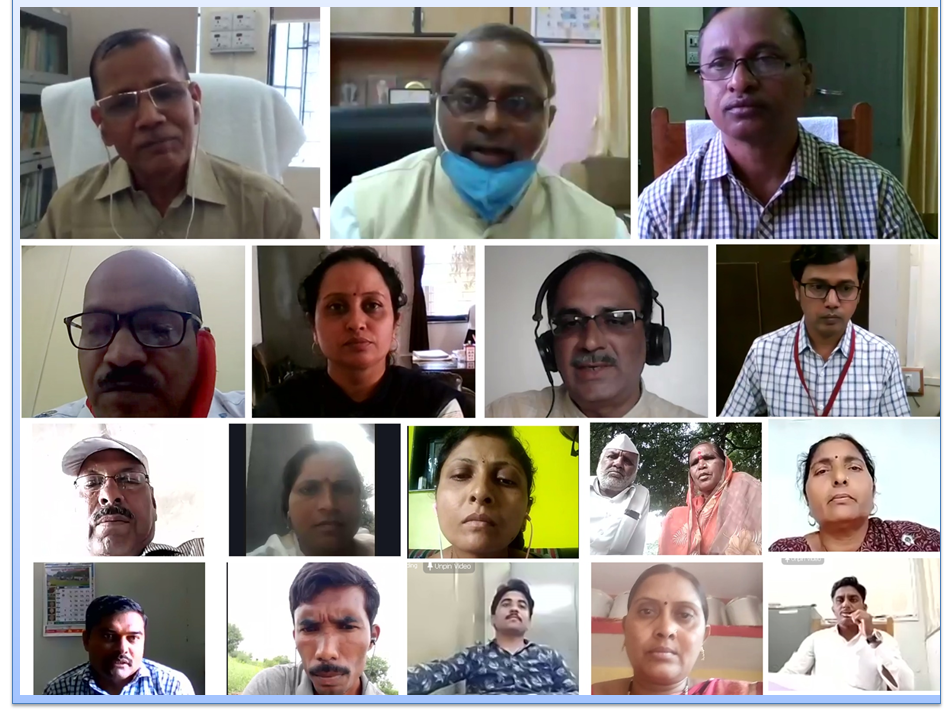 | | | Rabi Crops Mela and Agriculture Technology Week Organized on 20.10.2020| Krishi Vigyan Kendra, Jalna-II, Maharashtra organized Farmers-Scientists Forum and Rabi Crops Mela on 20th October, 2020 in virtual mode. Dr. Lakhan Singh, Director, ICAR-ATARI, Pune was the chief guest. His major concern was to develop this newly created KVK in to model KVK. It can be possible by creating functional demonstration units, making instructional farm exemplary, demonstrating latest technologies addressing varied agro-ecologies of the district, building strong linkage and convergence with other organizations. He urged to give more focus doubling farmers' income, crop diversification, post harvest processing, value addition, drought mitigating technologies and skill development, organizing farmers etc. He stressed to provide quality seed of Parbhani Moti, Parbhani Super Moti, Parbhani Jyoti of rabi sorghum; BDN-797, BDNGK-798 of chickpea to the farmers. An innovative mechanism to make regular interaction with farmers at KVK level should be created. Dr. D.B. Deosarkar, Director Extension Education, VNMKV, Parbhani in his presidential address suggested adopting BBF technology by the farmers for chickpea cultivation. Climate resilient technologies were advocated by him. He said that the KVK has fixed date of 20th of each month for organizing farmers-scientists forum to provide technology solution to the farmers. Dr. S.B. Pawar, Associate Director Research, NARP delivered lecture on rabi sorghum cultivation technology and management practices to be followed in pigeonpea. Prof. A.V. Gutte, Extension Agronomist, RAEEC, Aurangabad advised the farmers about chickpea cultivation practices and management practices to be followed in cotton. Dr. S.D. Somwanshi, Head of KVK Jalna-II gave brief introduction and brief planning for rabi crops. Agriculture Technology Week was inaugurated by KVK, Palghar on 20.10.2020. Dr. Lakhan Singh, Director, ICAR-ATARI Pune inaugurated the programme. He said that Phule Vikram variety of Chickpea and Konkan Wal-1 and Konkan Wal-2 varieties of Wal should be provided to the farmers. He urged the farmers to give focus on value addition in sapota through farmer producers' organization. Bee keeping, horticulture nursery, mushroom cultivation, reducing cost of cultivation, poshan vatika need to be focused. Dr. Sanjay Bhave, Director of Extension Education, Dr. Balasaheb Sawant Konkan Krishi Vidyapeeth, Dapoli addressed on importance of medicinal plants, millet crops which require value addition. Shri Kashinath Tarkase, SAO, Palghar shared information about crop insurance schemes. Farmers should communicate SDAO & TAO office and apply for the same. Udyan Pandit Shri Vinayak Bari informed about the existing situation of sapota growers. Dr. G. Rajender Reddy, Director, MGM institute, Aurangabad and Gokhlae Education Society addressed on IFS and suggested that KVK should motivate them towards IFS to get more income in less area. Dr. Reddy suggested that farmers should more focus on water harvesting, water budget to stop excess exploitation of natural resources. He guided about biofortified varieties, millet productions for the eradication of malnutrition in tribal areas of Palghar district. Dr. Reddy shared experiments in multi-layer farming which could be help to the marginal farmers to get maximum profit. The Agriculture Technology Week will continue till 23.10.2020. More than 200 farmers joined technology week in virtual mode. | | 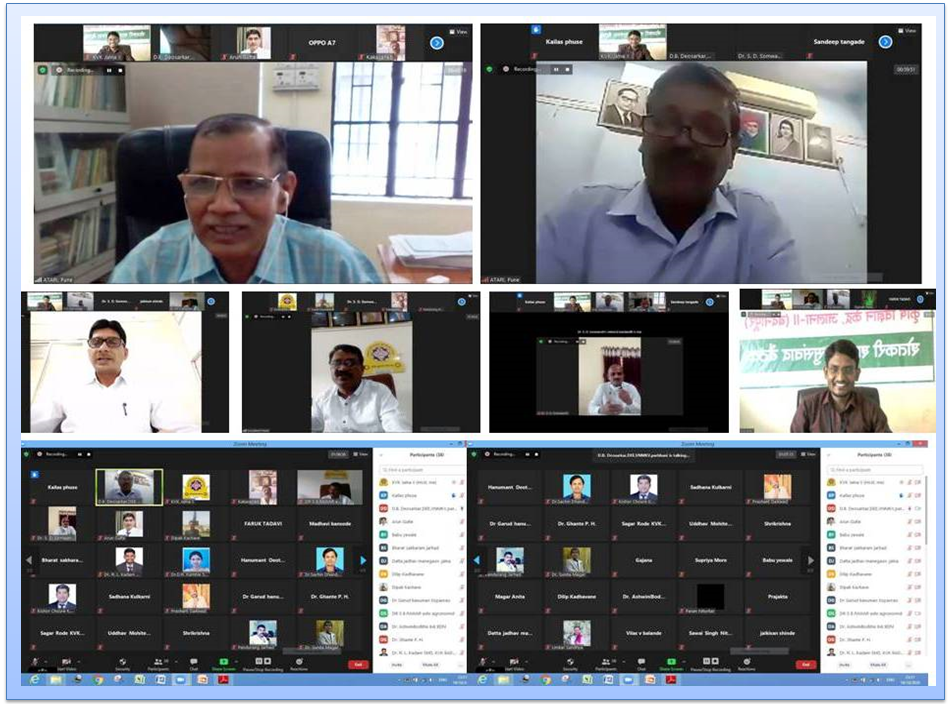 | | | Dr. Trilochan Mohapatra, Director General, ICAR Inaugurated Webinar on Mahila Kisan Diwas Organised by ICAR-ATARI, Pune on 15.10.2020| The ICAR-Agricultural Technology Application Research Institute, Pune, organized a one-day Webinar on "Women Farmers: Engineered a New Age Farming Transformations' on the occasion of Mahila Kisan Diwas on 15.10.2020. This webinar was jointly organized in collaboration with the Krishi Vigyan Kendra, Pune-II and Krishi Vigyan Kendra, Kolhapur-II, Maharashtra. In total, 590 farm women and Subject Matter Specialists (Home Science) attended the programme across the country. In his inaugural address, Dr. Trilochan Mohapatra, Director General (ICAR) highlighted the impeccable works of farm women in India. He urged the KVKs to develop the database of women in farming and service sector of agriculture. He suggested organising more awareness programmes about balanced food and different components of malnutrition. Getting right information on balanced food for farm women, children, adolescent boys and girls are essential. A strategy plan should be developed for reaching at household level towards implementing food and nutritional security programmes including poshan thali and nutrition garden etc. His major concern was on gender mainstreaming and drudgery reduction among farm women. Dr. Mohapatra emphasized on empowering rural women and creating various income generating options. He expressed that international conference with deliberations with experts should be planned in virtual mode Dr. Ashok Kumar Singh, Deputy Director General (Agril Extension), ICAR applauded the role of KVKs for empowering farm women. His major focus was on identifying malnutrition problem in women and children, food consumption pattern, bio-fortified crops/varieties. Dr. Singh urged the KVKs to more nutrition garden models, poshan thali, orienting aanganwadi workers, taking it in campaign mode for producing quality food, round the year producing vegetables and nutritional security. He said that 703 KVKs organized training/awareness programmes for nutri-thali/poshan thali concept on 17 September 2020. Dr. Singh also emphasized on working for sustainability of different farming systems, combating malnutrition at household especially in rural areas, understanding climate change and its impact should be addressed at large scale linking with nutrition and at ground level. It should be into action with the efforts of KVKs and other institutions/Ministries. Dr. (Mrs.) R.V. Bhavani, Director (Agriculture-Nutrition-Health), MS Swaminathan Research Foundation, Chennai urged to address the problem of malnutrition in rural areas. She cited a case study of Wardha highlighting dietary pattern, nutrition deficiency, undernourished problem in children and women. She emphasized on growing bio fortified crops for eating the balanced quality foods. Her major concern was to address the onsite nutrition dimensions, dietary diversity, developing farming system for nutrition model and organising farm women to become Kuposhanmukt Bharat. Dr. Lakhan Singh, Director, ICAR-Agricultural Technology Application Research Institute, Pune highlighted the various initiatives of women entrepreneurs in every sector of agriculture especially in marketing and establishing Farmer Producer Organizations (FPOs). Dr. Lakhan Singh also urged the KVKs to develop more number of women entrepreneurs and helping to build the Aatmnirbhar Bharat. His emphasis was on capacity building and regular orientation towards new social initiatives for women farmers. Mrs. Swati A. Shingade, a woman entrepreneur urged the women farmers to put their efforts for group based farming. She emphasized on developing Farmer Producer Organisations (FPOs) for better market linkage for organic as well as other farm produce. She urged the women to utilise their inner strength. | | 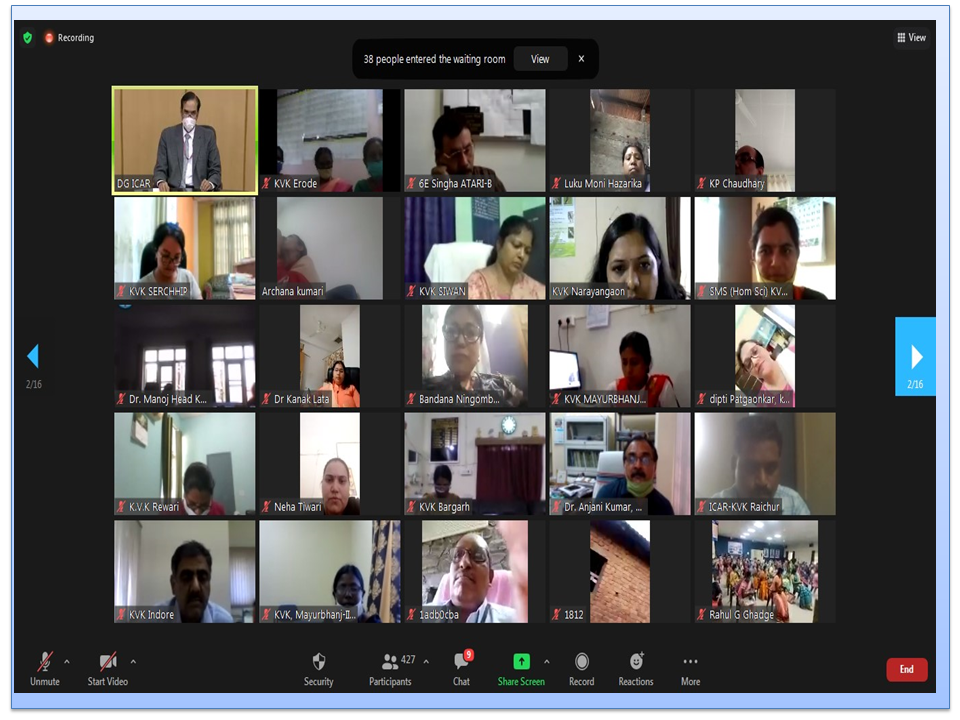 | | | ATARI, Pune Organized e-Talk on Digital Platforms for Effective Outreach on 29.8.2020| The ICAR-Agricultural Technology Application Research Institute, Pune, organized a one-day e-Talk on 'Digital Platforms for Effective Outreach' today. This e-Talk was jointly organized in collaboration with the Krishi Vigyan Kendra, Pune-II and Krishi Vigyan Kendra, Kolhapur-II, Maharashtra. In his inaugural address, Dr. A.K. Singh, Deputy Director General (Agril Extension), ICAR urged the participants to follow pull method and synergising different digital platforms. He said that KVKs have shown their most utility of social media during COVID-19 pandemic and helped the advisory and need based solutions. Dr. Lakhan Singh, Director, ICAR-Agricultural Technology Application Research Institute, Pune gave emphasis on use of social media for reaching the last mile of the villages. Dr. Singh highlighted the various efforts done by the KVKs of Maharashtra, Gujarat and Goa in use of different digital platforms such as development of different mobile apps, use of Facebook, Whatsapp, YouTube and messaging facilities for need based advisory. Dr. Singh guided the participants about the effective use of social media in online marketing especially for Farmer Producer Organisations (FPOs). Dr. Lakhan Singh also urged the KVKs to develop the mechanism to reach maximum farmers of the district with the help of various social media in this pandemic situation of COVID-19. He advised the KVKs for capacity building of farmers, regular orientation towards new social media intervention with especial focus to young entrepreneurs and farmers. Dr. Saravanan Raj, Director, Agricultural Extension, MANAGE, Hyderabad talked about different social media utilization for extension advisories for farmers. Dr. Saravanan dealt the status of penetration of different social media in rural and urban areas of India. He highlighted the different need based use of Facebook, Whastapp Groups, YouTube, AESA blog, Different knowledge portals for getting information on agriculture and allied activities. Dr. Saravanan focussed on basics of digital publication for extension functionaries and provide a skill to farmers for taking pictures and videos for effective sharing with others and on different social media. Dr. Rajarshi Roy Burman, Principal Scientist (Agricultural Extension), ICAR-IARI, New Delhi talked on different social media networking for innovative marketing of farm produce during the pandemic of COVID-19. Dr. Burman highlighted the various initiatives taken by farmers and young entrepreneurs of different organisations such as KisanKonnect, Harvesting Farmers Networks-PAN India movement, Direct home model in Satara district, Grape farmer and UAS Alumni Association Bangalore, different e-mandi aggregator model of Agri Bazaar followed by different agristart-upsuc as CROFARM and UNNATI. Dr.Burman also stressed on strengthening of supply chain and more use of e-NAM platforms for farmers. Dr. Sudeep Marwah, Head & Professor, Computer Applications, ICAR-IASRI, New Delhi talked about effective use of KVK Portal for KVKs personnel. Dr. Marwah highlighted the major features of KVK Portal and its handing for effective processing of information. Dr. Marwah provided information on KVK mobile app and its use by KVK official and farmers. He urged the KVKs to develop the KVK mobile app as one stop information point for all related information. Mr. Shivaji Fulsunder, Ex-DDG Sahyadri, Mumbai gave the brief lecture on audio video production for different social media on agricultural technology to reach maximum farmers by various means. Mr. Shivaji dealt in detail about various factors and basics need to take care while video and audio production. Mr. Fulsunder gave different live examples of audio visual aids, communication aids and commercial aids. Mr. S.K. Joshi, Business Manager, DKMA, New Delhi talked about the role of e-learning in dissemination of agriculture knowledge. Mr. Josh focuses on use of different e-learning modules and e-resources developed by various ICAR institutes and DKMA should be used for maximum knowledge output. A young e-marketing entrepreneur, Mr.Pravin Ghanghav shared his experiences of developing the e-market in Jalna district. Around 160 participants participated in the programme. | | 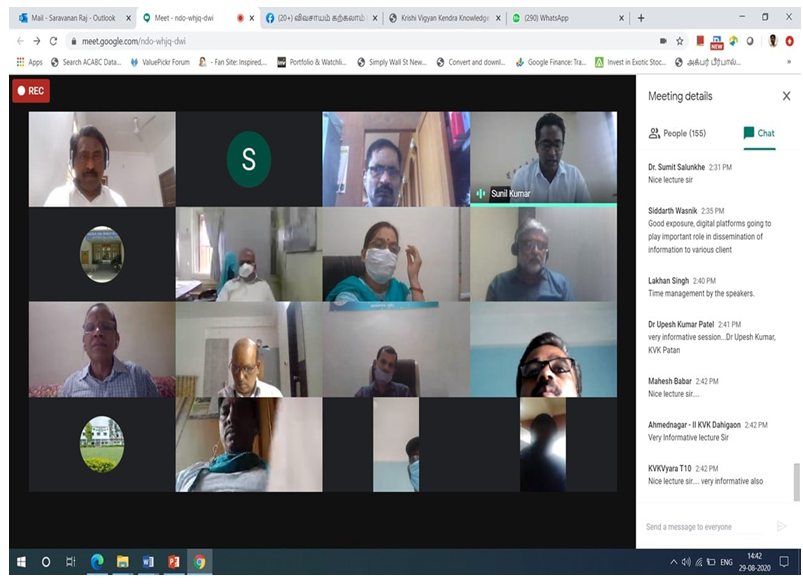 | | | State Level Online Workshop on Ajwain Production Technology Organized by KVK, Aurangabad (Maharashtra) on 17 August, 2020| In his inaugural address, Dr. Ashok Dhawan, Vice Chancellor, Vasantrao Naik Marathwada Krishi Vidyapeeth Parbhani highlighted the importance of Ajwain crop under dryland areas. He highlighted the export potential of Ajwain crop in our country. He urged to enlarge crop area of Ajwain crop by making group farming with market linkages through FPOs and SHGs. Dr. V.M. Bhale, Vice Chancellor, Dr. Panjabrao Deshmukh Krishi Vidyapeeth, Akola spoke on Ajwain crop production status in Vidarbha region of Maharashtra and also provided information on availability of Ajwain Threshing Machine developed by the university and appealed the farmers to make use of this technology. Dr.Gopal Lal, Director, National Research Centre for Seed Spices (NRCSS), Ajmer shared latest technologies of Ajwain crop cultivation. He said that ajwain is cash and export oriented crop that is not destroyed by any wild animals. It is also less input required crop. He urged the farmers to adopt AA-93 cultivar which matures in 145 days. Dr. Gopal mentioned about versatile use of ajwain towards nutritional and medicinal value in human beings and animals. Dr. Lakhan Singh, Director, ICAR-ATARI, Pune urged the farmers to grow ajwain in organized manner. Adopting post harvest processing, value addition, mechanization, grading, packaging can give very high return to the farmers. KVKs should develop Seed Spices Technology Park at the instructional farm for educating the farmers. By growing such seed spices crops, farmers' income can be enhanced and doubled. He shared example of the farmer who obtained 10 q/ha yield with net profit of Rs. 60000 per ha from ajwain crop under water stressed condition. Dr. D.B. Deosarkar, Director of Extension Education, VNMKV, Parbhani focused more on working jointly with other organizations including NRCSS, Ajmer. Dr. V.K. Kharche, Director of Research; Dr. P.K. Nagare, Dean Faculty of Horticulture, Dr. PDKV, Akola were also guided the participants. Dr. S.B. Pawar, Associate Director Research, NARP, Aurnagabad given opening remarks of the workshop and reported present status of ajwain crop in Aurangabad district of Maharashtra. Dr. B.V. Asewar, Head, Deptt of Agronomy, VNMKV, Parbhani stated that Ajwain crop can be included as option under contingency crop planning. Dr. S.S. Meena, Principal Scientist, National Research Centre for Seed Spices, Ajmer delivered a lecture on full package of practices for ajwain cultivation. He also narrated different varieties of ajwain developed by the NRCSS, Ajmer including AA-1, AA-2, AA-73 and AA-93 cultivars. He said that root rot can be managed by seed treatment with bavistin/thiram. Soil solarization is also helpful in minimizing root rot in ajwain. Ajwain can be grown in both rabi and kharif season. Dr. K.K. Zade, Head, KVK, Aurangabad shared successful cases of ajwain growers. In the event, 100 farmers and scientists were participated in virtual mode. | | 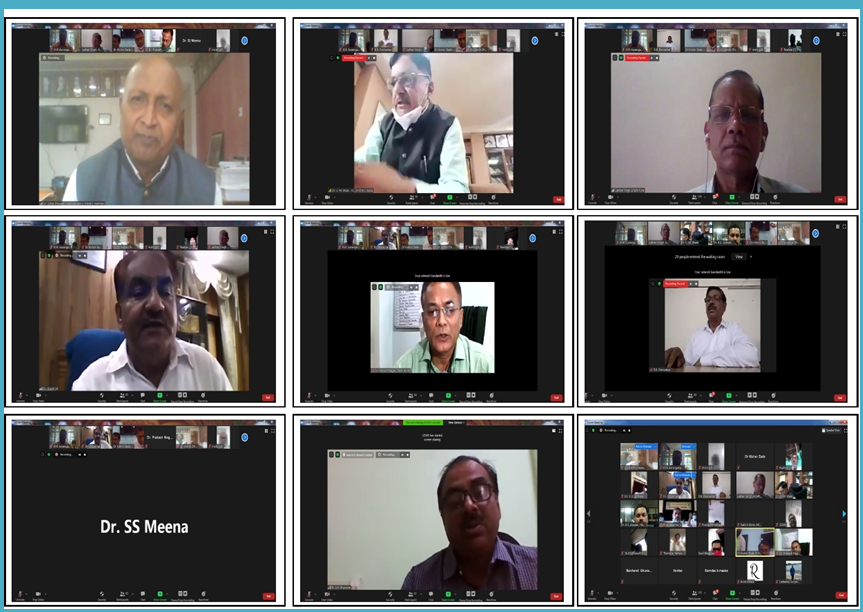 | | | Webinar on 'Promoting Bamboo Cultivation for Bamboo Based Industries in Maharashtra' on 14thAugust, 2020| Today on 14th August 2020, KVK Baramati, Pune - I organized a Webinar in association with Maharashtra Bamboo Development Board, Nagpur on 'Promoting Bamboo Cultivation for Bamboo Based Industries in Maharashtra' in rural areas at farmers' fields. As Chief Guest, Dr. Lakhan Singh, Director, ATARI, Pune highlighted the vital role of bamboo cultivation in social, economic and ecological development. Bamboo has a great potential to capture and store carbon. It is fast growing plant and can be grown on degraded lands in varied climatic conditions. There are more opportunities to cultivate well managed bamboo farms and develop bamboo based industries in rural areas. He urged the KVKs to give focus on creating nursery for providing quality seedlings and creating block of different bamboo species. Proposal may be developed on bamboo value chain management for micro and small enterprises. His main concern was to link the growers with bamboo industries. He cited the example of Mr. Ganesh Ambhore - a farmer of Jalna district raised 12 acre bamboo. He is expecting income of Rs. 1.5 lakh per acre after 4 years. A group of 300 bamboo growers has been formed. Under this group, 194 farmers have grown bamboo on 335 ha area. They have made buyback contract with a private company for 40 years. He appreciated the efforts of KVKs and Maharashtra Bamboo Development Board towards promoting bamboo cultivation. Dr. T.S.K. Reddy, Managing Director, Maharashtra Bamboo Development Board (MBDB), Nagpur made brief presentation on importance, bamboo cultivation practices and different bamboo schemes including Atal Bamboo Samrudhi Yojana and National Bamboo Mission. He said that symbiotic relationship between farmers and entrepreneurs is needed. His focus was on providing better tissue culture saplings, expanding area under bamboo and enhancing farmers' income. Different livelihood options were also highlighted including agarbatti making, rakhi making, clothes making, paper industry, furniture, plywood, baskets, etc. Mr. Mule, Director, ATMA, Maharashtra focused on market led extension, cultivation of bamboo on farm borders and banks of river. He also expressed the need to decide district wise strategy for bamboo cultivation. Dr. Syed Shakir Ali, Head, KVK Baramati mentioned the planning of cluster demonstrations and work done on bamboo cultivation by the KVK on 1000 acre area. He emphasized more to join hands for promoting bamboo in mission mode. Mr. Anand Fiske, Bamboo Plantation Specialist, MBDB, Nagpur and Mr. Rohan Nahar gave audio visual presentation on 'Atal Samrudhhi Yojna' and shared ground level successful cases on bamboo cultivation and micro enterprises. In total 85 participants participated from KVKs, ATMA and Department of Agriculture through video conferencing. | | 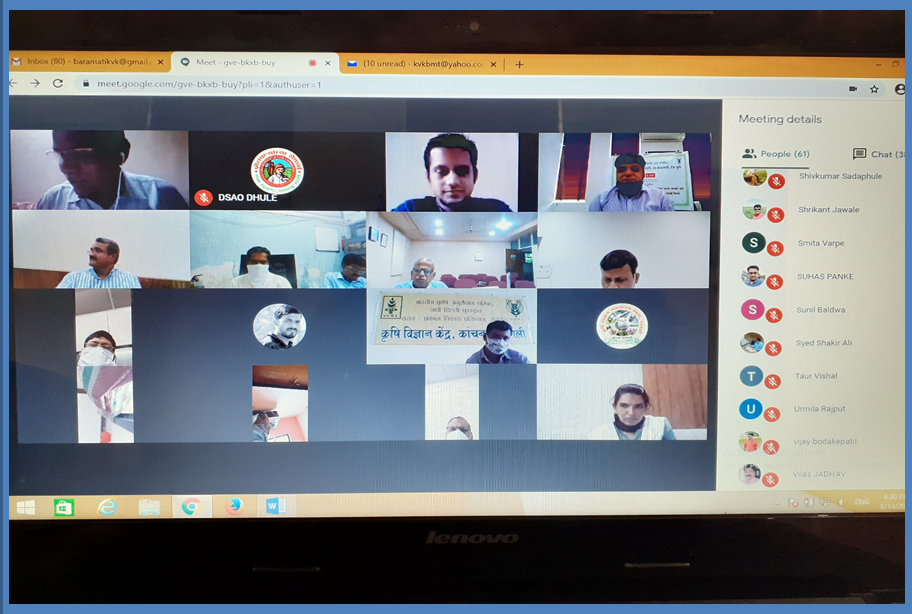 | | | Online Annual Zonal Review Workshop of NICRA KVKs of Maharashtra and Gujarat Organized on 7.8.2020| A one-day 'Online Annual Zonal Review Workshop of 13 NICRA-KVKs of Maharashtra and Gujarat' was jointly organized by ICAR-ATARI Pune; ICAR-CRIDA Hyderabad and KVK, Jalna-I organized on 7th August, 2020. Dr. Ashok Dhawan, Vice Chancellor, Vasantrao Naik Marathwada Krishi Vidyapeeth, Parbhani while addressing as a chief guest, he expressed the need of upscaling proven technologies demonstrated under National Innovations on Climate Resilient Agriculture (NICRA) project. He shared the example of Kadwanchi watershed in Jalna district of Maharashtra for its identity at national level for producing and exporting grapes on large scale. He further extended that NICRA can give us cushioning during COVID-19 pandemic in current situation. There is a need to integrate resource conservation with crop diversification for income generating technologies. Dr. M.C. Varshneya, Ex-Vice Chancellor, AAU Anand and Kamdhenu University, Gandhinagar and ZMC Chairman, West Zone applauded the efforts of KVKs and shared experience of visible impact successful village watershed. He stressed on the need to diffuse the well tested climate resilient technologies in other areas. He narrated the example of soil and water conservation practices, plastic lined farm ponds, grapes cultivation in Kadwanchi village in Maharashtra, water conservation work in Rajasthan, happy seeder in Haryana, custom hiring center, silage making technology, sericulture and IFS in NICRA districts of Maharashtra. He suggested analyzing the changes in climate change data during last five years and quantifying the impact of resilient practices. Shri Vijay Borade, Trustee MSSM and Project Director, KVK, Jalna-I emphasized on adding "women empowerment" as an additional module in TDC-NICRA. He also focused the need of processing and value addition and urged to include sericulture, bamboo, aromatic and medicinal grasses as climate resilient crops under NICRA. Dr. G. Ravindra Chary, Director, ICAR-CRIDA, Hyderabad highlighted good work of KVKs in the zone especially on in-situ moisture conservation, water storage structures, introduction of drought resistant varieties, IFS models, silage making and other animal components. He appreciated convergence mechanism of KVKs with state line departments. He also appreciated efforts of KVKs to work under COVID-19 situation successfully. He summarized the future roadmap of NICRA project based on the feedback of ZMC chairman. He stressed on documenting the impact as the project has entered in its 10th year and also told that some additional villages will be identified for next phase based on the climate vulnerability map. Dr. Lakhan Singh, Director, ICAR-ATARI, Pune, Maharashtra briefed about the Zone's achievements and highlighted the impact of silage making, mass trapping of PBW moths in cotton, rain water harvesting, intercropping of pulses in cotton, crop diversification with sericulture, custom hiring centers, etc. He urged the KVKs to understand the social vulnerability of the community. Climate resilience of resource conservation technologies should be studied. Dr. JVNS Prasad, Co-PI, TDC-NICRA in his remarks highlighted that there are 121 NICRA district in the country. KVKs should follow the recommendations of Zonal Monitoring Committee and document extent of adoption of resilient practices. More than 50 participants including Directors of Extension Education of SAUs, Heads of KVKs, PIs and Co-PIs of NICRA, SRFs and associated scientists were participated in the workshop. | | 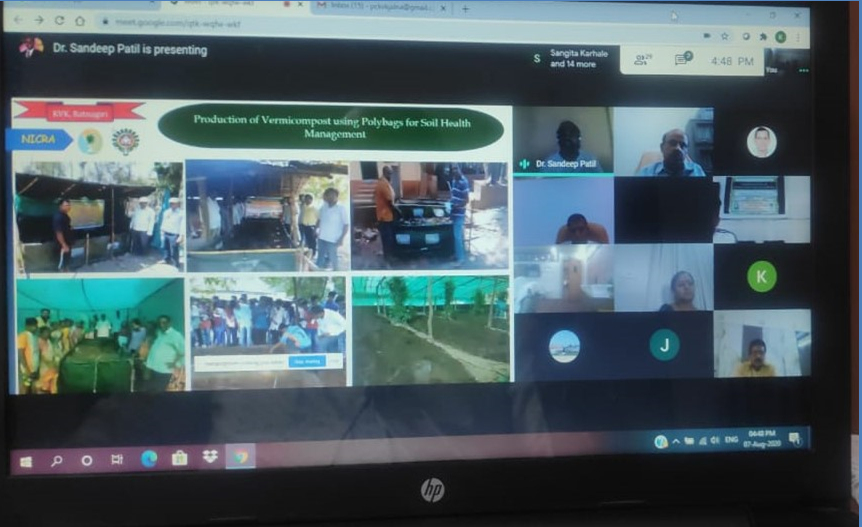 | | | Webinar on "Formation of Farmers Producer Organization (FPOs)for Aatmnirbhar Bharat" Organized by KVK, Kolhapur-II on 31st July, 2020 | A Webinar on Formation of Farmer Producer Organization (FPO) for Aatmnirbhar Bharat' was organized by Shri Siddhagiri Krishi Vigyan Kendra, Kolhapur in collaboration with Regional Agriculture Extension Management Training Institute (RAMETI), Kolhapur and Maha Farmers' Producers' Organization Federation (FPO), Pune on 31st July, 2020. In total, 131 participants participated in the Webinar. In his inaugural speech, Dr. Lakhan Singh, Director, ICAR-Agricultural Technology Application Research Institute, Pune urged the farmers to harness the power of working together, self-help concept, cooperation, democratic control, mutual trust building, bargaining power and spirit of working as entrepreneurs. He also advised the farmers to identify the areas for cluster based farming as a part of proper business planning. Dr. Singh explained about target setting behaviour, identifying inner strength, having hope for the success, bearing calculated risk, sensing the market, being always vigilant for becoming successful entrepreneurs and ultimately sustaining the Farmer Producer Organisation. Well designed entrepreneurial motivation training for different level of FPO members, board of directors and other associated persons should be organised by the KVKs. P.P. Adrushya Kadsiddheshwar Swami Ji, Chairman, Shri Siddhagiri Krishi Vigyan Kendra, Kolhapur urged the farmers to develop themselves as business icon rather than just farmer. Swami Ji stresses upon linking the greater number of farmers to FPOs for better linking to the market. Swami Ji also emphasised on developing organic farming models and increasing the specialised commodity based FPOs with the efforts of KVK. Shri Umesh Patil, Principal, RAMETI, Kolhapur appealed the participants to engage young farmers and orient them towards understanding the concept of FPO and the importance of group-based farming. He also stresses on developing commodity-based groups for easy marketing. Dr. Anirban Mukherjee, Scientist, ICAR Research Complex for Eastern Region, Patna highlighted the critical factors for establishing FPOs for already established and newly established FPOs. Dr. Anirban dealt the various components for FPOs financial, monitoring mechanism and developing leadership qualities of different middle level management workers. Dr. Anirban also suggested the KVK to provide technical support in convergence with ICAR scientists and KVKs officials. Dr. Sanjay Pandhare, Enterprise and Resource Generation Specialist - SMART project, Government of Maharashtra provided full information for establishing FPOs in their locations with various organisations. He also advised farmers about document preparation, utilisation of different schemes for FPOs establishment. Dr. Ravindra Singh, Head, Krishi Vigyan Kendra, Kolhapur motivated the farmers to attain the goal of doubling farmers' income by 2022 with the help of FPOs. Shri Sunil Kumar, SMS (Agricultural Extension) guided the farmers about new guidelines of FPOs with the target of reaching 10000 FPOs by the year 2023-24. | | 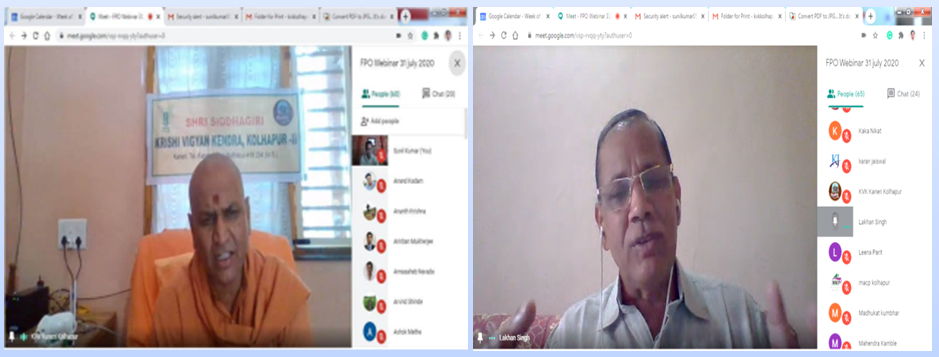 | | | Online Annual Zonal Workshop of 81 KVKs of Maharashtra, Gujarat and Goa organized by ICAR-ATARI, Pune from 10-12 July 2020 | The ICAR-Agricultural Technology Application Research Institute, Pune organized three-days 'Online Annual Zonal Workshop of 81 KVKs' comprising Maharashtra, Gujarat and Goa from 10-12 July, 2020. The workshop was inaugurated by Shri Kailash Chaudhari, Union Minister of State for Agriculture and Farmers Welfare, Govt. of India. In his inaugural speech, he applauded the efforts of KVKs and admired initiative of ATARI Pune to organize annual zonal workshop using online mode. He stressed the crucial role of entire NARS and KVKs system for doubling farmers' income by 2022. The minister iterated that there is a need to transform agriculture sector into business mode and suggested popularization of Farmers Producer Organizations (FPOs) to get self depend and harness the strength of working together. He gave focus on making farming more profitable, contract farming, warehouse and storage structures, up-scaling climate resilient technologies, water harvesting, etc. He said 'Atma NIrhar Bharat' can be achieved only by revolutionizing agricultural sector through value addition, post-harvest technologies, value chain management, producing exporting quality products. Hence, he urged the KVKs to undertake need based enterprises to empower farming communities across the nation. Farm women need be technologically empowered. Villages should be developed as models that can be shown to other villagers towards their motivation. KVK should come up as one stop solution for the farmers. Dr. Trilochan Mohapatra, Secretary, DARE & Director General, ICAR praised the advisories issued by KVKs during the COVID-19 crisis. Demand of KVKs is increasing gradually due to their more visibility in the districts. He emphasized to do proper analysis of identified villages towards doubling farmers' income based on their benchmark survey. State government should follow the doubling farmers' strategy.Region specific problems should be addressed. Micro irrigation, onion, garlic, castor, seed spices, horticultural crops, post harvest processing, multi-layering cropping and value addition can help in enhancing farmers income. Climate smart villages should be developed. Expertise of Subject Matter Specialists at the KVK should be developed in the field of mechanization, food processing & value addition and marketing. He urged the KVKs to develop data base of farmers for each respective district. Low performing KVKs as graded by the third party should be asked to perform better. He suggested maintaining close liaison with other ICAR institutes across India to adopt innovative and suitable technologies in the zone. Special attention on organic farming, livestock and fishery component may be given. Dr. A.K. Singh, DDG (Agril Extension) highlighted the need of specialty agriculture, local marketing mechanism of fruits and vegetables, AMUL based cooperatives, IFS models in scarce condition, etc. He appreciated the culture of organizing farmers in Maharashtra through commodity based FPOs/FPCs. He remarked that KVKs used to organize large scale live demonstrations in Farmers Fairs with large number of visitors. Dr. Singh urged the KVKs to give thrust on developing nutritional gardens at KVKs and villages, involving aanganwadi workers for making Kuposhan Mukta Villages. There is need to enhance the two-way dialogue among KVKs and farmers and hence suggested the maximum utilization of social media for transfer of technology. Dr. K.P. Viswanatha, Vice Chancellor, Mahatma Phule Krishi Vidyapeeth, Rahuri stressed on undertaking futuristic challenges along with infrastructure at the KVKs. He suggested that SREP can be utilized to understand the priorities and implementing farm diversification including livestock component for enhancing farmers' income. Earlier Dr. Lakhan Singh, Director, ATARI, Pune presented the brief achievements of the zone and highlighted protected cultivation, crop diversification through sericulture, bee keeping, bamboo cultivation, successful cases of agri-entreprenurs, innovative extension approaches followed by the farmers. A special session on 'Future Priorities for Next Five Years Plan in Context to KVKs' was also organized under chairmanship of Dr. AK Singh, DDG (Agril Extension), ICAR and Dr. KP Viswanatha, Vice Chancellor, MPKV, Rahuri. In this session, 9 Vice Chancellors of SAUs; 13 Directors of ICAR institutes; 9 Directors of SAUs of Maharashtra and Gujarat were acted as panelists. 81 Heads of KVKs were also participated. In Plenary Session, Dr V.M. Bhale, Vice Chancellor, PDKV, Akola was the Chief Guest. In his address, crop planning at district level, facilitating FPOs, bio-agents production units and marketing were focused. Dr. VP Chahal, ADG (Agril Extension), ICAR highlighted the need to strengthen convergence with other agencies to get financial support, constitute a team of excellence at Directorate of Extension Education level, production of organic inputs. Shri Atul Jain, Member, NITI Aayog Standing Committee on CSOs gave focus on documenting farmers' wisdom, folk songs, proverbs and beliefs. Dr. R.K. Patel, Vice Chancellor (SDAU, SK Nagar); Dr. R.V. Vyas, Vice Chancellor (AAU, Anand); Dr. E.B. Chakurkar, Director (CCARI, Goa) and Dr. M.J. Chandregowda, Director (ATARI, Bengaluru) urged to make the instructional farm of the KVK as technology hub for educating different stakeholders. | | 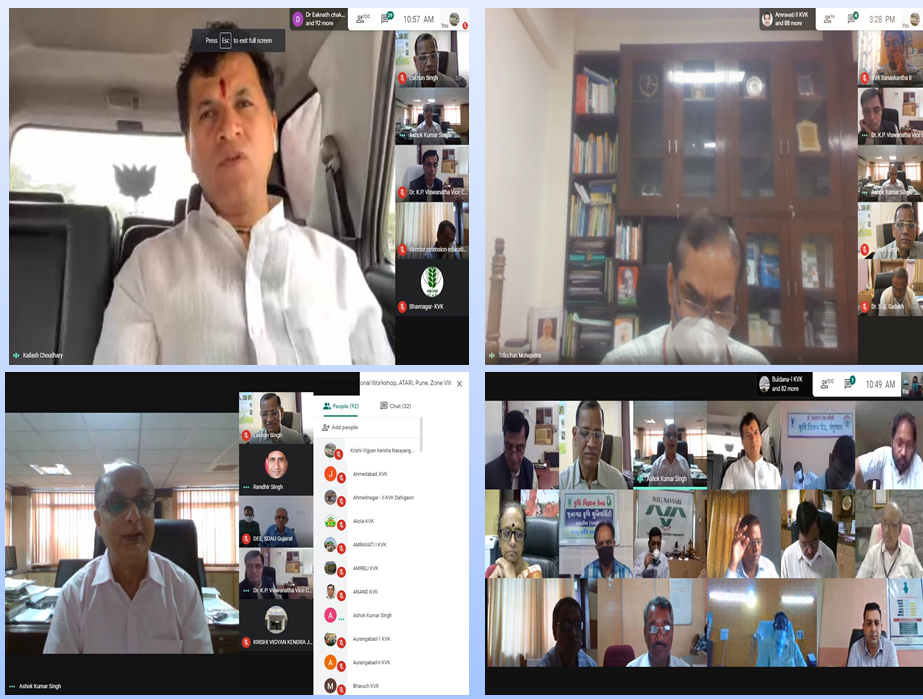 | | | Virtual Webinar on Formation of Farmer Producers Organizations (FPOs) Organized by KVK, Narayangaon, Pune (Maharashtra) on 9.6.2020 | Krishi Vigyan Kendra, Narayangaon, Pune; Project Director, ATMA, Pune and Maha FPO Federation, Pune jointly organized virtual webinar on Formation of Farmers Producer Organisations on 9 June 2020. During inaugural session, Dr. Lakhan Singh, Director, ATARI, Pune gave more emphasis on formation of FPOs and their benefits to the farmers. Under FPO, producers come together especially small and marginal farmers to address many challenges of agriculture, access investments, technology, input sharing, production and marketing strength. FPOs follow principle of voluntary and open membership, farmer-member economic participation, self help, capacity building, cooperation, working together, concern for community and sustainable development. FPOs played a greater role in creating market chain, door to door marketing, and value addition during distress situation. FPO can supply inputs to the small and marginal farmers or their members on no loss no profit basis. It helps in reducing cost of cultivation and increases their bargaining power. Mr. Rajendra Sabale, Project Director, ATMA Pune was the guide to the participants. He said that under the MACP project we had established more than 400 FPCs in last 8 to 9 years. Now most of the FPCs are working successfully and helping to the farmers. Many of the FPCs are involved in input supply, consultancy and marketing of agri produced. Farmers have established their FPOs as per their enterprises and mutually benefited all the farmers. President of Shivtej Farmers Producer Company from Narayangaon Mr. Satish Pate shared his experiences and gave message of unity for the success. Dr Sanjay Pandhare, Enterprise and Resource Generation Specialist- SMART Project, Govt. of Maharashtra explained the scenario of the Farmer Producer Companies (FPCs) also stated the scope and objective of the company. He advised about complete documentation process and other important information needed for establishment of the company. At the end, question-answer session was organized to clear their doubts. Dr. Prashant Shete, Head, KVK, Narayangaon shared successful cases of FPOs/FPCs and motivated the farmers to join hands for their own help. He urged the farmers to join orientation training courses at the KVK. Mr. Rahul Ghadge coordinated the programme. During the live session of the webinar, 127 participants were participated from the different districts of the Maharashtra. | | 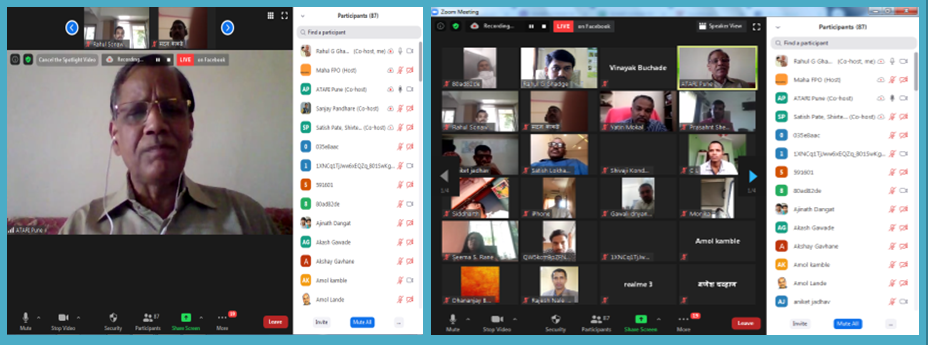 | | | ATARI, Pune Organized Annual Work Plan Workshop of 51 KVKs of Maharashtra and Goa 27-28 May, 2020 | State Level Online Annual Action Plan Workshop of 51 KVKs (Maharashtra-49 and Goa-2) was organized during 27-28 May, 2020. In all, 76 participants attended the online workshop. The KVK Heads presented their action plan for current year 2020. Dr. A.K. Singh, DDG (Agril Extension), ICAR, New Delhi inaugurated the workshop. He urged the KVKs to change the way of working and maintaining the tempo and zeal to do work. His main concern was on upcoming kharif season. Focus on secondary agriculture, floriculture, IFS model, marketing system and supply chain management was given. Each KVK expert should be multi-tasker and master of their own situation. He suggested building storage system like onion/garlic at household level. Farmers' income should be enhanced without losing natural resources. Each KVK should develop ideal model village for doubling farmers' income. Climate resilient technologies should be up-scaled in other areas. Proposals may be developed on bee keeping, herbal crops, and storage & processing to obtain external funding. Convergence is the key for getting mutual benefits. Economic activities may be planned along with skill based trainings for migrant workforce. Dr. K.P. Viswanatha, Vice Chancellor, MPKV, Rahuri (Maharashtra) stated that planning should be done meticulously considering area specific problems. Weekly planning, end to end planning, marketing intelligence, reduction in cost of cultivation should be focused at KVK level. Crop diversification will help in enhancing the farmers' income. He gave thrust on encouraging Farmers Producers Organizations (FPOs) for input sharing, direct marketing, supply chain management and exporting agro-products. Dr. S.K. Singh, Director, ATARI, Jodhpur emphasized on adopting problem solving approach, providing alternative solution and technology integration. Dr. Atar Singh, Director, ATARI, Kanpur advocated the KVKs to focus on nutria-rich minor millets, simple IPM modules for pulses/oilseed crops and developing functional demonstration units. Dr. Lakhan Singh, Director, ATARI, Pune critically reviewed the work plan of the KVKs and urged to make contingency planning for combating distress situation. Latest cultivars/technologies developed by the SAUs and ICAR institutions should be included under on farm trials and frontline demonstrations. Precision farming, real time agro-advisory, advance input management, making KVK farm as profitable model to convince others, and developing mechanism to reach to unreached was focused. In this workshop, Directors of Extension Education (Dr. S.R. Gadakh, MPKV, Rahuri; Dr. D.M. Mankar, PDKV, Akola; Dr. S.G. Bhave, BSKKV, Dapoli; and Dr. Debsarkar, VNMKV, Parbhani) participated in online mode and facilitated the KVKs for realistic action plan development. | |  | | | Farmers Producer Organization: A Future Need Webinar Organized at KVK Baramati, Maharashtra on 26.5.2020| Agricultural Development Trust's Krishi Vigyan Kendra, Baramati organized Webinar on 'Farmers Producer Organization (FPO): A Future Need' on 26th May, 2020 for creating awareness and motivation in farming community. More than 100 farmers and rural youth interested to establish FPOs were participated in live webinar. The KVK has established 7 FPOs in Pune district in collaboration of ATMA and NABARD Dr. Lakhan Singh, Director, ICAR-Agricultural Technology Application Research Institute (ATARI), Pune inaugurated the Webinar as chief guest. He guided the farmers about the importance of FPO and group dynamism and motivated the farmers for establishment of FPOs/FPCs. He also appreciated the work done by KVK Baramati for FPO. Dr. Syed Shakir Ali, Head, KVK, Baramati guided the participants about the various activities of KVK related to FPOs. He also assured farmers to support the farmers for establishment of farmers' producer organization, branding and marketing of their agriculture products. Mr. Santosh Godse, Subject Matter Specialist (Agril. Extension), KVK, Baramati discussed about the progress of FPO established by KVK Baramati. Dr. Sanjay Pandhare, Co-coordinator Maha FPO Federation, Pune guided farmers about importance of FPO, rules and regulations for FPO and different Govt. schemes for FPOs. Mr. Vijay Salunkhe, Chairman, Karhamai FPO Karhati, taluka Baramati and Mr. Nitin Taware, Chairman Nathson FPO, Sangavi taluka Baramati shared their experiences their FPOs. More than 4000 people viewed the live telecast through Facebook, 67 persons shared it, 105 persons liked the event and 27 persons gave their valuable comments | | 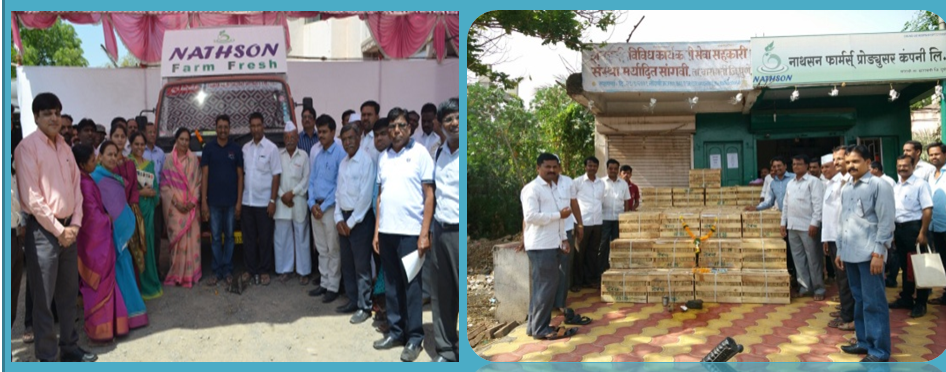 | | | World Honey Bee Day Celebrated at KVK, Baramati on 20.5.2020| Agricultural Development Trust's Krishi Vigyan Kendra, Baramati celebrated 'World Honey Bee Day' on 20th May, 2020 for the creating awareness and motivation in farming community and rural youth for bee keeping. Every year, KVK, Baramati celebrates the World Honeybee Day and also felicitates some of the innovative farmers. The KVK has implemented First Pilot Project Madhu Sandesh in collaboration with ICAR, New Delhi & Crop Life Asia. Also, the KVK is the authorized centre for All India Coordinated Research Project on Honey Bee & Pollinators among the 26 centres in the country. Due to lockdown, the day was celebrated through the Zoom webinar. Dr. Lakhan Singh, Director, Agricultural Technology Application Research Institute (ATARI), Pune inaugurated the Webinar as Chief Guest. He guided the farmers about the importance of honey bee in crop production. He also suggested the rural youths to go for Bee Keeping as an enterprise for which the government has sanctioned Rs. 500 crore. He gave the overall situation of bee keeping in the country and the future strategies to be developed. He urged the KVKs to develop bee keeping units at the centres. School children can also be aware about honey bee preservation. Dr. Syed Shakir Ali, Head, KVK, Baramati guided the participants about the various activities of KVK related bee keeping. He pointed out the findings of the Madhu Sandesh Project in which the pomegranate growers got about 40% increased yield due to use of bee hives for pollination. Dr. Milind Joshi, Subject Matter Specialist (Plant Protection), KVK, Baramati discussed about the Honey Bee species, castes, bee hive management, pests & diseases, floral management, migration, honey & other bi-products, quality testing, etc. He focused on the honey bee is 5th important element for the sustainable crop production. Bee keeping can be a best alternative for income generation and employment creation. He requested that the awareness is the best tool and the population of these beneficial needs to be increased and conserved in different ways. About 113 participants from all Maharashtra especially from Pune district, Aurangabad, Bhandara and other districts attended the webinar. About 4200 people viewed the live telecast through Face book, 80 persons shared it, 105 persons liked the event and 29 persons gave their valuable comments. | | 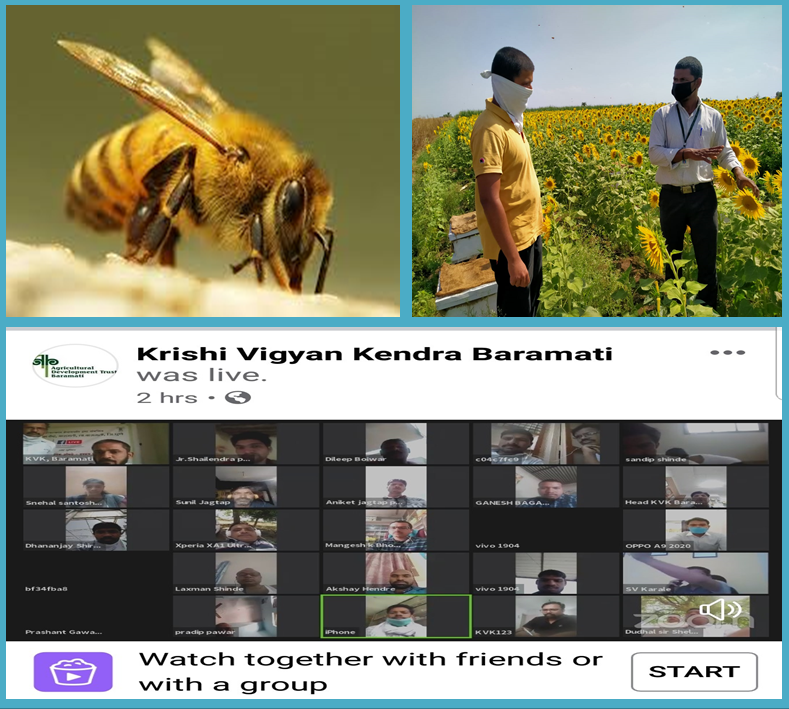 | | | State Level Online Farmers Workshop on 'Advances in Pomegranate Production' Organized by Krishi Vigyan Kendra, Banaskantha-I, Gujarat | Three days State Level Online Farmers Workshop on 'Advances in Pomegranate Production' was began at Krishi Vigyan Kendra, Banaskantha-I (Gujarat) on 18.5.2020. In total, 218 farmers from 22 districts of Gujarat and 21 extension functionaries from Banaskantha district participated in the programme through Google meet app. Dr. R.K. Patel, Vice Chancellor, Sardarkrushinagar Dantiwada Agricultural University, Sardarkrushinagar, Gujarat highlighted the nutritional importance of pomegranate, health benefits, current status of its cultivation in Gujarat and future opportunities in the Banaskantha district through value addition. Dr. Lakhan Singh, Director, Agricultural Technology Application Research Institute, Pune urged the farmers to grow Solapur Lal and Super Bhagwa varieties of pomegranate in rainfed areas. He said that in pomegranate cultivation, all the stages (storage stage, stress stage, flowers & fruit set stage, fruit development stage, maturity & harvesting stage) are very important. Farmers should be very vigilant towards growth of the pomegranate plants for obtaining export oriented quality fruits. Farmers can enhance their income by following processing and value addition with well planned marketing. KVKs should motivate the farmers to start their residue free planting materials and they can take it as business for higher return. Dr. V.T. Patel, Director of Extension Education, Sardarkrushinagar Dantiwada Agricultural University, Sardarkrushinagar gave brief orientation about status of pomegranate cultivation in Gujarat and Banaskantha. Padma Shri Genabhai Patel emphasised to adopt organic farming in pomegranate and reducing cost of cultivation. Dr. Jyotsna Sharma, Director, National Research Centre on Pomegranate, Solarpur delivered an expert talk on integrated pest and disease management in pomegranate. She urged about use of need based pesticide, bio-pesticide, disease identification and their preventive measure and management practices. Dr. Vinay Supe, Associate Director of Research, ZARS, Pune spoke on scientific pomegranate production technology and focused more on bahar management, use of various organic inputs and irrigation scheduling. In forthcoming sessions, Dr. F.K. Chaudhary, Associate Professor, SDAU will speak on eco-friendly management of insects, pest in pomegranate; Shri Sachin Phule on residue free pomegranate Residue free pomegranate cultivation; Dr. Yogesh Pawar, Scientist (Horticulture) will deal low cost technologies for pomegranate production. Post-harvest management of pomegranate will be dealt by Dr. Nilesh Gaikwad, Senior Scientist, NRCP, Solapur; Dr. K.P. Thakkar, Head, Dept. of Agril Economics, SDAU, Sardarkrushinagar will share his views on marketing and export opportunities. Shri J. B. Suthar, Deputy Director (Horticulture) will guide the farmers about government subsidiary provisions for pomegranate. The workshop will be continued from 18-20 May 2020. | | 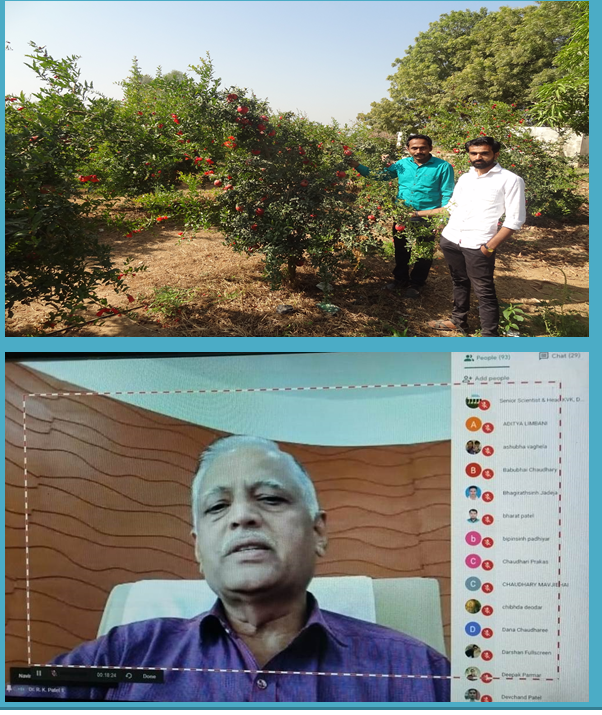 | | | Shri Parshottam Rupala, Union Minister Inaugurated Dial-Out Conference on Kharif Crop Planning Organized by KVK, Navsari, Gujarat on 16.5.2020| A Dial-Out Conference on 'Planning for Kharif Crops of South Gujarat' was organized by Krishi Vigyan Kendra, Navsari, Gujarat in collaboration with the Reliance Foundation on 16.5.2020. In this conference, 400 farmers including 300 farm women participated through telephonic calls. While inaugurating the dial-out conference, Shri Parshottam Rupala (Union Minister of State for Panchayati Raj, Agriculture and Farmers Welfare), Govt. of India urged the farmers for making the Farmers' Producers' Organizations (FPOs) that can revolutionize the agriculture sector of the country and to design the market model at district level. He said that door step marketing should be promoted. He was interacted with many farm women on phone and expressed his happiness about their empowerment to become self reliant. His more focus was on herbal plants, bee keeping, packaging, branding, value addition, organic products marketing and farmers' welfare schemes. Traditional wisdom of farmers should be utilized and validated. He suggested the farmers to follow agro-advisories issued by the ICAR during Covid-19 pandemic situation. He applauded the KVKs for continuously organizing online trainings/workshops/meetings in difficult time. Dr. Lakhan Singh, Director, Agricultural Technology Application Research Institute, Pune urged the farmers to be vigilant in crop husbandry. Skill should be developed as per the need of identified enterprises. KVK should link such rural youth with banks/relevant institutions for their business planning and financial support. Rural youth may be trained for on-site input management that will create employment opportunity in the villages. Advance planning, quality seeds and other inputs may arranged by the KVK for cluster demonstrations on pulses and oilseeds. Use of digital platforms/ICT tools may be promoted in the area for effective knowledge sharing among farmers and field level functionaries. Dr. G.R. Patel, Director Extension, Navsari Agricultural University, Navsari gave brief orientation about latest technologies of the university. He urged the farmers to help the migrated workforce to help them for getting livelihood opportunities. KVK may organize enterprise based training courses for such needy persons. Dr. Amitaben Patel (President, District Panchayat, Navsari) appreciated the efforts of the KVK, Navsari. She stated that technological empowerment of the farm women is needed as they are actively involved in farming, livestock management, household based enterprises. Smt. Prafulaben Desai (Board Member of Management, NAU, Navsari) suggested to focus on including herbal crops in inter cropping system. Dr. C.K. Timbadia, Head, KVK, Navsari initiated the question-answer session for benefitting the farmers and technological options were provided by the experts. Package of practices of paddy, cotton, mung bean, urd bean, groundnut, sapota, mango and other crops were discussed by the Professors, Heads and Scientists. At this occasion, Dr. K.A. Shah; Dr. R. A. Gurjar; Dr. Sumit Salunkhe; Dr. Nittalben Patel were present for facilitating and planning for Dial-Out conference. | | 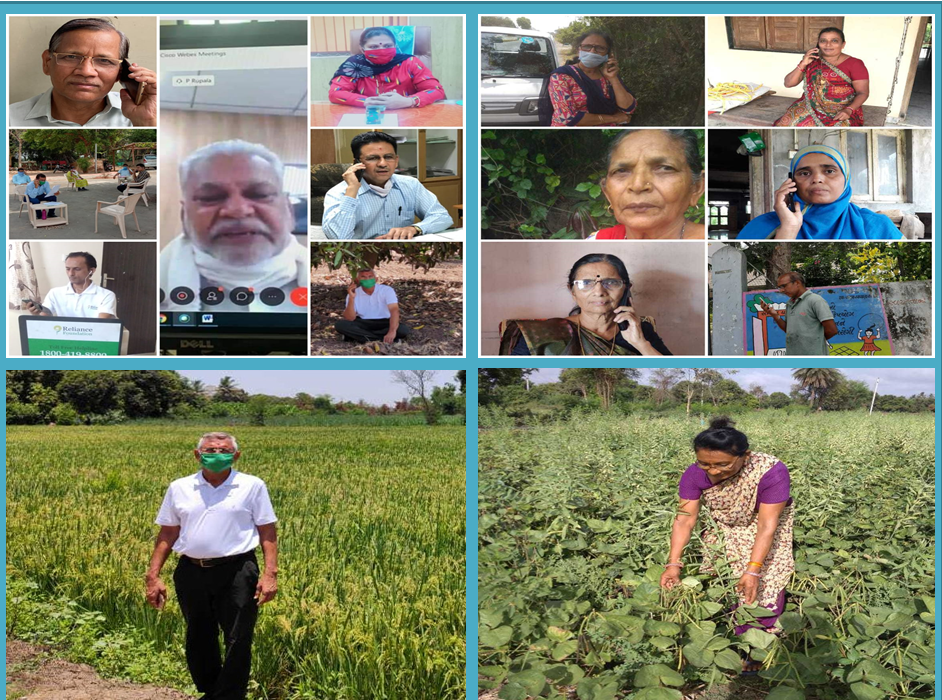 | | | Online Workshop for Farmers on Pre-Kharif Planning Organized by KVK, Solapur-I on 12.5.2020| Online Workshop for Farmers on Pre-Kharif Planning was organized by KVK, Solapur-I on 12.5.2020. In this workshop, 62 farmers and extension functionaries were participated through video conferencing. Dr. Lakhan Singh, Director, ATARI, Pune inaugurated the workshop in distance mode. In his address, he stressed more on advance planning, arranging quality seeds and necessary inputs. Identification of farmers, villages, demonstration sites, technology gap assessment, improved cultivars, etc. need to be done at KVK level. He urged the KVK to focus on organizing frontline demonstrations in cluster mode, which have larger impact in the villages and nearby areas. Dr. Jyotsna Sharma, Director, National Research Centre on Pomegranate, Solapur gave thrust on situation based bahar management in pomegranate and presented the recent advisories. Dr. J.D. Jadhav, Head Department of Meteorology, MPKV, Rahuri oriented the farmers about up-coming monsoon and contingent crop planning in Solapur district. Dr. L.R. Tambade, Head, KVK, Solapur spoke on popularization of improved varieties and technologies of kharif crops and briefed about technological orientation on soybean, pigeon pea and onion crop cultivation. His main attention was on linking crop production with processing and value addition for higher profit. Shri Jayant Kamble, Sub-Divisional Agricultural Officer, Solapur made efforts for supply of critical inputs on door step of farmers. The information about protection technologies and seed treatment of different kharif crops was given by Dr. R. M. Gette, Agronomist, NARP, Solapur and Shri S. P. Javalge, Subject Matter Specialist. Availability of quality seed for pigeonpea (BDN -711, BDN-716); Soybean (MAUS-71, DS-228); Sunflower (Phule Raviraj, MSFH-17) was assured at KVK, Farmers Producers Companies and Mahabeej at district headquarter | | 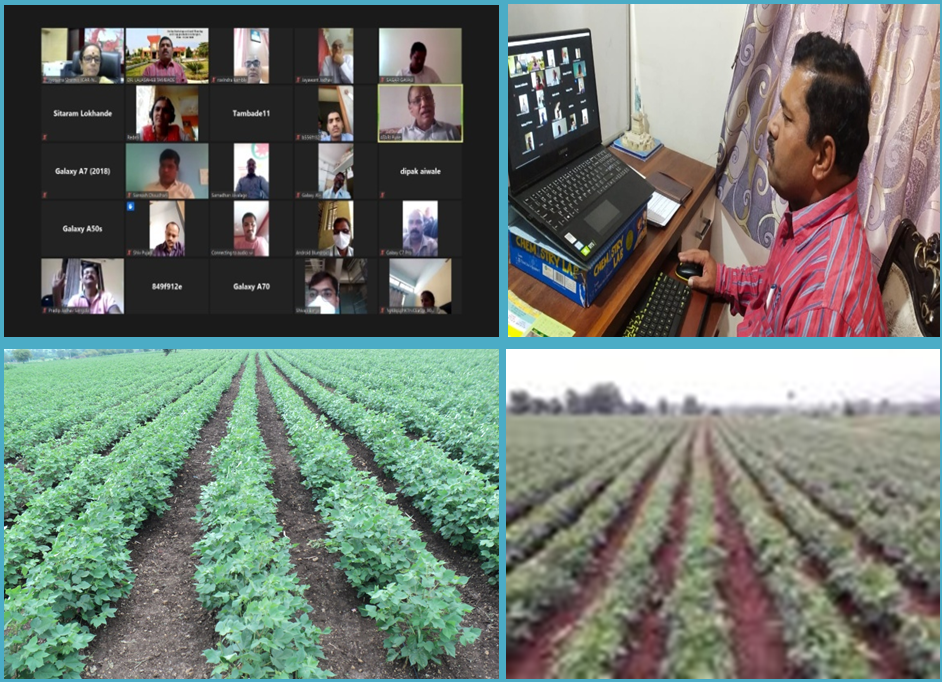 | | | | Three Days State Level Online Workshop for Rural Youths on Mushroom Production Technology Began on 13 May 2020 at Banaskantha, Gujarat | | Krushi Vigyan Kendra, Banasknatha-I, Gujarat started 3 days state level online farmer' workshop from 13-15 May, 2020. In all 110 farmers/rural youths from 17 districts of Gujarat participated in the programme through Google meet app. The main objective of the workshop was to encourage farmers to take up the mushroom cultivation as an enterprise by adopting scientific mushroom cultivation practices. Dr. R.K. Patel, Vice Chancellor, Sardarkrushinagar Dantiwada Agricultural University (SDAU), SK Nagar inaugurated the workshop. In his inaugural speech, he highlighted nutritional importance of mushroom, health benefits, current status of mushroom cultivation in Gujarat and future opportunities in Banaskantha district Dr. Lakhan Singh, Director, ATARI, Pune urged the rural youths to adopt mushroom cultivation as an enterprise. Business planning, developing entrepreneurial motivation, bearing calculated risk, linking with market, etc. are important factors to get the success. There is need of very less area to start mushroom cultivation with locally available inputs/resources. It is suitable to landless, marginal and small farmers to earn regular income for their survival. He stated that if a rural youth could get Rs 20000 per month in the villages that may be a good for his/her livelihood security. Padma Shri Genabhai Patel expressed that Banaskantha district has a huge potential for mushroom cultivation and it is the best approach for enhancing farmers' income in the area. Dr. Yogesh Pawar, Scientist (Horticulture) delivered a talk on scientific mushroom cultivation along with significance of nutritional security. Dr. Vikas Bhalerao, Assistant Prof. (Plant Pathology) highlighted the production technology of oyster mushroom. Dr. Shwet Kamal, Principal Scientist (ICAR-DMR, Solan) will orient the participants about button mushroom; Dr. S.S. Sharma, Head, (Plant Pathology, MPUAT, Udaipur) on organic mushroom; and Dr. Amol Deshmukh (Assistant Professor, NAU, Navsari) will share his experiences on spawn production technology. In this workshop, Shri Kiran Pawar, CEO, Siddharth Mushroom, Nashik will give focus on business prospects in mushroom.; Dr. Rabba Arvinda, Founder President, Mushroom Club, Pune on entrepreneurship development through button mushroom production; Dr. Manisha Shinde, Assistant Professor, SDAU will address different local substrates for composting. Dr. V.V. Prajapati, Head, KVK Banasknatha-I coordinated the online training. The workshop will be continued till 1th May 2020. | 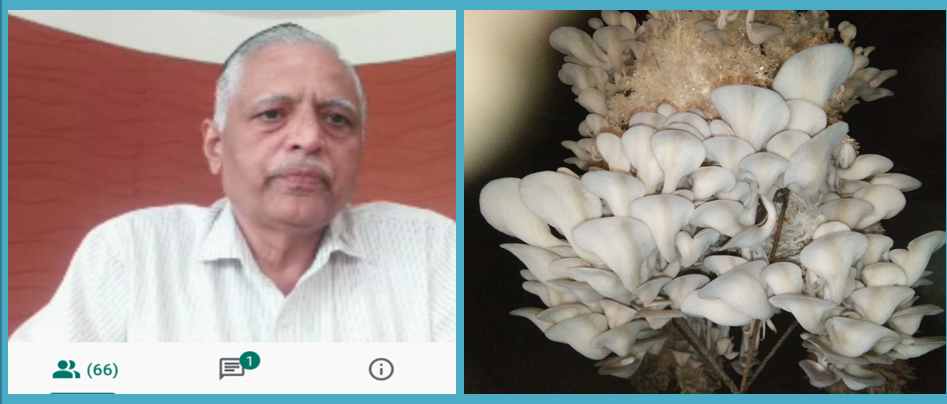 | | | | Online Orientation Training for Farmers under ICAR-Farmer FIRST Project Organized by MPKV, Rahuri on 29 April 2020 | | Online Orientation Training for Farmers under Farmer FIRST project was organized by Mahatma Phule Krishi Vidyapeeth (MPKV), Rahuri on 29.4.2020. In this programme, 50 farmers of Chinchvihire, Kangar and Manori villages got orientation about new interventions, enterprises and kharif planning. Dr. K.P. Viswanatha, Vice Chancellor, MPKV, Rahuri praised the organizer of online training course for the farmers under COVID-19 pandemic situation. He said that the farmers particularly those growing horticultural crops have been affected due to lockdown. But in spite of this situation, some of the farmers have overcome the crisis through direct marketing of farm produce through online mode. Thus, the effective use of social media could be made for meeting the marketing challenges, he said. He further called upon the farmers for maintaining social distancing, personal hygiene for combating the spread of the disease. Dr. Lakhan Singh, Director, ATARI, Pune gave focus on strengthening interface among farmers, extension functionaries and scientists. All categories of farmers including landless should be covered and accordingly interventions and agro-based enterprises may be planned. Main attention may be given for retaining youth in the villages by enrolling them into onsite input management related activities. Under distress situation, the farmers should be facilitated for continuing their farm operations and linking with market chain for economic return. Dr. S.R. Gadakh, Director Research and Extension Education, MPKV, Rahuri urged the farmers to replicate integrated farming system model as being effectively implemented under Farmer FIRST programme. The online training programme would boost the confidence of the farmers in the present situation, he added. In beginning, Dr. P.B. Kharde, Principal Investigator, Farmer FIRST Project briefed about the project and designing need based interventions. In this programme, Shri Mahendra Thokle, Taluka Agriculture Officer; Shri Raibhan Gaikwad, Agriculture Officer; Scientists- Dr. U.S. Surve; Dr. S. D. Mandakmale guided the farmers. Innovative farmers Shri Hemant Suryavanshi, Shri Pravin Patil and Shri Dnyaneshwar Wakchaure also shared their marketing experiences (Farm to Consumer) regarding sale of grapes, poultry birds and tomato processing, etc. Dr. B. A. Deshmukh and Dr. S. S. Sadaphal coordinated the online programme. | 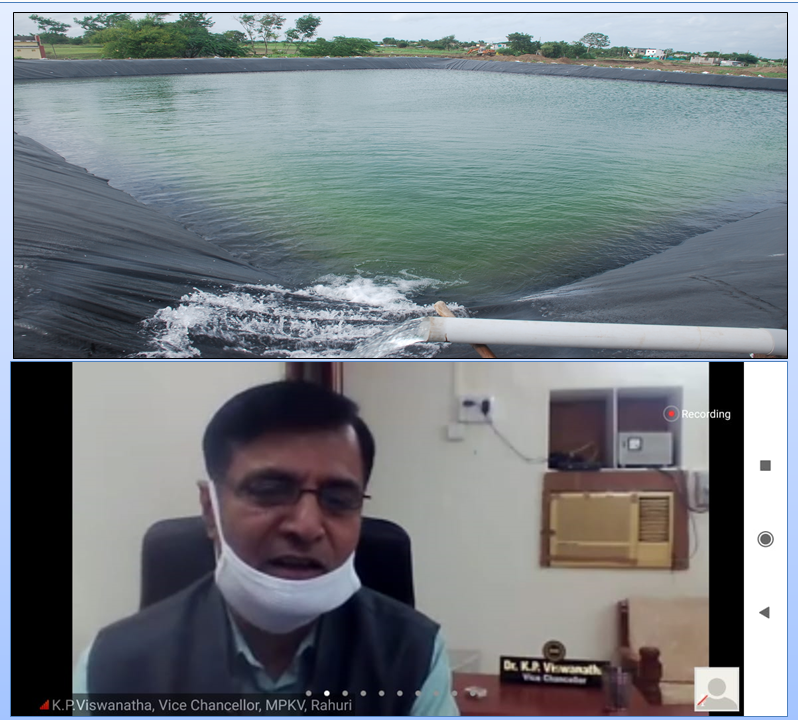 | | | | Celebration of one year completion of implementation of Pradhan Mantri Kisan Samman Nidhi (PM- KISAN) scheme programme at KVK Navsari, Gujrat on 24.2.2020 | | On the occasion of completion of one year of Pradhan Mantri Kisan Samman Nidhi (PM-Kisan) Scheme, Krishi Vigyan Kendra, Navsari celebrated the successful implementation of the scheme on 24th February 2020. Around five thousand (5000) PM-Kisan beneficiary farmers were present during the function. The function was presided by Dr. S. R Choudhary Hon'ble Vice Chancellor NAU, Navsari and other dignitaries were Smt. Amitaben Patel, President of Zilla Panchayat, Navsari; Dr. G.R. Patel DEE, NAU, Navsari; District Development officer, Navsari, Shri Kantibhai Patel, City Corporation Navsari; Shri Jagadishbhai Modi, President Vijalpore City Corporation; Shri. Dhirubhai Manibhai Patel, President, Jalalpore City Corporation and the board members are Shri. Manojbhai Patel, Shri Narendrabhai modi and Shri. Jayarambhai Patel. Dr. C.K. Timbadia, Senior Scientist and Head, KVK, Navsari formally welcomed all the guests. Shri. Parushottam Rupala ji, Hon'ble MoS, Ministry of Agriculture and Farmers' Welfare, New Delhi addressed gathering through video clippings. He highlighted the benefits of scheme due to which many small and marginal farmers were empowered to timely purchase farm inputs (Ex. seeds and fertilizers) and also to carry out various inter-cultivation operations. Shri. Parushottam Rupala ji, Hon'ble MoS urged the farmers to take benefit of the scheme as it helped to free many farmers from the clutches of local money lenders. This event was covered by thirty four different print and communication media personnel to broadcast the message of Shri. Parushottam Rupala ji, Hon'ble MoS across the southern Gujarat. Smt. Amitaben Patel, President Zilla Panchayat, Navsari and a Chief Guest of the function addressed the gathering and appreciated the commendable initiative of government to provide income support to all land holding eligible farmer families through PM-KISAN. She further added that this scheme augmented the financial needs of the farmers and enabled them to buy appropriate inputs at critical crop stages and also to address urgent household needs. | 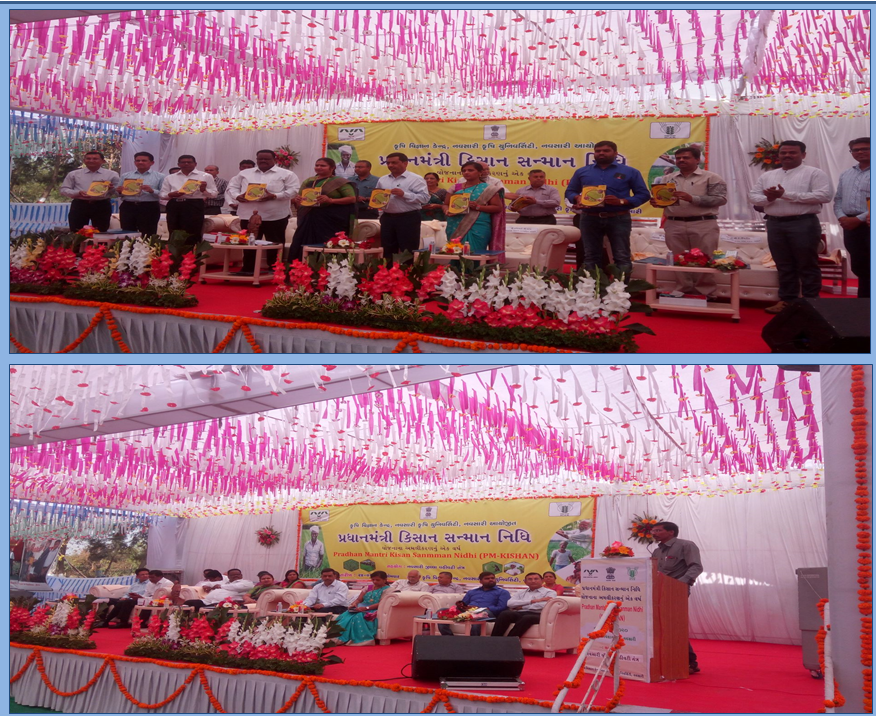 | | | | State Level Action Plan Workshop for 30 KVKs of Gujarat Organized 13-14 February 2020 | | The ICAR-Agricultural Technology Application Research Institute (ATARI), Pune organized the State Level Action Plan-2020 Workshop for 30 KVKs of Gujarat at Gujarat Vidyapith, Ahmedabad during 13-14 February, 2020. The Chief Guest, Dr. Anamik Shah, Vice Chancellor, Gujarat Vidyapith, Ahmedabad exhorted the KVK experts to give focus on doubling farmers' income especially small and marginal farmers through skill oriented trainings and affordable technologies such as use of eco-friendly bio-pesticides, composting of farm waste for promoting organic farming, small millet production, efficient use of available water for irrigation. Future agriculture will be dominated by looming dangers of food safety and insecurity originating from an unholy alliance of existing and emerging environmental, economic and social issues. KVK are the backbone of frontline extension system of country, doing farmer centric, demand driven research to make the farmers fall into step with modern agricultural development. He also urges scientists of KVK to explore the possibility of rural marketing channels for the farmers producing on small piece of land in remote areas. Dr. Shah appealed to forward the Gandhian thoughts for development of agriculture in the country. He said that agro-ecology of Gujarat is varied and Saurashtra is drought affected. The challenge is that how we can help the farmers under such circumstance. Several activities should be planned with focus on rural youths particularly for skill development. Whole family should be considered a unit for working. Dr. Lakhan Singh, Director, ATARI, Pune urged the Heads of KVKs to develop work plan addressing major problems of the farmers in their operational areas. Interventions for minimizing risk of frequent droughts, long dry spell, floods, severe insect/pest incidence, etc. on major crops should be designed. Activities may be planned on nutritional security, micro-irrigation, crop diversification, floriculture, vertical farming, water recycling, developing intergraded farming system models, agro-based enterprises, post harvest processing and value addition. Capacity building of farmers is needed on producing quality farm products for assured market and export. Innovative extension methodologies should be developed. Suitable mechanism for reaching to unreached farmers may be developed at district level. Horizontal convergence needs special attention. ICAR institutes/SAUs should provided latest technologies to the KVKs for quick transfer in the fields. Instructional farm should be developed as model for educating different stakeholders. At this occasion, Dr Arun Patel, Director Extension Education, Anand Agricultural University; Dr Rajendra Khimani, Director, Gujarat Vidyapith, Ahmedabad; Dr. H.L. Dhanuk, Professor; Dr. Rajendra Thakor; Dr. Amol Bhalerao were also present. In this workshop, 50 participants including 30 Heads of KVKs, Professors and Subject Matter Specialists presented their work plan for the year 2020. | 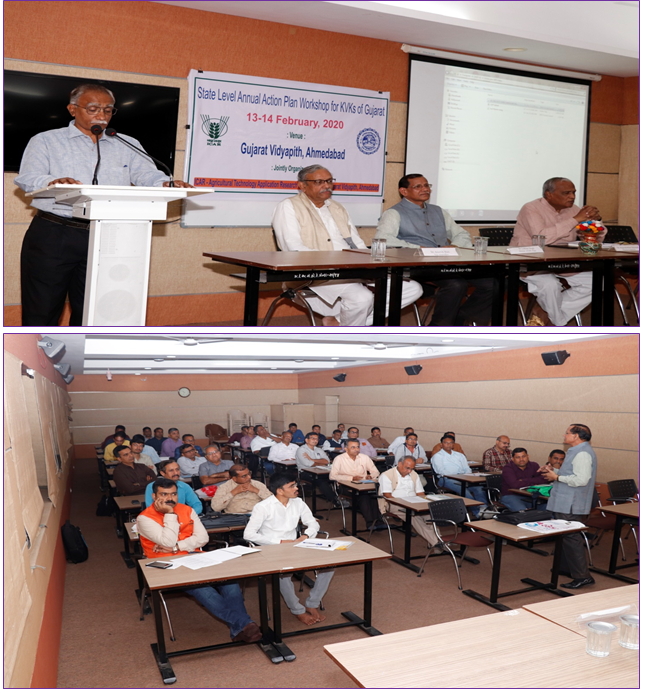 | | | | Agro -Tech Fair 'Krushived-2020' Began at KVK Nanded II 9-12 February, 2020 | | Three days Agro-Tech-Fair (Krushived-2020) began at KVK, Nanded-II on 9th February, 2020, which was inaugurated by Dr Ashok Dhawan, Vice-Chancellor, VNMKV, Parbhani. Dr. Dhawan urged the farmers, not to depend only on crops but they should incorporate all relevant enterprises like horticulture, vegetables, dairy, sericulture, fish farming, goat farming and apiculture based on their farm resources for sustainable income. KVK should develop at least an ideal integrated farming system model at the farm which should be replicable among farmers. Quality seed and planting materials should be available at the centre. He appealed the farmers to give more focus on farming system nutrition. Dr. Lakhan Singh. Director, ICAR-ATARI, Pune applauded the efforts of KVK for organizing Agro-Tech Fair where more than 100 stall put up by the agri-preneurs, FPOs, SHGs, line departments, NABARD, input agencies, etc. He said that basket of choices for farmers should be available at the technology cafeteria. Scientific approach should be followed to display different farm technologies and latest varieties under similar management practices. Innovative farmers should be used as change agents in the villages for faster technology application. Soil and water conservation practices, rainwater harvesting, micro irrigation, protected cultivation, post harvest processing and value addition, etc. should be focused for enhancing the farmers' income. Livestock, sericulture, bamboo cultivation in rainfed areas will be a boon to raise the farmers' income level. Shri Pramod Deshmukh, Chairman, Sanskriti Samvardhan Mandal, Nanded briefed about agri-exhibition, scientists-farmers interface and animals show. Personalized farm advisory has been started by the KVK. More attention has been given to organize the farmers. Convergence with different agencies has made visible impact in the villages. At this occasion, Dr. Dhananjay Parkale, Additional Commissioner (Animal Husbandry); Sri Pramod Deshmukh, Chairman of Sanskriti Samvardhan Mandal; Shri Ravishankar Chalvade, DSAO, Nanded; Shri Rajesh Dhurve, DDM-NABARD; Dr. Madhusudan Ratnaparkhi, Deputy Commissioner (Animal husbandry); Dr. Shivaji Pawar District Livestock Officer, SDAO, Madhav Sontakke, SDAO Balasaheb Kadam, Extension Agronomist Dr. Suryavanshi; and other line department officials were present. More than 2000 farmers participated in the programme. Dr. Suresh Kulkarni, Head, KVK coordinated the event, which will be remain open till 12th February, 2020. | 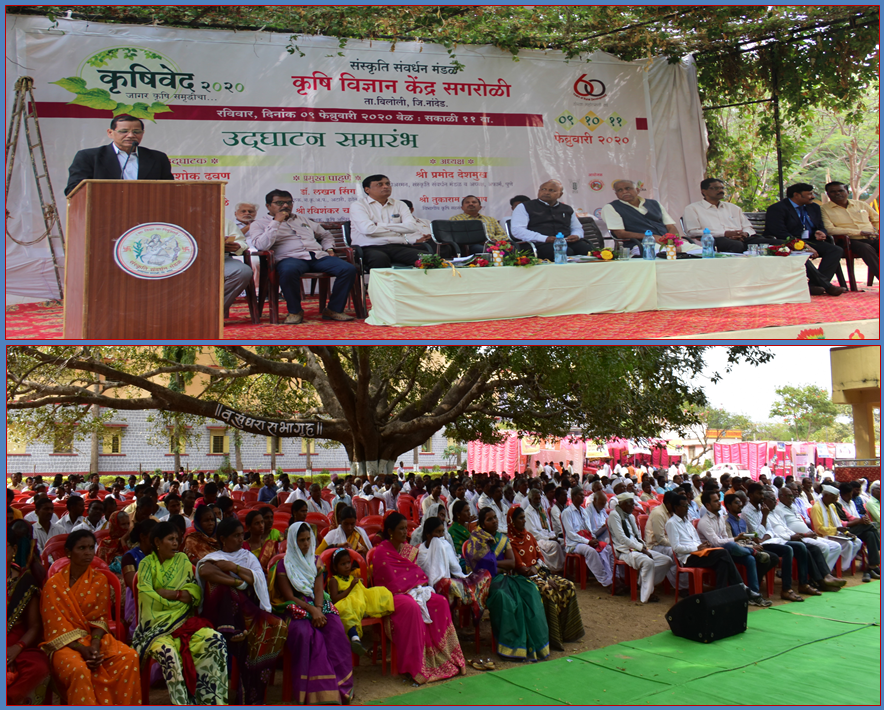 | | | | Innovative Farmers Meet on 'Farmers' Innovations for Prosperous Agriculture' Organized at KVK, Kolhapur, Maharashtra | | The Agricultural Technology Application Research Institute (ATARI), Pune jointly organized three-days "Innovative Farmers Meet-2020 with theme of Farmers' Innovations for Prosperous Agriculture" at Krishi Vigyan Kendra, Kolhapur, Maharashtra during 30th January to 1st February, 2020. In inaugural address, Dr. A.K. Singh, Deputy Director General (Agril Extension), ICAR expressed his concern on safe use of certified inputs for crops, maintaining natural resource and cow based rural economy. His main focus was on use of quality microbial strains and formulation for farming by maintaining the number of beneficial insects. Rural youths should be attracted and retain in agriculture by developing different enterprise based models for regular income in the villages. Integrated farming systems, protected cultivation, high-tech horticulture, processing & value-addition and agro-based enterprises should be promoted for higher profit. There is a need of developing replicable and sustainable models of farming for doubling the farmers' income. Development of aggregation models for farmers on commodity and community based group farming linked with FPOs may make a difference in bringing prosperity. Dr. M.B. Chetti, Vice Chancellor, UAS, Dharwad urged the KVKs to convert more number of farmers' into organic farming and producing quality produce and promotion through market led innovations. He pointed out the loop hole in organic farming and product certification. He focused on development of value chain and biodiversity conservation. Dr. K.P. Vishwanatha, Vice Chancellor, MPKV, Rahuri said that rural youths are the key drivers of Indian agriculture with their increased participation and future prospects in the term of business. He emphasized on doubling the farmers' income with assured market prices of farmers produces. Dr. S. A. Patil, Ex-Director IARI and Ex- Vice Chancellor, UAS, Dharwad said that different institutions for organic farming for popularization among farmers should be developed. Dr. Patil gave more thrust on production of quality seed/planting materials, introduction of more disease/pest resistant varieties, use of hi-tech horticulture for vegetable production, facilitation of marketing structure and value chains development for farmers. Dr. Lakhan Singh, Director, ICAR-ATARI, Pune highlighted the need of different innovations for commercialization and their proper utilization by other farmers. He termed innovative farmers as link between formal and informal education. Dr. Singh emphasized on documenting various innovations for traditional wisdom. He urged the KVKs and farmers to develop more of farming models in respect of our visionary Prime Minister, Shri Narendra Modi Ji for doubling the farmers' income which leads to prosperity. Short video clippings of innovative farmers may be made for their experience sharing. Dr. J.P. Sharma, Joint Director (Agril Extension), IARI, New Delhi emphasized on developing commodity based cluster marketing. He stressed upon the documentation of these successful modules for inspiring and provoking the innovative ideas for other farmers. Adrushya Kadsiddheshwar Swami Ji, Chairman, Shri Siddhagiri-Krishi Vigyan Kendra, Kaneri, Kolhapur briefed the program of innovative farmers' meet-2020 and its fruitfulness for other farmers. Swami Ji urged the farmers to promote their innovations and success stories with KVKs of their district and different social media and documenting the innovative technologies for outreach to other farmers. Dr. Ravindra Kumar, Head, KVK, Kolhapur coordinated the event. | 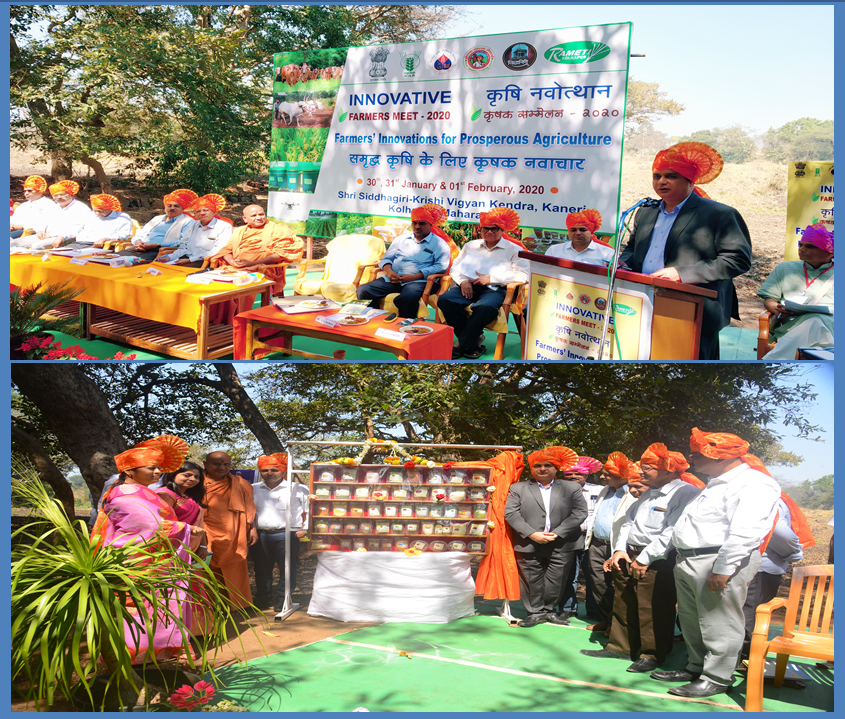 | | | | KRUSHIK 2020- Live Demonstration and Agri-Expo at KVK, Baramati Inaugurated by the Chief Minister, Maharashtra on 16th January 2020 | | Today on 16th January 2020, the 5th edition of KRUSHIK 2020 - Live Demo & Agri Expo was inaugurated by the Chief Minister of Maharashtra Shri Uddhav Thackeray; Shri Sharad Pawar, Member of Parliament (Rajysabha); Shri Ajit Pawar, Deputy Chief Minster, Maharashtra; Shri Dada Bhuse, Agriculture Minister, Maharashtra; Shri Sunil Kedar, Minister of Dairy and Animal Husbandry, Sports and Youth Welfare Maharashtra; Shri Dan Alluf, Counselor, MASHAV, Embassy of Israel; Shri Amir Khan, Actor; Dr. Lakhan Singh, Director, ICAR-ATARI, Pune; Shri U.D. Shirsalkar, Chief General Manager, NABARD; Mrs. Supriya Sule, Member of Parliament (Baramati); and Shri Rajendra Pawar, Chairman, Agricultural Development Trust, Baramati. After inauguration, the dignitaries visited the 110 acre farm of Live Demonstration of various crops, stalls of the exhibitors, Appasaheb Pawar horse competition at animal show. Shri Rajendra Pawar introduced the concept of KRUSHIK 2020. Dr. C.D. Mayee and Shri Suhas Joshi from Drought Action Network (DAN) guided farmers regarding next step of drought action network. Shri Amir Khan explained the theme of Pani Foundation. He told that the next step will be development on soil health, crop planning, reforestation and grass land development. Shri Sharad Pawar, Member of Parliament (Rajysabha) in his speech highlighted the new innovations in KRUSHIK exhibition. He said that innovative techniques must reach to the farmers and government should help the farmers by considering the law. He urged the young farmers to adopt the drip irrigation. Shri Uddhav Thackeray, Chief Minister, Maharashtra Government delighted by seeing the live demonstrations of innovative technologies presented in KRUSHIK Live Demon Agri Expo 2020. He praised the efforts of the Agricultural Development Trust and KVK for such developments on barren land. He highlighted the new things like vertical farming, aeroponic technique in urban area. He cited the example of Chandrapur district farmer who has developed the HMT variety of rice. During the programme DAN website was also launched. On first day, > 25000 farmers visited the KRUSHIK 2020 and taken advantage of this event. The event will be continued till 19th January, 2020. | 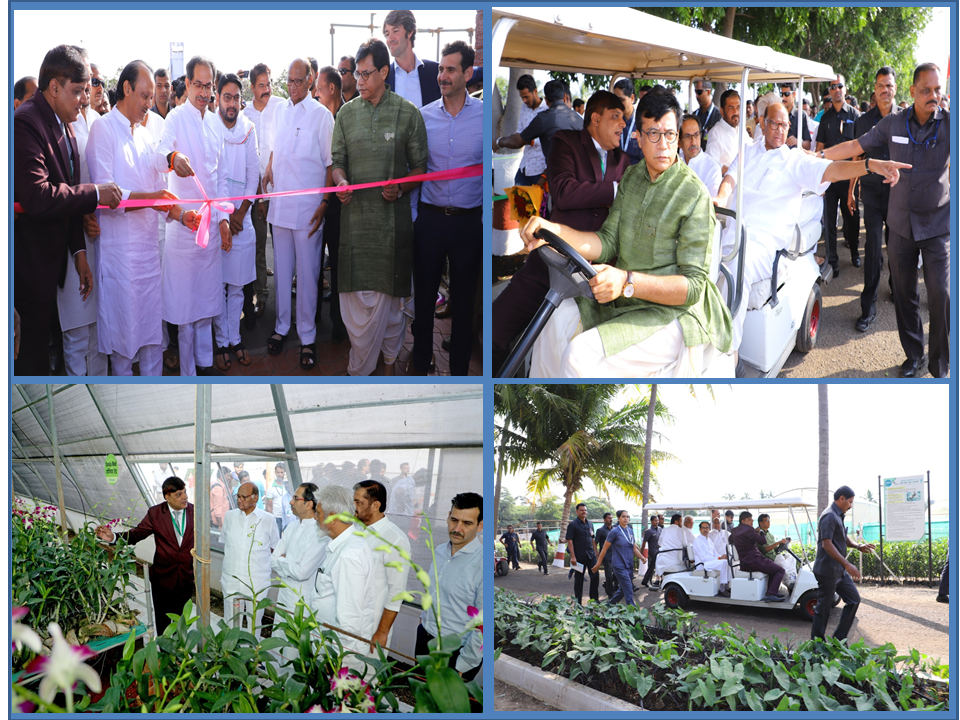 | | | | Global Farmers- Live Demos, Agri Exhibition and Crop Conference Organized at KVK, Narayangaon, Pune from 9-12 January, 2020 | | Global Farmers.-Live Demos, Agriculture Exhibition and Conference was organized at KVK, Narayangaon, Pune during 9-12 January, 2020. In concluding session, Dr. A.K. Singh, Deputy Director General (Agril Extension), ICAR, New Delhi made a comment that the KVK is very vibrant and ideal. His main concern was on extending diagnostics, quality input and advisory services to the farmers. Different models of integrated farming systems, protected cultivation, precision farming, horticulture nursery, processing & value addition and agro-based enterprises should be replicated among farmers for enhancing their income. He urged the farmers to adopt cluster farming with proper planning. He said that technology of low cost wire rope net house should be promoted. He appreciated the effort of converting about 300 tribal women in to bee keeping entrepreneurs. He also visited all the live demonstration units, exhibition and labs, nutrition garden, food processing lab, soil testing lab, bio-products production lab, hydroponics, vegetable production under poly houses, horticulture nursery, slurry making unit, auto-fertigation unit, etc. Earlier in inaugural address, Shri Dilipraoji Valse Patil, Minister of State Excise & Labor, Maharashtra gave focus on latest knowledge and technology sharing. He said that Community Radio Station should be established at the centre for reaching the farmers at grassroots level. Efforts to combat adverse effect of climate change on crop and animal husbandry are needed. Dr. Lakhan Singh, Director, ICAR-ATARI, Pune highlighted the need of attracting and retaining rural youth in agriculture, developing entrepreneurship, farming system nutrition, tapping un-noticed farmers' innovations, showcasing latest crop varieties and models at the KVK. Farmers should be vigilant about incidence of insect-pest on crops, soil health and market avenues. Shri Atul Benke (MLA, Junnar) gave focus on promoting direct marketing to get good price for their produce. His more concern was on problems faced by the farmers about onion and tomato crops. Smt Ashatai Buchke (Member, Zilla Parishad, Pune) emphasized diagnostic services at field level. During Grapes Crop Conference, Dr. S.D. Sawant, Vice Chancellor, BSKKV, Dapoli told that export oriented varieties of grapes should be adopted to compete with international market. He urged the farmers to adopt technologies of grapes production under polythene cover. Dr. R.G. Somkuwar, Director, National Research Centre on Grapes, Pune shared knowledge about export qualities of grapes and bunch management technology during winter season. Mr. Shaikhar Gaikwad, Commissioner of Sugar, Maharashtra addressed farmers about present status and futures prospectus of sugar industries. He told that sugarcane growers will be benefited due to cancellation of gate cane terms. Now farmers have choice to select particular sugar factory or his sugarcane. Dr. Dhananjay Parkale, Additional Commissioner, Dairy & Veterinary, Govt. of Maharashtra illustrated opportunities present in dairy industry. His main concern was on processing industries, center for improved breeds of animals. cluster development for particular breeds. Dr. P. K.Chunneja, Honey Bee Expert, PAU, Ludhiana advocated the farmers about Honey Bee rearing technology and that there is Honey Train coming to Mumbai from Panjab and Rajasthan for export of Honey. Mr. Sharad Nanapure (Expert, Import & Export of Agriculture Commodities) oriented the farmers about procedure of import and export of fruits and vegetables. Production of residue free fruits and vegetables for export purpose is needed. In introductory remarks, Krishiratna Shri Anil Meher, Chairman, Gramonnati Mandal, Narayangaon informed about different demonstration units created at the centre like technology cafeteria, backyard poultry, production & supply of urea briquette, bio-fertilizers, silage making, hydroponics, azolla, protected cultivation, fruit & vegetable nursery, farm mechanization, organic farming, drudgery reduction for farm women, solar system, and sensor based micro irrigation, etc. During farmers fair, Dr. Shivaji Vidhate (District, LDO, ZP Pune); Shri Atul Benke (MLA, Junnar); Shri Dilip Mohite (MLA, Khed); Shri. Ashok Pawar (MLA, Shirur); Dr. Major Singh, Director, DOGR, Pune; Dr. Vijay Mahajan; Shri Anil Bansode (Director, ATMA, Pune); Shri Ravindra Pargaonkar; Shri Prakash Pate; Mr. Gopichand Rawal (Expert of Medicinal Plants); Shri Shivajirao Adhalrao Patil Saheb, Former MP, Shirur Loksabha); Shri Vinaykumar Awate (Superintendent Agriculture Officer, Agriculture Commissionerate, Pune); Mr. Mahadev Gavkar (Expert Honey Bee, Goa); Mr. Sandip Jadhav, CDO; Dr. Vivek Vartak (Fishery Expert); Mr. Mangesh Bhaskar (Expert in Organic Farming); etc. were also present. Shri Prashant Shete, Head, KVK coordinated the event. | 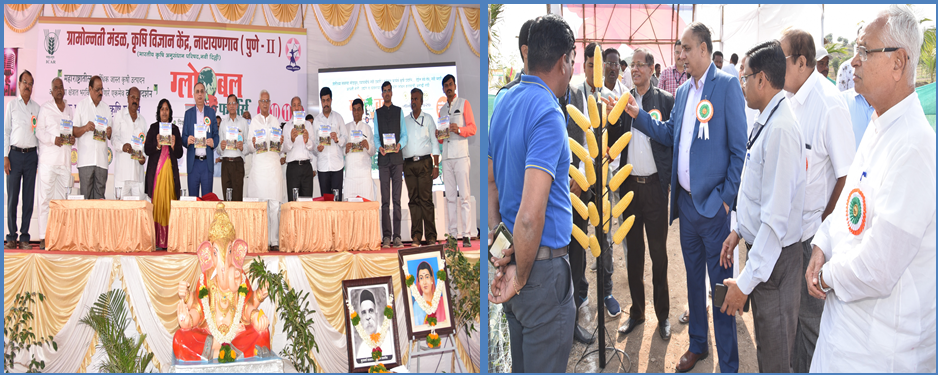 | | | | Attracting and Retaining Youth in Agriculture: Review Workshop Organized by ATARI, Pune on 12.12.2019 | | ICAR- Agricultural Technology Application Research Institute, Pune organized a Review Workshop on Attracting and Retaining Youth in Agriculture (ARYA) for KVKs of Maharashtra and Gujarat at Kolhapur which was inaugurated by Dr. K. Narayan Gowda, Ex-Vice Chancellor, UAS, and Bengaluru on 12.12.2019. In his speech, he focused more on identifying willing rural youths, empowering them to take up various agricultural and allied sector enterprises, orienting towards entrepreneurial skill development for sustainable income and gainful employment. He said that younger generation is not willing to be in agriculture. Farming is not considered profitable. Making farming more profitable, is the major challenge. In rural areas, vacuum of farming should be filled up. Enterprises should be identified as per demand of the locality/villagers, required inputs and market. Value addition, processing and export market provide ample opportunities to the rural youths for their sustainable income. How to market, where to market, when to market? play important role. Organized institutions and market led extension are needed. Relevant organizations should be identified for effective/functional linkage. If a rural youth is earning about Rs 15000/month in rural areas, then he may be retaining in the village. Other additional expenses of stay in the city will be saved. Financial support from other agencies should also be explored for sustenance of enterprise. Dr. Lakhan Singh, Director, ATARI, Pune urged the KVK experts to develop entrepreneurial skill among identified rural youths. They should be vigilant about market demand, visualize calculated risk, choosing right enterprise, building confidence, quality products, etc. for gainful employment. Eleven ARYA centres (Nagpur, Rajkot, Osmanabad, Bhavnagar, Pune, Kheda, Washim, Navsari, Solapur, Anand and Nasik) presented their progress (2019-20) and action plan for the year 2020-21. Major enterprises were fruit and vegetable processing, disease free seedlings production, solar dryer for dehydration, mini oil units for processing of groundnut, herbal jaggery, dairy, goat rearing, value addition in sorghum, custom hiring unit, carp hatchery and poultry, etc. Jackfruit processing and minor millet based enterprises were also suggested. At this occasion, Dr. P.G. Ingole, Dean Agriculture (PDKV, Akola); Dr. Devsarkar, Director Extension Education, VNMKV, Parbhani; Dr. A.K. Gupta, Executive Director (DYPES, Kolhapur); Dr. Ankush Kamble; 11 Heads of KVKs; 55 SMSs/scientists of KVKs, SAUs and ICAR institutes were present. The workshop was coordinated Mr Jayant Jagtap, Head, KVK, Kolhapur-I. | 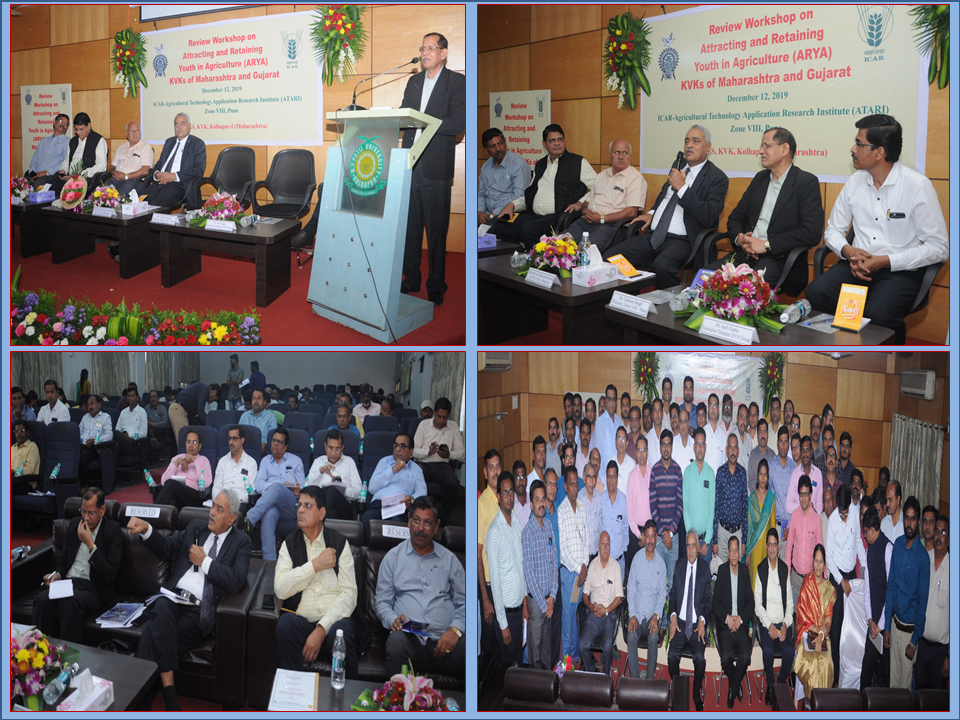 | | State Level Review Workshop Cluster Frontline Demonstrations on Pulses and Oilseeds of 48 Maharashtra KVKs Organized by ICAR-ATARI, Pune during 10-12 December, 2019 | | A three days Workshop-cum-Training on Cluster Front Line Demonstrations on Pulses and Oilseeds for KVKs of Maharashtra was jointly organized by ICAR-ATARI, Pune and KVK, Kolhapur-I during 10-12 December, 2019 at Kolhapur. The Chief Guest, Dr. K.P. Viswanatha, Vice Chancellor, MPKV, Rahuri inaugurated the review workshop on 10.12.2019. In his speech, major focus was given on strategy for enhancing farmers' income, fast technology flow from research organizations to KVKs, offering basket of choices for one farm related problem, creating seed villages and close link with line department officials, etc. Farmers should be vigilant about effect of climate change on agriculture. He urged the KVK experts to promote location specific integrated farming system model involving different components like fishery, water harvesting, poultry, apiary, goat farming, horticulture, etc. He stressed upon use of more bio-fertilizers, bio-pesticides and organic manures for sustainable agriculture. Solid waste management was also focused. He said that impact of cluster demonstrations should be studied and widely communicated. Dr. Lakhan Singh, Director, ICAR-ATARI, Pune highlighted significance of following cluster approach for front line demonstrations on pulses and oilseed. His main emphasis was on identifying potential areas for pulses and oilseed crops, diagnosis of existing problems, developing location specific technology modules, selection of willing farmers, empowering the farmers to organize demonstrations in proper way, training the farmers to record daily observations of crops, regular monitoring of plots by the KVK experts. Effective Field Day must be organized at appropriate time and place where line departments, research institutions, nearby farmers and public representatives may be invited for further large scale technology transfer. Some farmers are obtaining higher productivity as compared to potential yield under BDN-711 and other crops. So the factors responsible for higher yield should be studied. He calls attention of scientists to promote post-harvest processing/value addition/marketing/organizing farmers for augmenting farmers' profit and ensuring nutritional security. Dr. Sanjay D. Patil, Chairman, DY Patil Educational Society, Kolhapur stated about protected cultivation, minimizing adverse effect of climate change and value of organized way of cluster demonstrations. Shri Ruturaj Patil, MLA, Kolhapur appealed the rural youths to come forward for creating own enterprises and developing entrepreneurial skill for regular income. Shri Atul Jain, General Secretary, Deendayal Research Institute, New Delhi delivered a lecture on water and nutrition in cultural practices. His main thrust was on to preserve and document traditional wisdom of farmers. Dr. Anil Markup Gupta, Executive Director, D.Y. Patil Group told about linking medical institute, agricultural research institutes and KVK system for healthy life of the farming community. Dr. D.B. Devsarkar, Director Extension Education, VNMKV, Parbhani; Dr. P.G. Ingole, Dean, PDKV, Akola, Dr. S.R. Shinde, Dr. Girish Chaudhary, Dr. V.T. Jadhav; Dr. Akush Kamble and other experts reviewed the progress of cluster demonstrations and technological backstopping was done. In total 70 participants representing 48 KVKs of Maharashtra, 4 SAUs (MPKV, Rahuri; PDKV, Akola; VNMKV, Parbhani and BSKKV, Dapoli) were participated. The workshop will be continued till 12th December, 2019. Mr Jagtap, Head, KVK, Kolhapur coordinated the programme. |  | | Rabi Kisan Mela and Ex-Trainees Sammelan orgniazed at KVK, Ahmednagar-I on 6 December, 2019 | | Rabi Kisan Mela and Ex-Trainees Sammelan was organized by KVK, Ahmednagar-I on 6th December, 2019. In total 350 farm entrepreneurs and ex-trainees were participated in the program. Agriculture exhibition was also put up and displayed different successful cases and products developed by the entrepreneurs. Dr. Lakhan Singh, Director, Pune inaugurated the Kisan Mela and Agriculture Exhibition. In his address, he gave more focus on doubling farmers' income by adopting latest farm technologies, water harvesting measures, using sensor based technologies, bio-fertilizers, diversifying agriculture, upscaling well tested integrated farming system models, etc. Poultry farming, bee keeping, goat rearing, dairy, floriculture, creating change agents in the villages shall be supportive in obtaining regular income by the farmers. Sericulture, hydroponics, bamboo cultivation and medicinal and aromatic plants will again help the farmers for livelihood security. Many graduate rural youths have come back to farming and started their agri-business. It was possible by organizing agri-business and agri-clinic courses at the KVK. He interacted with the Farmers, Farmers Producer Companies, SHG members and Agripreneurs while visiting the Agri Exhibition. Dr. Shivkumar Patil, GM, NDDB, Rahuri Station declared that a Semen Centre will be started at the KVK campus for availability of high quality semen for the dairy farmers. He also stated that if farmers are ready to provide semen services, they will be given license as well as training. They will be given containers on subsidy basis. Dr. Dattatraya Vane has guided the farmers on intercropping and management practices of rabi chickpea as well as on sugarcane. Mr. Ganesh Antre, Dairy Entrepreneur shared his experiences about dairy farming, loose farming system and fodder management through preparation of silage and hydroponic techniques. Shri Uttamrao Gadekar, a farmer spoke on roof water harvesting and protected cultivation. Ten progressive farmers were awarded for their innovative farming. At this occasion, Dr. M.B. Khetmalas, Director (Agriculture Education), Pravara Rural Education Society, Ahmednagar; Shri Bapusaheb Shinde, Taluka Agriculture Officer, Rahata; Sh Babasaheb Mhaske, Dy. President, Panchayat Samiti, Rahata; Dr. S.D. Nalkar, Head, KVK, Ahmednagar along with other experts were present. | 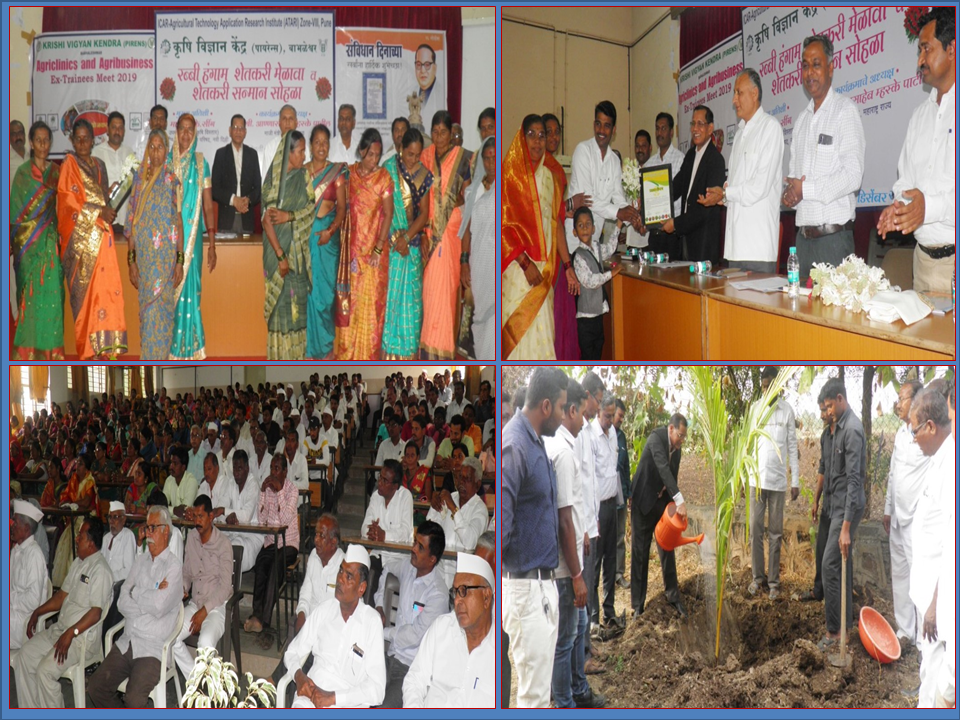 | | Skill Development Training of Master Trainers Organized at KVK, Jalna-I from 5-7 December, 2019 | | A three days Training of Trainers (ToT) programme was organized jointly by ICAR-ATARI, Pune; Agriculture Skill Council of India (ASCI), New Delhi and Krishi Vigyan Kendra, Jalna-I for the trainers of KVKs, SAUs and ICAR Institutes at KVK, Jalna-I during 5-7 December, 2019. In total, 55 trainers were participated representing Maharashtra (35), Gujarat (17) and Goa (3). In his inaugural speech, Dr. Lakhan Singh stated that ToT for skill development is important programme for KVK trainers. He desired to identify needy person for specific enterprise. Master trainers should integrate technical skill with soft skill in their respective job roles. After conducting enterprise based skill development training, follow-up and impact analysis is needed. He urged the master trainers to harness the potential of entrepreneurial skill that will help in creating their own agri-business and enhancing income on sustainable basis. Shri Vijay Borade said that skill training increases credibility of KVKs in farming community. He urged the participants to identify different job roles which are suited to particular area/district. Mrs Sayali, Regional Head and Mr Shyam, Expert from ASCI, New Delhi dealt different soft skill sessions. Dr. S.V. Sonune, Head, KVK, Jalna-I coordinated the program. | 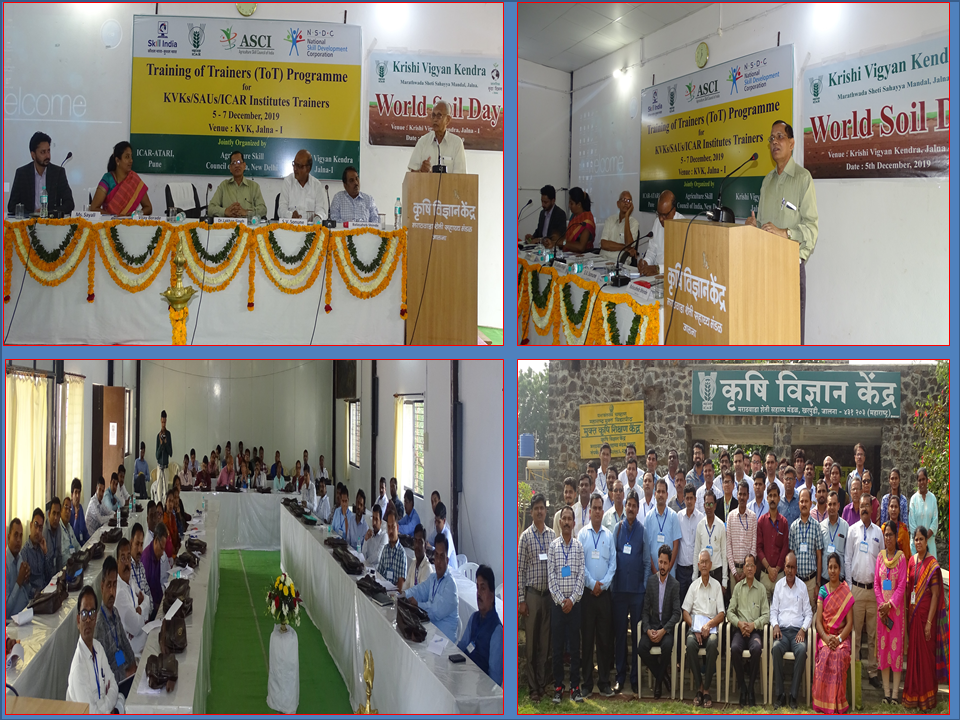 | | Nutri-Cereals Farmers Mela Organized by KVK, Beed-I on 11th November, 2019 | | A Nutri-Cereals Farmers Mela was inaugurated by Dr. Ashok Dhawan, Vice Chancellor, VNMKV, Parbhani on 11th November, 2019. In his inaugural address, he gave more focus on promoting advanced climate smart technologies. He said that coarse grains should be incorporated in existing cropping pattern. Nutri cereals processing and value addition may be promoted among farmers for enhancing their income. He mentioned different varieties of rabi sorghum like Parbhani Moti, Parbhani Super Moti, Parbhani Jyoti, Parbhani Shakti to grow under rainfed situation. Exhibition put up by the farmers' organizations, SHGs and individual entrepreneurs and displayed their products prepared through coarse cereals, was also inaugurated by the chief guest. Dr. Lakhan Singh, Director, ICAR-ATARI, Pune spoke about project 'Nutri-sensitive Agricultural Resources and Innovations (NARI)' being implemented at each KVK for making nutritional security. Interventions on nutrition- sensitive agriculture, family farming, linking agriculture to nutrition, skill development among women and youth, bio-fortification of locally available food, round-the - year dietary pattern, nutri-thali, nutrition smart villages, etc. need to be planned at different levels. Farming system nutrition model, nutrition garden at each household, nutrition garden at each school, quiz competition in schools, display of problem with solutions at common places through wall paintings, hoardings, flexi-banners, wall newspapers, posters and cartoons, etc. should be utilized for wider awareness and orientation of villagers. Shri Atul Jain, General Secretary, Deendayal Research Institute, New Delhi highlighted the importance of coarse cereals in fast changing climatic conditions and rainfall variations. Sorghum, bajra, minor millets have capacity to stand in all adverse conditions. His more emphasis was on recording folk songs related to agriculture, water conservation and learning from farmers. Different experts like Shri Shivaji Jagtap, DSAO, Ahmednagar; Shri Arun Gutte, Extension Agronomist, VNMKV, Parbhani; Dr. Swati Ardhapurkar, Asstt. Professor; Dr. Saurabh Sharma, Head, KVK, Beed and other Subject Matter Specialists delivered lectures on production and protection technologies of nutri-cereals. Relevant extension literature was also distributed among participants. In total, 569 farmers including 85 farm women of different villages were attended the programme. At this occasion, progressive farmers, producers of nutri-cereals viz., Shri Kerba Vharkate and Smt Aprana Yeske were felicitated by the chief guest. | 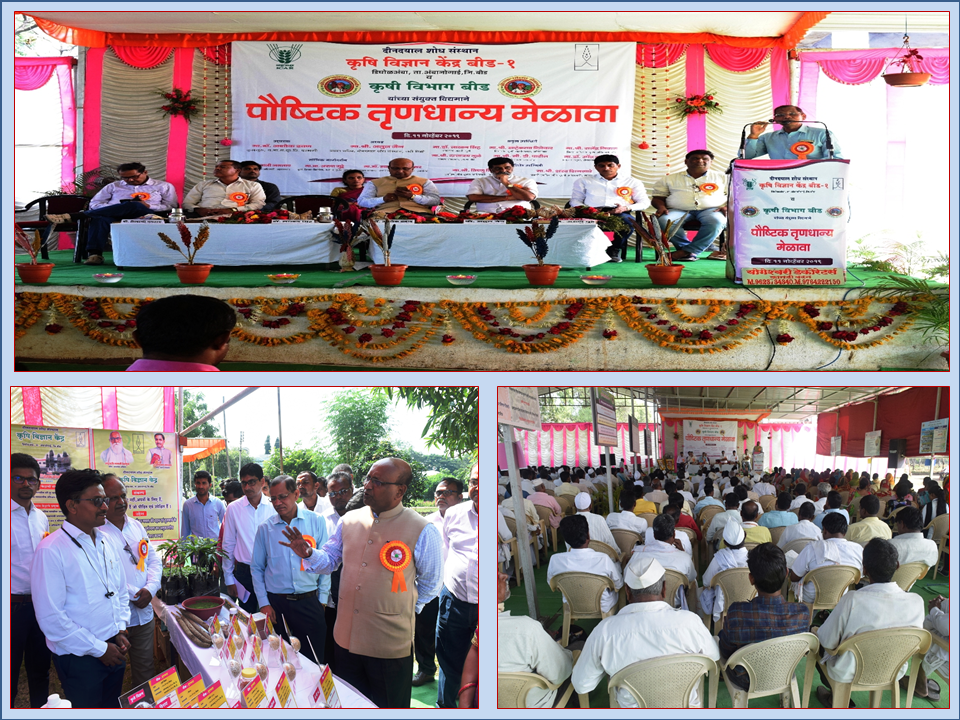 | | Executive Development Programme (EDP) on 'Developing Effective Organizational Leadership for Senior Officers of ICAR': Netherlands, Belgium, Germany and Switzerland | | The visit gave an opportunity to have international exposure and orientation about agricultural research, extension, teaching and agriculture policy. Insight to connect research with practice, research studies on intensification and scaling up of high value crops and protected cultivation in India, farmers-scientist-industry collaboration, building partnership for resource use efficiency, climate smart agriculture, intelligent farming, use of robotics in agriculture and organic agriculture need special attention. Efforts to promote nutrition sensitive agriculture are needed. Integration of all sectors ministries to bring their expertise and practical working experience; horizontal coordination, vertical coordination at different levels of government and societal inclusiveness need focus at national and state levels. | New techniques/knowledge learnt/acquired |
Crop-Livestock interaction needs special attention during technology application. Climate smart livestock farming dealing with choice of animals, feed conversion rate, food/feed competition, resilience towards heat, diseases and flexibility in animal breeds. Rethinking needed of recovery and recycling techniques of manure. Technology application through private agencies including FPOs/FPCs may work with public extension systems. More number of commodities/ components should be focused for doubling famers' income and sustainable agriculture. Dairy and flowers sectors dealt by FPCs/ farmers associations on large scale in European countries. It may also be applied and experimented in India.
| 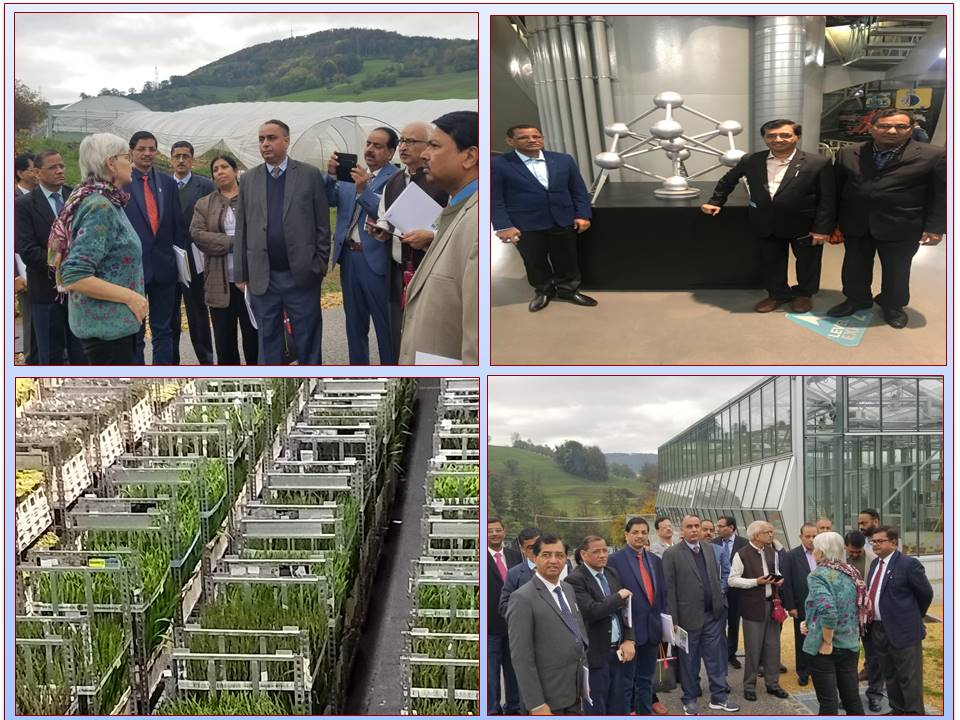 | | Tree Plantation Drive Launched and Kisan Goshti Programme Inaugurated at KVK, Palghar by Shri Parshottam Rupala, Minister of State for Agriculture and Farmers Welfare, Govt. of India on 17.9.2019 | | Tree Plantation Drive was launched by Shri Parshottam Rupala, Minister of State for Agriculture and Farmers Welfare, Govt. of India at KVK, Palghar on 17th September, 2019. Neem plant was planted at the campus by auspicious hands of the minister. He appreciated the efforts of KVK for transforming life of tribal people in the district through capacity building, promoting income generating activities, demonstrating latest farm technologies, poultry, bee keeping and biodiversity conservation. At this occasion, a Kisan Goshthi was also organized. The Minister said that I got golden opportunity to celebrate the birth day of Hon'ble Prime Minister of India in the farming community. He mentioned several flagship programmes launched by the Prime Minister of India for benefiting poor farm families. He gave focus on getting benefit through PM Kisan Mandhan Yojana, PM Kisan Samman Nidhi, Pradhan Mantri Jandhan Yojana, Ujjwala Gas Yojana, PM Krishi Bima Fasal Yojana, etc. He realized that cleanliness drive has changed mindset of all the people for making surroundings and villages neat and clean. He urged all the farmers to adopt different ways and means to double their farm income. Shri Rupala also educated the farmers to plant more multi-purpose trees as they give food, fodder, fuel and more important pure oxygen for our survival. He said that Sapota Research Station should be established in Dahanu (Palghar) in future. Before addressing the farmers, the Minister visited ATIC of KVK, Palghar where latest farm technologies displayed were observed. At this occasion, Shri Paskal Dhanare, MLA, Dahanu; Dr. Gppal Krishna, Director and Vice Chancellor, ICAR- CIFE, Mumbai; Chairman, Shri Vijay Kharpade, Zilla Parishad; Shri Ramadas, Chairman of Panchayat Samiti; Shri K. T. Tarkase, DSAO, Plaghar; Shri P.M. Chandavade, Director, ATMA Palghar and Shri Prabhakar Raut, Zonal Secretary of Gokhale Education Society. In this programme, more that 300 farmers were participated and about 1500 tree plants of different species were distributed among farmers. | 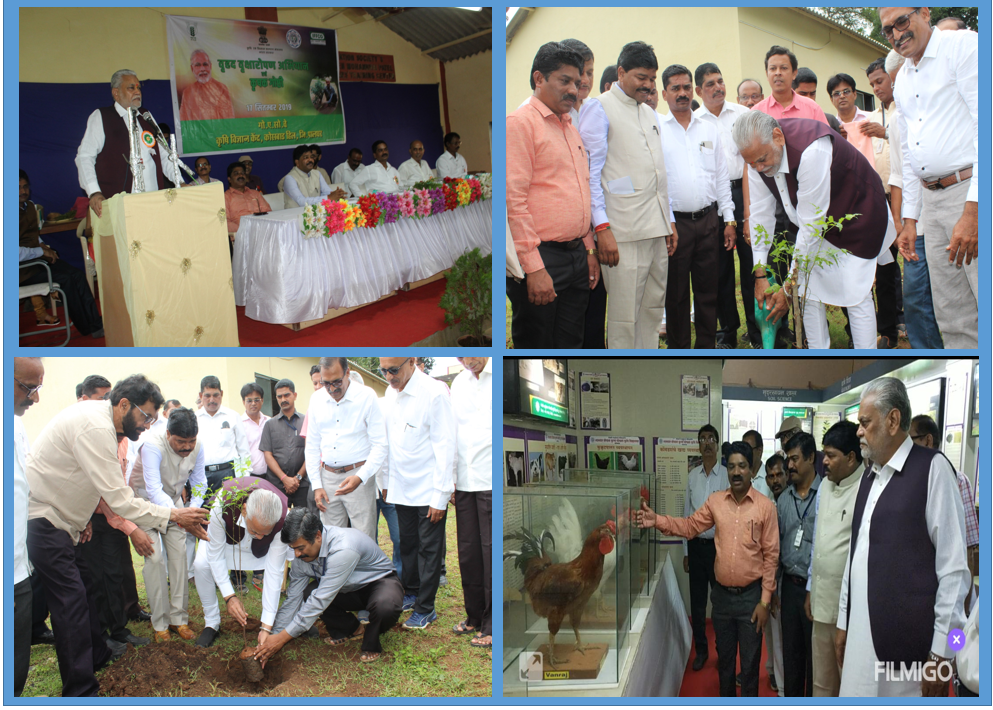 | | ATARI, Pune Organized Interface Meeting on 'Jal Shakti Abhiyan' with ICAR Institutes, SAUs, KVKs and Line Department Officials on 22.8.2019 | | ICAR-Agricultural Technology Application Research Institute (ATARI), Pune in collaboration with the ICAR-Directorate of Onion and Garlic Research (DOGR), Pune organized an Interface Meeting on 'Jal Shakti Abhiyan' at ICAR-DOGR, Pune on 22 August 2019. Dr. Major Singh, Director, DOGR, Pune welcomed all the delegates. In his introductory remarks, he told that many parts of the country are facing the drought as well as flood like situation. He urged to all the participants from different organizations to join hands for developing joint action plan on water conservation and rain water harvesting. Dr. Lakhan Singh, Director, ATARI, Pune briefed about the Jal Shakti Abhiyan to all the participants. He told that the 20 blocks of 8 drought prone districts in Maharashtra have identified for implementation of Jal Shakti Abhiyan and 11 KVKs are given responsibility for creating mass awareness on water conservation activities. Jal Shakti Abhiyan need to be implemented in mission mode with the active participation of KVKs, ICAR institutes, Line departments, NGOs like Paani foundation, NAAM Foundation, etc., he noted. He also obtained information about planning for organizing melas with other innovative events on water conservation on 3rd September and 2nd October, 2019 in their respective areas. Focus on water sharing among farmers - a tradition in dryland villages, innovative practices of rain water management, water budgeting at village level, forming water users associations was given. He stated that 'We can achieve the power of 'Jal Shakti with the power of Jan Shakti' Dr. Indu Sawant, Director, NRCG, Pune raised her concern for ground water level depletion. She gave focus on judicious use of water, using people's knowledge, what to do and what not to do, converging other schemes like Tribal Sub Plan, television program on water conservation, etc. Technologies on water conservation and rain water harvesting need to be compiled. Dr. Jagdish Rane, Director, NIASM, Baramati quoted that everyone knows that water is precious but not saving water. He cited many examples on how to save water like using water saving aerator, water adapter, etc. Ambassadors on water conservation may be identified. Social media and ring tone in mobiles with water saving appeal may be used. Replication of successful cases needs to be upscaled. Dr. K.V. Prasad, Director, DFR, Pune spoke that if you save water, life is saved. Water stressed condition is created by human beings. Natural water resources, recycling of water, protected cultivation, enriching water table related measures should be promoted. On the occasion, Dr. P.G. Ingole, Director Extension Education (VNMKV, Parbhani); Dr. S.R. Gadakh, Director Research (MPKV, Rahuri); Dr. G.K. Mahapatro, Head (IARI-RS, Pune) expressed their views on making effective strategy for convergence of different organizations for successfully implementation of Jal Shakti Abhiyan in identified 20 blocks of 8 districts through 11 KVKs in Maharashtra. Master trainers developed at SAU level will deliver lectures in different events. Heads of 11 KVKs told that 18 kisan melas have already been organized and benefitted > 6500 farmers. Line department officials and Paani Foundation assured to make the Jal Shakti Abhiyan more successful. In this meeting, a total of 70 participants were participated and shared their views. | 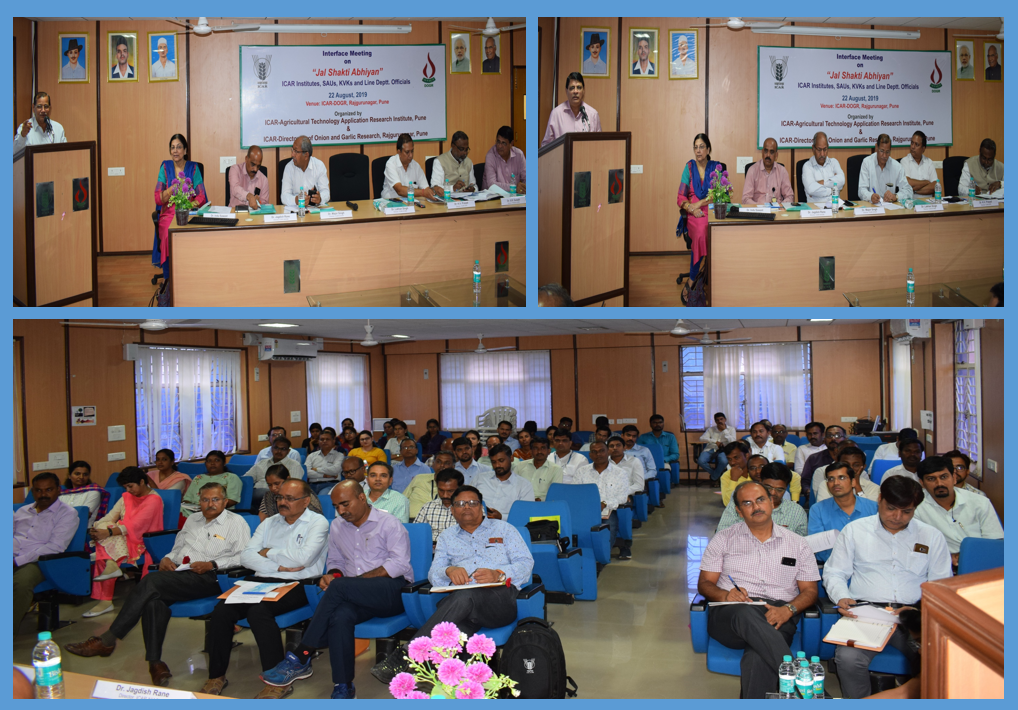 | | ATARI, Pune Organized a 6 Days Training Programme on 'Preparation and Dissemination of Agromet Advisories for SMS (Agromet) and Observers' of 5 States at NRCP, Solapur | | ICAR-ATARI, Pune in collaboration with IMD, Pune started on 19.8.2019, a 6 days training programme on 'Preparation and Dissemination of Agromet Advisories for SMS (Agromet) and Observers' under GKMS at DAMUs in KVKs of Maharashtra, Gujarat, Goa and Karnataka at ICAR- National Research Centre on Pomegranate, Solapur. It will be continued during 19-24 August, 2019. In total, 39 participants attended the programme. As Chief Guest during inaugural function on 19.8.2019, Dr. Jyotsna Sharma, Director, NRCP, Solapur highlighted the importance of agro meteorological advisories to the farmers in general and the horticultural crops in specific. She emphasized importance of dedication and commitment in professional life to all the newly recruited SMS and Observers. Dr. Lakhan Singh, Director, ATARI, Pune urged the newly recruited staff at DAMUs to work whole heartedly and learn operational aspects of different equipments and instruments. He said that an interaction with agencies, SAUs, IMD and look at farm level stress is needed for preparing realistic agro-advisory, reducing input cost, increasing input use efficiency. All such efforts will help in doubling farmers' income. Technical support from IMD is appreciable. Dr. Kripan Ghosh, Head, Agrimet Department, IMD, Pune underlined the need of precise data collection, interpretation, analysis, etc. He gave focus on practical and operation training to the participants through experiential learning. Interactive sessions will be organized by the experts from IMD, Pune. The participants were oriented about operational Agromet Advisory service under GKMS, observatory network of IMD, AWS, Agromet observatory, different observation like Doppler Weather Radar (DWR) satellite Information, their application, access to data, weather forecasting in spatial and temporal scales, use of agromet products, crop information and components of AAS bulletin and its preparation. In addition, dissemination of Agromet Advisories through multimedia channels including SMS and feedback collection was mentioned. Hands on training on the preparation of Agromet Advisories for sowing, irrigation, fertilizer and pesticide application, harvesting using realized and forecast weather will be focused. Advisories for extreme weather situations were also prepared using sample data. The training will be continued till 24.8.2019. At this occasion, Dr. DVS Reddy, Pr. Scientist, ATARI, Bengaluru; Dr. JD Jadhav, Head & Nodal Officer, AMFU, Pune; Shri PS Biju, Scientist E, IMD, Pune; Shri SS Mairal; Smt AB Bandgar from IMD, Pune; Dr. Tambade, Dr. Walkunde and Dr Nilesh Gaikwad were present. | 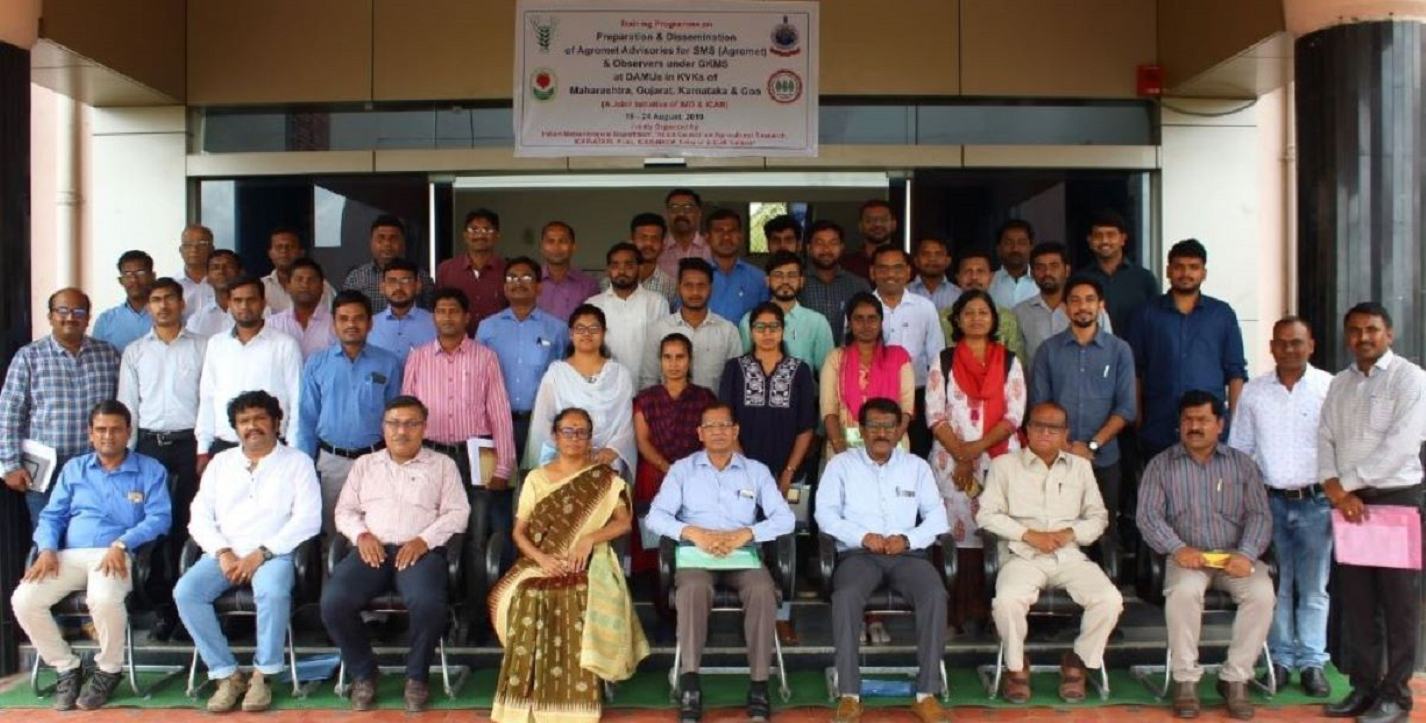 | | Social Startup Madhu Shakti Project Launched for Empowering Rural Women and Making them Economically Independent through Beekeeping on 14 August, 2019 at Pune | | Madhu Shakti - a project focused on empowering rural women through beekeeping was launched on 14th August 2019 at Pune. It is being started by KVK, Narayangaon and Central Beekeeping Research & Training Institute (CBRTI), Pune with financial assistance of Bee Positive and PHD-RDF, New Delhi. In this workshop, one hundred women from rural Maharashtra have begun their journey towards 'Economic Independence'. The beneficiaries of Madhu Shakti were identified through a rigorous process. In April and May, the project team visited women groups in villages like Pimpari Pendhar, Varulwadi, Narayangaon, Kalwadi, Otur, Navalewali, Pondewali, Varude, Javulake and Vithalwadi of district Pune and invited them for a one day workshop at the KVK, Narayangaon. Nearly 300 women attended a sensitization workshop held in June at KVK, Narayangaon. The participants were informed about benefits of beekeeping and taken to the set-up of a commercial beekeeper to show them how beekeeping is done. After the workshop a hundred of these women were enrolled for Madhu Shakti project. They will now be trained through classroom and practical sessions from 19-30 August 2019 at KVK, Narayangaon to convert them as certified beekeepers who can earn an extra income every month by harvesting beehive products. After the training, Bee Positive will provide each woman with beekeeping equipment and 5 commercial beehives. Dr Ashok Dalwai, Chief Executive Officer of National Rainfed Area Authority, New Delhi was the Chief Guest. He launched the initiative by presenting beekeeping kits to the hundred women beneficiaries of Madhu Shakti project. He said that women have good opportunity to start own business with sustainable livelihood. Beekeeping entrepreneurs will get the extra income apart from agriculture. Bee keeping and its value added products through honey is the one of the main component in doubling the farmers' income. The Govt. of India has given focus on creating sweet revolution by adopting apiary. Dr. Lakhan Singh, Director, ICAR-ATARI, Pune highlighted significance of beekeeping. Without honey bees, there will not be any life on the earth. Honey Bee has ethical and professional values. They reflect team work, coordination, division of labour and hard working nature. He cited a case of woman entrepreneur and realised about Rs 3 lakh in a year as net income with 35 bee boxes. He said that at each KVK, bee keeping units will be established. Capacity building, entrepreneurial motivation and awareness about bee keeping among rural youths will be focussed. Dr Lakshmi Rao, Assistant Director, CBRTI, Pune said that 'Rather than focusing on honey, CBRTI will train them to harvest high-value beehive products like Bee Pollen & Royal Jelly which can fetch them much better returns. CBRTI has a special Royal Jelly processing unit which will be used by the women. The founder of Bee Positive, Kanupriya states, "Our dream is that each woman who is trained by Bee Positive will help train another five, thus creating sustainable livelihoods for the poorest of the poor, which would be greatly beneficial to nation building as well." At this occasion, Shri Deep Verma, Director, CBRTI, Pune; Shri Anil Mehar, Chairman, KVK, Narayangaon; Dr. Prashant Shete, Head, KVK, Narayangaon and other scientists were also present. | 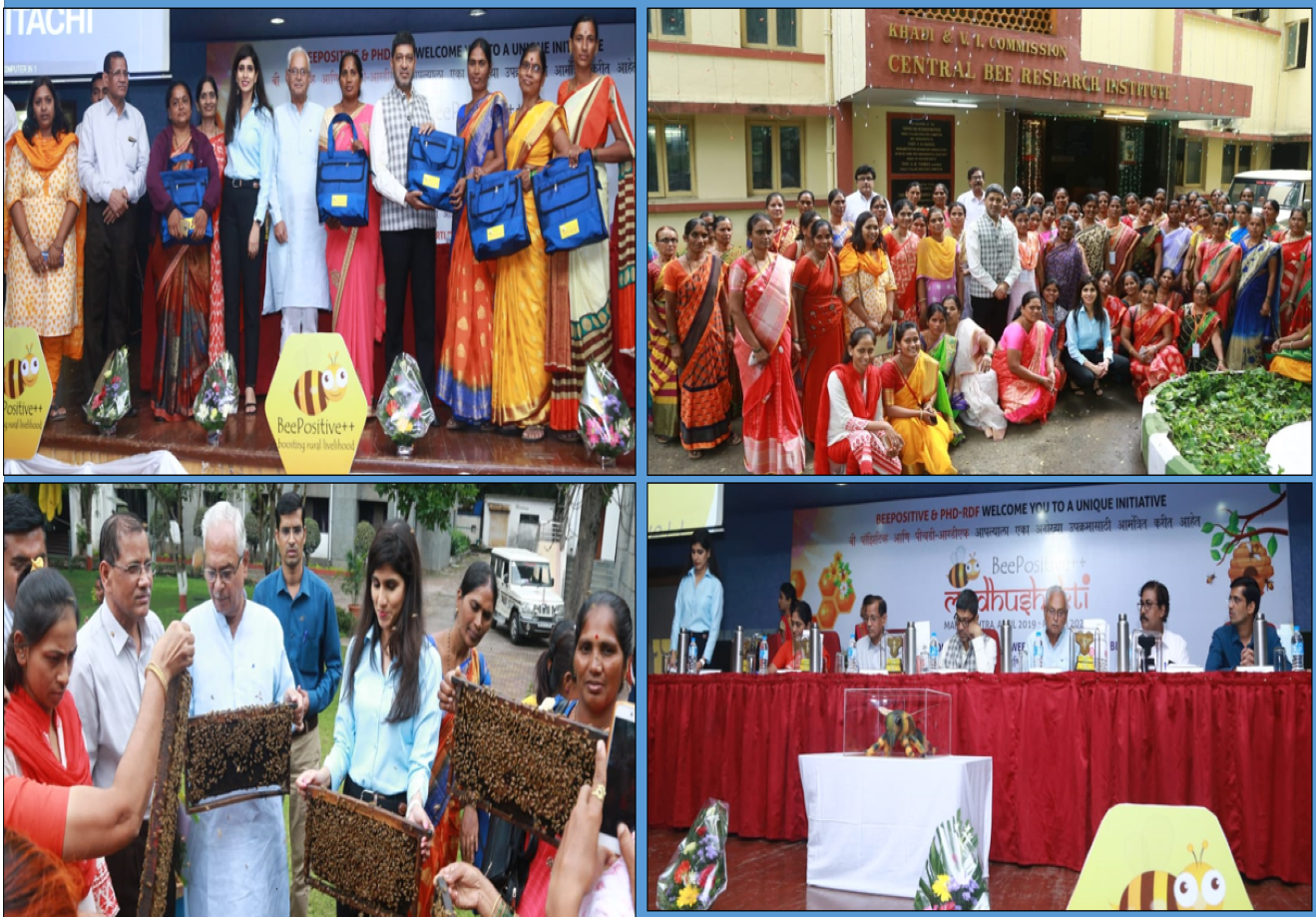 | | Foundation Stone of Administrative Building of ATARI Pune Laid by Dr. Trilochan Mohapatra, Secretary DARE and DG, ICAR on 3rd August, 2019 | | Foundation Stone of Administrative Building of ATARI Pune was laid down by Dr. Trilochan Mohapatra, Director General, ICAR, New Delhi on 3rd August, 2019 in august presence of Dr. A.K. Singh, DDG (Agril Extension), ICAR; Dr. K.P. Viswanatha, Vice Chancellor, MPKV, Rahuri; Dr. K.D. Kokate, Ex-DDG (Agril Extension), Dr. Janakiram, ADG; Dr. Lakhan Singh, Director, ATARI, Pune and other dignitaries. During Interface with ICAR institute Directors, Directors of Extension Education of SAUs, line department officials, KVK heads and innovative farmers, the Director General, ICAR stated that KVKs are attraction of all stakeholders related to agriculture and playing vital role in bridging the gap between Lab to Land by disseminating location specific technologies. KVKs are working in district as single window system for providing necessary input and advisory services to the farmers. He mentioned that there are about 3 lakh Common Service Centres in the country which can be effectively utilized for solving the farmers problems by linking them with KVKs. About 4 crore farmers are connected through various activities organized by 714 KVKs across the country. More than 12 to 15 lakh farmers are trained every year by the KVKs. His main focus was on doubling farmers income through integrated crop management, animal husbandry, fisheries, horticulture, post-harvest management, value addition and creating market avenues. Dr. A. K. Singh, DDG (Agril Extension) mentioned that KVK is a front-line extension system which involves location specific technology assessment for its application on farmers fields. It is now globally identified science-based extension system which has been proved by achieving productivity enhancement especially in pulses. Establishment of ATARI office at Pune will help for effective coordination and monitoring of KVKs in Maharashtra, Gujarat and Goa. He appreciated efforts of Director, ATARI, Pune for outstanding progress of zone within short period of time. Dr. K. P. Viswanatha, Vice Chancellor, MPKV, Rahuri focussed on development and application of location specific IFS modules for doubling farmers income. He mentioned that region wise IFS modules are developed for Vidarbha, Marathwada, Western Maharashtra and Konkan regions by SAUs in Maharashtra. He also emphasized on convergence of activities with line departments by KVKs. Dr. K. D. Kokate, Ex-DDG (Agril Extension) also given his remarks and expressed his satisfaction for starting ICAR-ATARI in Pune. Dr. Lakhan Singh, Director, ATARI, Pune in his introductory remarks briefed about important achievements of the zone. He shared about initiatives taken on innovative monitoring mechanism and extension methodologies for overseeing the KVKs. The publication of first issue of ATARI Pune News was also released by dignitaries at this occasion. At this occasion, Dr. K.V. Prasad, Director, DFR; Dr. N.P. Singh, Ex-Director, NIASM, Baramati; Dr. Indu Sawant, Director, NRCG; Dr. Major Singh, Director, DOGR; Dr. Chandregowda, Director, ATARI, Bengaluru; Dr. Jagdish Rane, Director, NIASM; Directors of Extension Education of SAUs; Director, ATMA; Director Horticulture; Dean Agriculture; Professors; Scientists; line department officials; KVK heads; innovative farmers were present. |  | | Annual Zonal Workshop of KVKs of Maharashtra, Gujarat and Goa Organized by ATARI, Pune from 14-16 June 2019 | | Annual Zonal Workshop of KVKs was organized by ICAR-ATARI, Pune at ICAR-CCARI, Goa during 14-16 June, 2019. In this program, 79 KVKs of Maharashtra (47), Gujarat (30) and Goa (2) participated and presented their progress for the year 2018-19. Directors/Professors of Extension Education of 8 SAUs shared their initiatives on innovative monitoring mechanism and extension methodologies for overseeing the KVKs in their area jurisdiction. Dr. M.J. Chandre Gowda, Director, ATARI, Bengaluru emphasized the importance of review & action plan exercise in the context of cross-learning and experience-sharing. Achievements over the years should be looked for major impact points and the intervention-specific benchmark should be the basis for interpretation. Action plan should be realistic, focusing on interventions that are problem-solving and must also maintain continuity on the impacts already initiated. Dr. Lakhan Singh, Director, ATARI, Pune appreciated the initiative of Inter-zonal Review cum Action Plan workshop. He stressed the importance of planning, involvement of researchers in FFP activities, on-site input management, institution building, ground reality and holistic view.Planning at community level as well as village level must be an inclusive exercise wherein focus on landless, marginal and women are given equal attention. In valedictory session, Dr. A.K. Singh, DDG (Agril Extension), ICAR, New Delhi said that KVK is working asOne Stop Shop for solving problfarmers' ems through real time agro-advisory in different forms. There is need to understand the concept of doubling farmers' income and developing 2-3 villages by each KVK as model for enhancing farmers' real income through enterprise based interventions.Entire village should be linked with grassroots village institutions forsustenance of regular income generation. KVK should take firm step to create or facilitate technologically the FPO/FPC for resource sharing and good marketing. He focused on to create own system of communication in the villages. Commodity based social media groups may be created and increased in more numbers. One IFS model at each KVK must be developed and status of interaction and resource channelization should be ascertained. New farmers should be added and linked to the KVK and nutri-rich and bio-fortified crops/varieties should be promoted. Farmer wise data base should be created over the years. Frontiers of extension methodology and opportunities were discussed in length by Dr. P. Das, Ex-DDG (Agril Extension), ICAR, New Delhi. KVK needs to focus on technology testing, technology adaptation and technology integration. Institutional arrangement is required for scaling up and scaling out of best practices. Use of decision support system, agro-ecosystem analysis, major approaches to analyze vulnerability, learn how to learn, etc. were dealt. Process documentation and context in writing case study need to be focused. Dr Ashok Patel, Vice Chancellor, SDAU, S.K. Nagar; Dr. K.P. Vishwanatha, Vice Chancellor, MPKV, Rahuri; Dr. S.D. Sawant, Vice Chancellor, BSKKV, Dapoli and Dr. V.P. Chahal, ADG (Agril Extension), ICAR; Dr. Lakhan Singh, Director, ATARI, Pune and Dr. E.B. Chakurkar, Director, CCARI, Goa inaugurated the annual zonal workshop on 14th June, 2019. They stated that KVKs are meant to identify and disseminate agricultural technologies. Retaining youth in agriculture can be possible by creating on-farm and non-farm employment opportunities. Mentor KVKs may be useful for empowering other KVKs and farmers and appealed to attach some KVKs to them. Brief account of achievements was presented by Dr. Lakhan Singh, Director, ICAR-ATARI, Pune. He highlighted different cases and IFS models for following by different category of farmers towards attaining regular real farm income. In his welcome address, Dr. E.B. Chakurkar, Director, ICAR-CCARI, Goa focused on diversified enterprises for higher profit. Shri Madhav Kelkar, Director Agriculture (Govt. of Goa) urged the KVKs to work on value chain management. Shri H.R.C. Prabhu, Head, KVK, North Goa coordinated the program. | 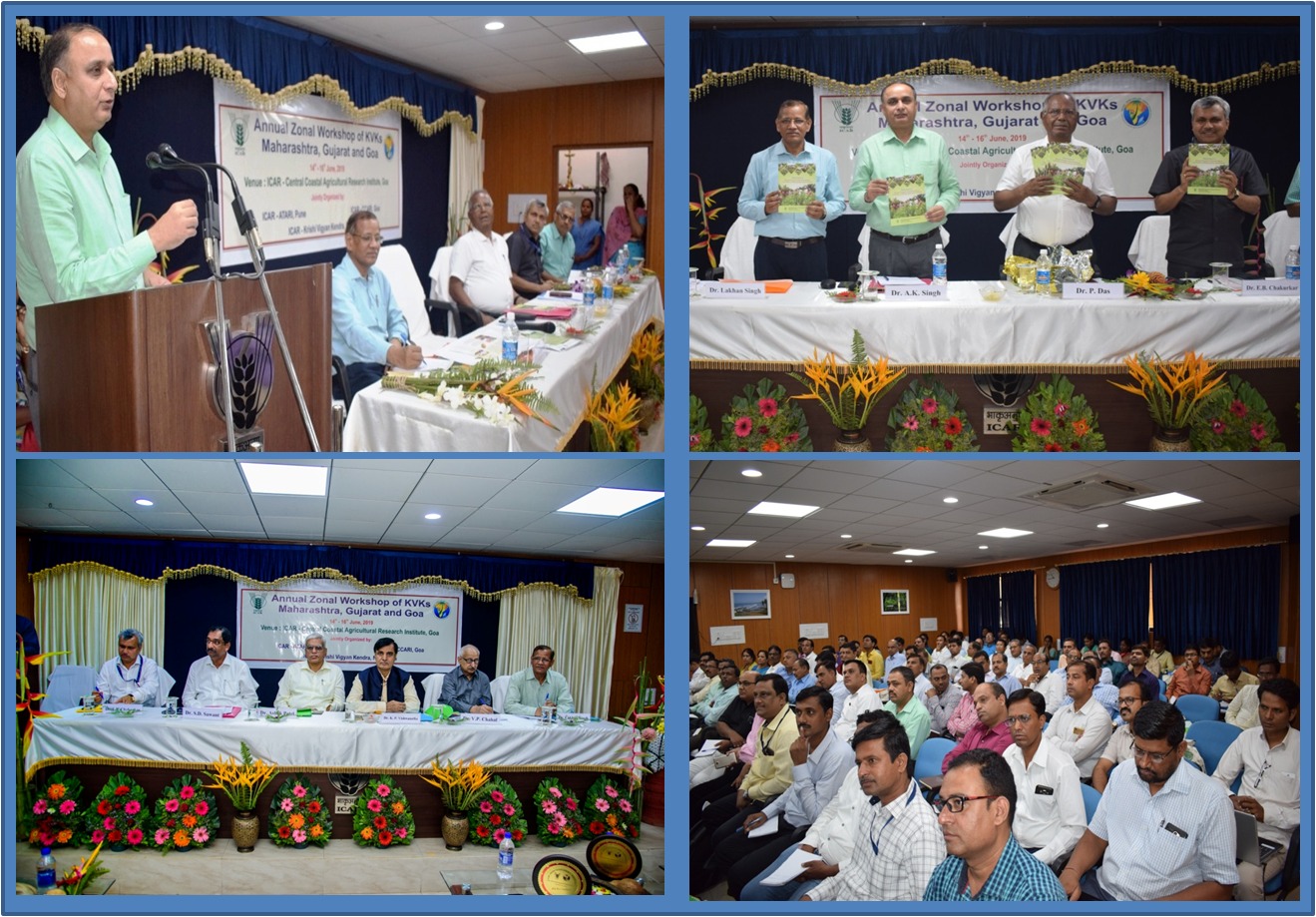 | | Inter-Zonal Review cum Action Plan Workshop of Farmer FIRST Programme organized 9th May, 2019 | | The ICAR-Agricultural Technology Application Research Institute, Bengaluru organized the Review cum Action Plan Workshop of Farmer FIRST Programmeof Zone XI, Bengaluru & Zone VIII, Pune on 9th May, 2019. Inter-zonal review cum action plan workshop of Farmer FIRST Programmewas the first of its kind. Dr. M.J. Chandre Gowda, Director, ATARI, Bengaluru emphasized the importance of review & action plan exercise in the context of cross-learning and experience-sharing. Achievements over the years should be looked for major impact points and the intervention-specific benchmark should be the basis for interpretation. Action plan should be realistic, focusing on interventions that are problem-solving and must also maintain continuity on the impacts already initiated. Dr. Lakhan Singh, Director, ATARI, Pune appreciated the initiative of Inter-zonal Review cum Action Plan workshop. He stressed the importance of planning, involvement of researchers in FFP activities, on-site input management, institution building, ground reality and holistic view.Planning at community level as well as village level must be an inclusive exercise wherein focus on landless, marginal and women are given equal attention. Three ICAR institutes from Zone XI viz. CPCRI, Kasargod, IIHR, Bengaluru and NIANP, Bengaluru, and three SAUs from Zone VIII viz. MPKV, Rahuri, NAU, Navsariand JAU, Junagadh presented the progress of Farmer FIRST programme for the year 2018-19 and action plan for the year 2019-20. The publications brought by FFP MPKV, Rahuri were released. The scientistsfrom ATARI Bengaluruand KVK Bengaluru Rural were also present during the occasion. | 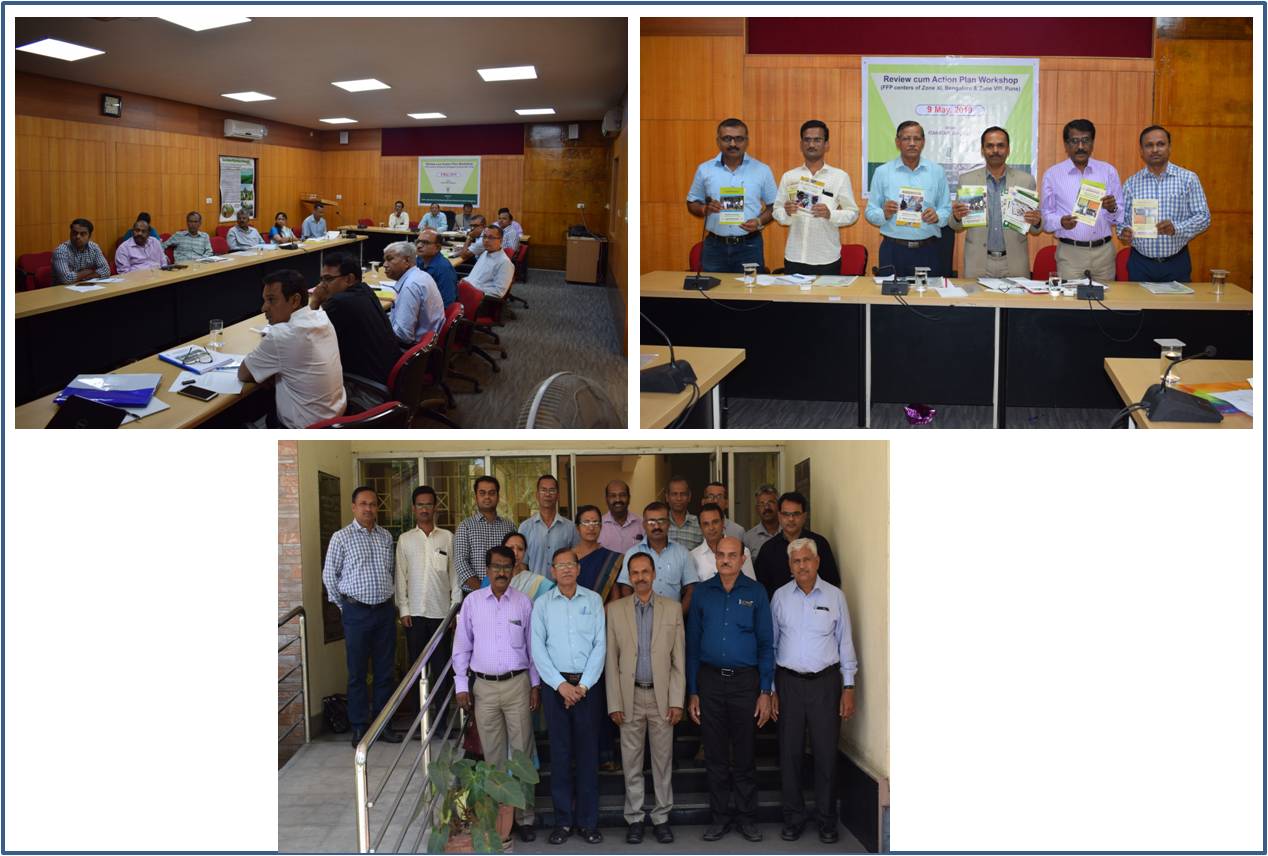 | | ATARI, Pune Organized State Level Annual Action Plan Workshop on KVKs of Maharashtra and Goa during 15-16 March, 2019 | | Two days State Level Annual Action Plan Workshop of KVKs of Maharashtra and Goa was organized at KVK, Baramati during 15-16 March, 2019. In this workshop, Heads of 49 KVKs (47 KVKs from Maharashtra and 2 KVKs of Goa) presented their annual action work plan for the year 2019-20. In total, 75 participants attended the event. In inaugural address, Shri Rajendra Pawar, Chairman, Agricultural Development Trust, Baramati said that farmers face many problems and they deal with new ideas. Grape and other fruit growers are actively engaged in local need based research which replicate further. He urged the participants to develop activities on effective use of water and resource conservation for sustainable livelihood of farmers. KVKs need to come together for using social and electronic media in agriculture towards betterment of farming community. Based on existing agro-ecosystem, technology gap, farm related problems, different categories of farmers; the annual plan should be developed, as advised by Dr Lakhan Singh, Director, ATARI, Pune. KVKs should include best technologies of the ICAR institutes and SAUs in their interventions. Conducting on-farm trials for solving major problems of many farmers in defined area is the major strength of the KVK. Common on farm trials were designed to solve the serious but common problems in 4-5 districts for bringing quick alternative solutions. Mechanism of developing annual action plan through discussion/brainstorming at different platforms like scientific advisory committee meeting at district level involving different stakeholders; university level workshop involving technology experts and finally at state level workshop involving all heads of KVKs, Directors of Extension Education and ATARI scientists was appreciated. Dr. K.D. Kokate, Ex-DDG (Agril Extension), ICAR and Director Extension Education, MPKV, Rahuri appreciated the KVK model and suggested to bring out quality publications based on ground work being done in frontline extension. Performance indicators should be kept in mind by the KVKs to work upon further. Nutri-sensitive interventions should be planned in certain packets/area. Commodity based organizations, using innovative farmers as resource persons, reaching to un-reached farmers through different ways, impact studies, etc. were also suggested by Dr. P.G. Ingole, Director Extension Education, VNMKV, Parbhani and Dr. D.M. Mankar, PDKVK, Akola. Shri S.K. Joshi, Business Manager, ICAR-DKMA, New Delhi delivered a talk on use of e-resources and social media by all the KVK experts for faster technology transfer among farmers and other stakeholders. Five KVKs viz., Baramati, Solapur-I, Jalna-I, Yavatmal-II and South Goa were given best presentation certificate for developing appropriate work plan. Dr. Syed Shakir Ali and Dr. D.V. Kolekar coordinated the workshop. Major Recommendations: Agro-ecosystem analysis, problem-cause analysis, technology gap analysis and soil and water testing should be done before developing action plan in the district. It will help the KVK experts to develop need based interventions. The OFT is designed for solving major problem of the area by providing best alternative solutions after experimentation at field level. Under each trial, observations on relevant parameters in addition to yield and economics should be recorded. Under On Farm Trials, at least 3 treatments including farmers practice should be included. Participating farmers should also be trained to maintain the record of relevant observations and data. In case of animal science, it was suggested to assess at least two breeds in addition to farmers practice. Functional demonstration units should be developed and maintained for educating the farmers and extension workers. Instructional farm of the KVK should reflect different models including IFS for doubling farmers income. The farm should be maintained scientifically and its output per unit area should be reflected under reporting. Work plan for instructional farm and demonstration units should also be included in action plan. KVKs are advised to include latest technologies of the ICAR institutes and SAUs under frontline demonstrations and on farm trials. Source of technology with year of releasing should be reported under OFTs/FLDs. The KVK should not restrict only to include the technologies of only one SAU its area jurisdiction where that is working. The KVK should go beyond limit/boundary for technology testing. Advance planning for arranging inputs/seeds of latest varieties is needed at KVK level. Concerned research institutes/SAUs/input agencies should be contacted well in advance and pursued to obtain desired quality seed of latest variety/input for frontline extension. Number of training courses should be increased specially in respect of skill development and value addition. KVK expert should have Daily Diary for maintaining minute records about each on farm trial and frontline demonstration, which will help in drawing inferences and correlating with results. Crop diversification, enterprise diversification and varietal diversification may be initiated with focus on post harvest processing and value addition. Focus on nutri-sensitive agriculture should be given and at least one village may be adopted by each KVK to demonstrate and popularize such interventions in the area. If some KVKs are having externally funded projects then they should mention in action plan and progress report of the KVK. Before taking any externally funded project, prior approval of the ICARATARI, Pune should be taken. Most successful technologies adopted on large scale in the district should be identified for their impact assessment. Technical feedback about latest technology should be communicated to the concerned institute/SAU for further refinement or research work. Its record should also be maintained. Database on different activities, awardees-farmers and innovative farmers should be developed at KVK level. Activities performed by each KVK, should be uploaded on KVK Portal on regular basis. All KVKs should organize their SAC meetings before end of December of each year. Letter of invitation to the SAC members should be sent well in advance with agenda of meeting. Successful cases/success stories should be developed. Small video clippings of high quality on successful enterprise/commodity/entrepreneur/innovative farmer should be developed. Such documentations should be sent to the ICAR-ATARI, Pune. Quality publications based on the ground work under frontline extension should be brought out at KVK level and ATARI level. |  | | Livelihood Security through NICRA Project in Pune, Maharashtra-ZMC Team Reviewed | | Zonal Monitoring Committee under chairmanship of Dr. M.C. Varshney, former Vice Chancellor, Anand Agricultural University, Anand and Kamdhenu University, Gandhinagar along with Dr. Lakhan Singh, Director, ICAR-ATARI, Pune; Dr. Milind Ahire, MPKV, Rahuri; Dr. Jagdish Rane, Head, School of Drought Stress Management, ICAR-NIASM, Baramati; and Dr. K. Sreenivas Reddy, ICAR-CRIDA, Hyderabad and Dr. Syed Shakir Ali, Head, KVK, Baramati monitored the climate resilient interventions in Baramati, Pune on 9 March, 2019. During review, Jalgaon KP, Jalagaon Supe and Karhati villages in taluka Baramati were visited.
Disilting of 8.5 km of water stream in six check dams in Jalgaon KP was done by the KVK in convergence mode and this increased the water table through tube wells in vicinity to the extent of 2-3 meter. It has brought 40 ha land nearby under cultivation.
Shri Kumar Shivaji Kalane a farmer had 10 acre of land in which he followed Integrated Farming System model as advised by the NICRA team. He had shadenet house in 2 acre where he raised capsicum which was purchased by local traders from farm itself. It is giving him economic return of Rs 20 lakh/year. He had pomegranate orchard (0.6 ha) and marvel grass. He also had goat herds and poultry with 7000 broiler birds. For loose housing dairy farm with 4 cows, he was using maize silage for feeding cattle. Dairy component was giving him an income Rs 15000 per month. He has created employment opportunity to 8 persons for 6 months.
In Jalgaon Supe, a Farmer Producer Company (FPC) was created by the farmers in year 2015 where Govt. has given subsidy of Rs 12 lakh and they invested about Rs 5.5 lakh. NICRA team guided them in forming the FPC. They have machines for cleaning, grading and packing for seeds and grains. A newly started FPC earned a profit of Rs 36000 this year.
Now all families are taking a dairy as supportive business. There is no green fodder in the village, but they are making the silage of maize for their cattle. The team saw the silage in every house of the village. Loose housing dairy farm practice is up-scaled by 70 farmers in the NICRA villages. Farmers are earning Rs. 60-70 thousand annually by maintaining 20 goats and 50 vanaraja poultry birds.
Custom hiring centre in Jalgaon KP was performing well. Seed drill was very much in demand. Six farmers had purchased their own seed drills. Tractor powered chaff cutter was demand more. The custom hiring centre has bank balance of Rs 1.20 lakh.
The team also visited different units of KVK Baramati and interacted with Mrs. Sunanda Pawar, Trustee, Agricultural Development Trust, Baramati and other KVK experts. |  | | State Level Annual Action Plan Workshop of KVKs in Gujarat | | ICAR-Agricultural Technology Application Research Institute (ATARI), Pune organized a two days Annual Action Plan Workshop of KVKs in Gujarat at Navsari Agricultural University, Navsari during 1-2 March, 2019. In this program, 38 Senior Scientists and Heads representing 30 KVKs of Gujarat participated and presented their action plan for the year 2019-20. In inaugural address, Dr. C.J. Dangaria, Vice Chancellor, NAU, Navsari said that success of the KVK depends on perfect and need based planning. He applauded the efforts of KVKs for frontline extension and creating more visibility in their concerned districts. He advised the KVK experts to identify the technological gap before designing different interventions. His more concern was on reducing cost of cultivation, organizing farmers, adopting latest technologies for enhancing farmers income.
Dr. Lakhan Singh, Director, ICAR-ATARI, Pune gave thrust to include farm technologies developed by the ICAR institutes/SAUs under on-farm trials and frontline demonstrations. More focus was given on problem solving approach through designing on-farm trials, understanding farmers perspectives, frontline demonstrations in cluster mode, farm family and agro-ecology based planning, enterprise based skill development, crop diversification, varietal diversification, climate resilient technologies, nutri-sensitive agriculture, case studies and personalised agro-advisory for increasing farmers profit. Duplication of efforts through convergence with other organizations should be avoided. Workable demonstration units and instructional farm should be maintained and used for educating the farmers and extension workers.
Dr. G.R. Patel, Director Extension Education; Dr. S.R. Chaudhary, Director Research (NAU, Navsari); Dr. K.A. Thakkar, Director Extension Education (SDAU, SK Nagar); Dr. D.V. Kolekar and different Professors and Heads of Departments gave their valuable suggestions for developing realistic action plan of KVKs. |  | | Master Trainers Program for Developing Entrepreneurship. | | ICAR-ATARI, Pune organized a 4 days Master Trainers Programme for Developing Entrepreneurship at KVK Narayangaon (Pune-II), Maharashtra from 27-30 January, 2019. In total, 25 Subject Matter Specialists (Agril Extension) from different KVKs of Maharashtra and Gujarat were attended the program. Innovative training methods were used by specially trained Entrepreneurial Motivation Experts to make the training lively and interesting. Simulation games, group exercises and experiential interactive lecturettes were used. KVK SMSs in Agricultural Extension had reinforced their motivation training skills through practice session and feedback.
All the SMSs have experienced great change in their outlook towards training rural youths in helping to help themselves to become entrepreneurs by imbibing entrepreneurial spirit and motivation to enhance their farm income. Dr. Lakhan Singh, Director, ICAR-ATARI, Pune and Dr. D.U.M. Rao, Principal Scientist, ICAR-IARI, New Delhi acted as entrepreneurial motivation trainers. |  | | Training Program on Developing Entrepreneurship in Floriculture Concluded on 25 January, 2019 | | A training program for Developing Entrepreneurship in Floriculture was organized at KVK, Baramati under the auspices of ICAR-ATARI and ICAR-DFR, Pune from 23-25 January, 2019. In total, 25 trainees from Maharashtra and Gujarat attended the program, out of which 11 were Subject Matter Specialists (SMS) of KVKs and 14 were floriculture entrepreneurs.
In the training course, innovative training methods and simulation games were used. Entrepreneurial motivation of trainees was enhanced through experiential learning based group work. Microlab was used to facilitate sharing thoughts and feelings. Ring toss and tower building exercises were played for understanding target setting behaviour, achievement need, hope of success, fear of failure, managing feelings, perception of blocks, help, concentration and focus on achievement goal, etc. were conducted.
Lectures through slideshows were presented by scientists of ICAR-DFR on challenges, opportunities and cultivation of flowers including rose, tuberose, chrysanthemum, marigold. Participants were sensitized on entrepreneurial opportunities like ornamental plants, vertical gardening, tissue culture, media, dry flower industry, different options for growing potted plants, etc. Floriculture Entrepreneurs and SMS could identity through group discussion the qualities of successful floriculture entrepreneurs, requirements and reason for success and or failure in floriculture enterprises.
Trainees presented cost-benefit economics of three floriculture enterprises- i) Commercial marigold production, ii) Rose water production, and iii) Protected cultivation of rose.
Dr. Lakhan Singh, Director, ICAR-ATARI, Pune; Dr. K.V. Prasad, Director, ICAR-DFR, Pune; Dr. DUM Rao, Principal Scientist, ICAR-IARI, New Delhi; Dr. Jagdish Rane, ICAR-NIASM, Baramati; Dr. P. Naveen Kumar, Dr. DVS Raju, Dr. Syed Shakir Ali, Dr. Prashant Kawar, Dr. Tarak Nath Saha, Dr. Ganesh Kadam, Dr. Saffina and Dr. Shilpashree contributed on knowledge enrichment of floriculture entrepreneurs and KVK experts. Shri Vivek Bhoite, SMS, KVK, Baramati coordinated the program. |  | | ICRISAT Director General Inaugurated KRUSHIK 2019- Live Demonstration and Agri. Expo at KVK, Baramati on 17th January 2019 | | KRUSHIK 2019- Live Demonstration and Agri. Expo was inaugurated at KVK, Baramati on 17th January 2019 in august presence of Dr. Peter S Carberry, Director General, ICRISAT, Hyderabad; Shri Burzis Taraporewala, Tata Trust, Mumbai; Shri Sharad Pawar, Ex- Union Agriculture Minister & Member of Parliament (Rajyasabha); Mrs. Supriya Sule, Member of Parliament (Loksabha; Dr. M. Ariz Ahammed, Managing Director National Horticulture Board, Gurugram; Shri Arun Vidhale, Commissioner of Fisheries Maharashtra; Shri U.D. Shirsalkar, Chief General Manager, NABARD; Dr. Lakhan Singh, Director, ICAR-ATARI, Pune; Shri Rajendra Pawar, Chairman, Agricultural Development Trust, Baramati & other dignitaries.
Huge live demonstrations of all the technologies related to agriculture and allied enterprises were organized at KVK instructional farm. Unique attraction of the expo was the live demonstration of crops, innovative technologies, agri inputs, farm equipment, etc. spread over a sprawling KVK farm of 110 acre. An exhibition hangar was being erected to host stalls of 136 international & national companies and 114 companies participated in the event by showing their technologies in the form of live demonstration, machinery and equipment demonstrations, seminar, video shows, animal show, etc. In addition to these 107 stalls of allied government departments, Farmer Producer Organizations (FPOs), Agriculture Universities, Research Stations & other Research Institutes participated in the event and showcased their technologies.
Dignitaries has visited to demonstration plots on vegetables, cereal crops, pulses, fruits crop demo, apiculture unit, fishery unit, center of excellence for vegetable, dairy unit, poultry unit, silage unit, animal exhibition.
The Fish Feed Mil was being inaugurated by Dr. Arun Vidhale, Commissioner of Fisheries, Maharashtra and Mrs. Supriya Sule, MP in presence of other dignitaries. District Level Agricultural Exhibition was also inaugurated by Dr. Ariz Ahmmed, Managing Director, National Horticulture Board, Gurugram; Shri Zende, Joint Director of Agriculture, Pune and other dignitaries.
In Appasaheb Pawar Auditorium, Shri Peter Carberry stated that majority of farming in India is dry land and in KRUSHIK Agri Expo all the majority dry land technologies are shown. All the dry land technologies of ICRISAT have been included in Agri Expo. He also stated that next year he will arrange the visit of poor farmers from African countries in KRUSHIK to show the activities conducted at KVK instructional farm. Mr. Burzis Taraporewala guided farmers regarding social activities conducted by Tata Trust in agriculture. Mrs Supriya Sule insisted on use of technologies about global climate change and markets.
Shri Sharad Pawar, former Union Agriculture Minister and MP (Rajya Sabha) said that ADTs KVK Baramati showcase the latest technologies in the world in agriculture each year in KRUSHIK Agro Expo which has benefitted to thousands of farmers. ICRISAT has done tremendous work in agriculture throughout the world. He appreciated the work done by KVK Baramati in field of trainings, demonstrations, processing, centre of excellence for vegetables and dairy, etc. Total 1564 farmers, company representatives and government officials participated in this inauguration the programme. Live Demonstration and Agri. Expo will remain open from 17-20 January, 2019. |  | | Global Farmers-Live Demos, Agriculture Exhibition & Conference was inaugurated by Shri Pasha Patel at KVK-Narayangaon, Pune. | | Global Farmers.-Live Demos, Agriculture Exhibition and Conference was inaugurated by Shri Pasha Patel, Chairman, State Commission for Agricultural Costs and Prices, Maharashtra on 3rd January, 2019 at KVK, Narayangaon, Pune. His main concern was on climate change effect on crops productivity. He said that Government is developing new scheme for potato, onion and tomato growers. All Indian Ambassadors in different countries have been informed to explore export opportunities for Indian Agriculture Produce. The Agriculture Export will be increased from 30 million dollars to 100 million dollars. Prevailing crop insurance policy of block level will be considered at group level for benefitting the farmers. Major concern of Shri Sharad Sonawane (MLA, Junnar) on promoting direct marketing by farmer to consumer, it will be helpful to farmers for getting good price to their produce. Mr. Sachindra Pratap Singh, Commissioner of Agriculture, Govt. of Maharashtra said the KVK has shown good example of convergence and developed a model KVK for effective capacity building and technology dissemination. Technologies to overcome the problems created due to climate change, need to be developed. He appreciated the facility of micro nutrients soil testing lab, food processing and value addition, nutrition garden, auto-fertigation system, live demonstrations on different crops for benefitting farmers. Dr. Lakhan Singh, Director, ICAR-ATARI, Pune highlighted the need of attracting and retaining rural youth in agriculture, developing entrepreneurship, farming system nutrition, tapping un-noticed farmers innovations, showcasing latest crop varieties and models at the KVK. Farmers should be vigilant about incidence of insect-pest on crops, soil health and market avenues. In introductory remarks, Krishiratna Shri Anil Meher, Chairman, Gramonnati Mandal, Narayangaon informed about different demonstration units created at the centre like technology cafeteria, backyard poultry, production & supply of urea briquette, bio-fertilizers, silage making, hydroponics, azolla, protected cultivation, fruit & vegetable nursery, farm mechanization, organic farming, drudgery reduction for farm women, etc. About 6000 farmers and other extension officials visited 190 exhibition stalls on different aspects put up by KVK, Dept. of Agriculture, ATMA, NHB, NABARD, RCF Ltd. FPOs, ICAR institutes, etc. It will be continued for four days (3-6 January, 2019). | | |  | | Celebration of Kisan Diwas jointly by ICAR-DFR, NRCG and ATARI Pune | | Date and Place:23 December, 2018 | | Kisan Diwas was celebrated jointly by ICAR-DFR, NRCG and ATARI Pune. Innovative farmers were invited and listened their experiences of success. Mrs Swati Shinghade, Sh Nand Kishore, Sh Samir Dombe, Sh Prakash Navale, Nana- rose breeder, etc. shared their views on innovatiness and cleanliness drive. Dr SD Sawant, Director NRCG, Dr KV Prasad, Director DFR, Dr Lakhan Singh, Director ATARI, Dr Sandeep Panwar, PMFAI spoke about contribution of former PM Ch. Charan Singh, role of farmers in sustainable agriculture and solid waste management. Farmers were also falicitated. Dr Naveen, Dr Indu Sawant, Dr Raju, Dr Safeena, Dr Kadam, Dr Tarak facilitated the event. |  | | 30 KVKs of Gujarat Reviewed for Cluster Frontline Demonstrations on Oilseed and Pulses. | | Date and Place:7-9 December, 2018, KVK, Bhavnagar (Gujrat) | | ICAR-ATARI, Pune and KVK, Bhavnagar jointly organized a 3 days state level review workshop-cum-training on "Cluster Front Line Demonstrations on Pulses and Oilseeds " for 30 KVKs of Gujarat| Dr. Randhir Singh, ADG (Agril Extension), ICAR, New Delhi in his inaugural address, focused on status of oilseeds and pulses production, problems in increasing the production, value addition & processing, pest scenario, export scenario, etc. He also discussed about the innovative marketing strategies, residue management, effective utilization of technologies to tackle adverse effect of climate change, developing success stories, demonstrating technologies effectively supported with action photographs Action plan of ARYA project for attracting and retaining youth in agriculture at 11 centres (6 KVKs in Maharashtra and 5 in Gujarat) was also reviewed. Right type of enterprise for right type of youth needs to be identified considering its area specific demand and market. In advance, baseline survey, social and economic indicators for all enterprises need to be planned. Dr. Lakhan Singh, Director, ICAR-ATARI, Pune urged the KVK experts to maintain the visibility of the KVK in the district, understanding concept of frontline extension, recording observations on yield, insect pest incidence, reasons of lowest and highest yield, post-harvest management of the farm produce, recording climate sensitive data and use of resource conservation technologies. He gave thrust on linking cluster frontline demonstration program with nutrition sensitive agriculture. His main focus was on using latest technologies of ICAR institutes and SAUs under frontline demonstrations.Dr. K.A. Thakkar, Director Extension Education, SDAU, SK Nagar highlighted the need of effective monitoring mechanism for effective technology application. For technological backstopping, Dr. R.A. Jat, Dr. Harish from ICAR-DGR, Junagadh; Dr. Pithia and Dr. Dobariya experts from Junagadh Agril University delivered lectures on latest pulses and oilseed technologies. At this occasion, Shri Prashant Bhai Bhatt and Shri Ram Chandra Bhai Bhatt, Trustees of Lokbharti Gramvidyapeeth, Bhavnagar; Dr. D.V. Kolekar were present.The workshop was attended by 60 heads, scientists and SMSs of 36 Krishi Vigyan Kendras of Gujarat and Maharashtra. The head, KVK, Bhavnagar coordinated the program. | |  | | DDG (Agril Extension) Inaugurated the Administrative Building of KVK,Panchmahal and Farmers Gosthi on IFS for Doubling Farmers Income | | Date and Place: 3 December, 2018 KVK, Panchmahal | | Dr. A.K. Singh, DDG (Agril Extension), ICAR, New Delhi inaugurated the administrative building of KVK, Panchmahal on 3.12.2018. At this occasion a Kisan Gosthi on Integrated Farming System for Doubling Farmers Income was also organized. In his speech, he said a strong network of 703 KVKs across the country is built up for frontline extension and faster technology application. His more focus was on capacity building of rural youths, quality seed and planting materials production, nutritional garden, enterprise based trainings, treating farming as a business, developing IFS model on 2 acre area including bee keeping, fishery, arid-fruits, and vegetables for sustainable livelihood security. He said that seed should be produced as per demand of the farmers and market in the district. Post harvest processing and value addition was another avenue to double the farmers income. Fruit plants and varieties suitable for dry land area like Goma Yashi (Bael), Goma Priyanka (Jamun), Goma Prateek (Tamarind), Thar Priya (Chironji), Thar Bold (Lasoda), etc. may make farming more profitable| Dr. Lakhan Singh, Director, ICAR-ATARI, Pune gave emphasis on attracting rural youth in agriculture by developing their capacity on entrepreurship, area based enterprises, organizing small farmers for farming, resources sharing and marketing. Latest technologies of ICAR institutes and SAUs should be identified, experimented and demonstrated at farmers fields. KVK must showcase the most suitable technologies at the centre for educating the farmers and extension workers. Convergence of KVK with other agencies may make a difference in technology transfer. Dr. P.L. Saroj, Director, ICAR-CIAH, Bikaner advised the farmers to adopt the multiple cropping systems in place of mono-cropping. He said a proper combination of crops/fruits is needed. Pomegranate and marigold is good combination to reduce the nematode incidence. Aonla and Bael rearing together is good for reducing adverse effect of frost. Shri Rajkumar, Manager (Training), Agriculture Skill Council of India, New Delhi briefed about outline of the training. Certified trainers are to be developed. Participants came from KVKs, ICAR institutes and SAU are domain experts. Operational part is to be dealt. Portal management, platform specific training, trainer qualification pack, soft skill aspects will be covered. At this occasion, Dr. Sanjay Singh, Head- Research Centre CHES-CIAH, Godhra, Dr. Kanaka Lata, Head-KVK, Scientists of the CHES and KVK, Vejalpur, officers of line departments of the district Panchmahal including All India Radio (AIR) Godhra and 117 farmers were present. | |  | |
| Home  Privacy policy Privacy policy  Disclaimer Disclaimer  Linking Policy Linking Policy  Contact Us Contact Us  Feedback Feedback | | | 2018 www.ataripune.icar.gov.in, All right reserved. | | | ICAR-Agricultural Technology Application Research Institute College of Agriculture Campus, Shivajinagar, Pune-411005. | Visitors No:  |




